Introductory
Hermeneutics of Sword Over the Gown
___________
"They
would walk together over to Convocation Hall just as pilgrims walk El Camino
de Santiago. The effect was the same. Instead of having the Shrine of
Saint James above a cathedral altar, Sewanee had the Sword Over the Gown hanging
in Convocation. My husband would come home with the latest discoveries
revealed to them through its symbolism. He once told me that Mr. Lytle,
Sewanee's
great Agrarian mentor and iconic sage, when giving voice to the real sentiment,
had
sparked a revelation's insistence that the portrait should be read like
a religious text, because finding and experiencing its many messages and
meanings
is akin
to practicing the skill of Christian hermeneutics. They agreed that it
should be discussed in those terms, because it serves Sewanee's remnant
Gentiles
as a choice vessel of grace."
-Luella Josephine Taylor, in THE LAST CHRISTIAN
IN ALABAMA, draft manuscript
___________
"For of the soule the bodie forme doth take;
For soule is forme, and doth the bodie make."
-Edmund Spenser (1552-1599), "A Hymn in Honour of Beauty"
___________
"We
soon become aware that all our assertions reflect our interpretation
of the phenomena of existence, and that this interpretation
is expressed through certain ultimate conceptions. The most basic
of these are, in the language of philosophy, being, cause,
and
relationship; but we need to translate these terms into language
more suited to our purpose. Accordingly, in our everyday
assertions we say that a thing exists as a member of a class, or
that
it is the known cause of a certain effect or the known effect
of a certain cause, or that it has points of resemblance with
some
other thing."
-Richard
M. Weaver, RHETORIC
AND COMPOSITION HANDBOOK,
1957, 1967, 1974
___________
"That majesty which through thy work doth reign
Draws the devout, deterring the profane.
And things divine thou treat'st of in such state
As them preserves, and thee, inviolate."
-Andrew Marvell, "On Mr.Milton's Paradise
Lost," 1674
___________
-
-
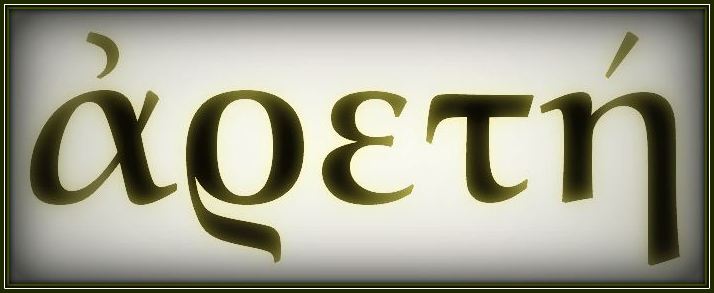
__________
"Goodness brightly visible insults the vanity
of evil darkness and enrages cruel hatred against
true justice."
-SIR ABDIEL
___________
______
BOOK ·
LETTER ·
SWORD
______
From Dr. Johnson's
A DICTIONARY OF THE ENGLISH LANGUAGE, 1755:
___________
"There is something in true
beauty which the vulgar cannot admire."
-Congreve, quoted by F.W. Ruckstull
in GREAT WORKS OF ART, 1925
___________
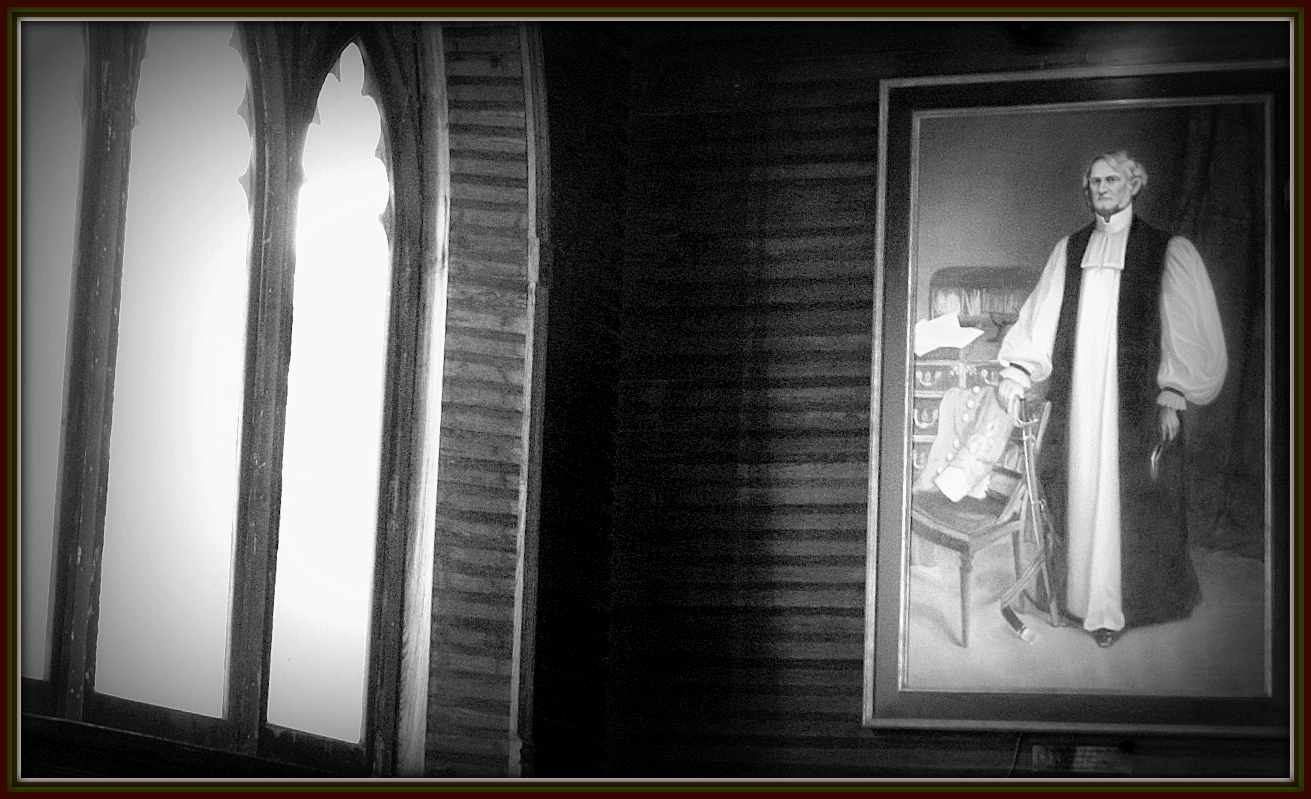
2003 Reproduced "Sword Over the Gown,"
Convocation Hall
|
___________
"We need more- and it is out there, if a teacher
will show us where to look for it. In the annals of
history, the works of the great authors, the debates
of the philosophers, and the lives of the saints we
find stories of men and women like ourselves faced
with the shock of the new, the temptations urged on
us by our fallen nature, the pressures of public opinion,
and the puzzling demands of adulthood. But studying
the lives and works of those who have gone before
us, we form our very selves. As [Dr. Louise] Cowan
writes, 'To remake oneself in the image of something
that calls to greatness demands a heroic tradition
displaying heroic models.' "
-John Zmirak, "How (and Why) to Use This Guide,"
ALL AMERICAN COLLEGES: Top Schools for Conservatives,
Old-Fashioned Liberals, and People of Faith,
2006
_____
Mary Morrison, Editor in Chief, "Convocation
opens Easter Semester 2014,"
at http://thesewaneepurple.org, February 3, 2014:
[Dr. Louise] Cowan, a critic of southern literature,
especially of the Fugitive Poets and the Southern
Agrarians, was introduced as “the last direct
heir to the Fugitive’s legacy.” She studied
under and befriended Donald Davidson, a founding member
of the Fugitives, during her graduate studies. Sewanee
also has a close relationship with both the Fugitives
and Agrarians, through Andrew Lytle and Allen Tate,
both of whom edited The Sewanee Review.
Though she is in her 90s, Cowan delivered a thought
provoking and insightful speech, questioning what
it means for Sewanee to be the University of the South,
including what it means for the “the South”
to be a cultural and geographic region. She insisted
that “the identity of an institution itself
should be unwavering,” adding that it is the
duty of a university to preserve and promote the best
parts of society. She stressed what she believes to
be a Southern emphasis on texture, and warned against
modernity’s sacrifice of texture for efficiency.
Cowan lauded Sewanee’s attention to poetry as
one of the South’s many textural traditions,
and argued for the continuation of poetic respect
and reverence in education. Ultimately,she concluded
that Sewanee should sustain the noble destiny of America’s
scholars.
___
|
"Recall
your courage; banish gloomy fears.
Some day perhaps the memory of these things
Shall yield delight. Through various accidents,
Through many a strait of fortune, we are bound
For Latium, where our fates point out to us
A quiet resting place. There it's decreed
Troy's kingdom shall rise again. Be firm,
And keep your hearts in hope of brighter days."
-Aeneas, in Virgil's AENEID, Book
I, Lines 257-264, 26-19 B.C.; English blank
verse translation by Christopher Pearse Cranch,
1872 |
_____
"And he shall turn the heart of
the fathers to the children, and the heart of the
children to their fathers, lest I come and smite the
earth with a curse."
-Malachi 4:6, King James Version
____
What we call the beginning is often the
end
And to make and end is to make a beginning.
The end is where we start from. And every phrase
And sentence that is right (where every word is at
home,
Taking its place to support the others,
The word neither diffident nor ostentatious,
An easy commerce of the old and the new,
The common word exact without vulgarity,
The formal word precise but not pedantic,
The complete consort dancing together)
Every phrase and every sentence is an end and a beginning,
Every poem an epitaph.
-T.S. Eliot, "Little Gidding,"
1942 |
___________
From THE LAST CHRISTIAN IN
ALABAMA, draft manuscript:
Sword Over the Gown is Sewanee's most historic, culturally
significant, and locally beloved portrait. It was painted
in 1900 by Eliphalet F. Andrews, unveiled in Louisville, Kentucky,
in May of that year, and then was stored nearby in Covington
until the 1920s.
Thanks to the efforts of an Episcopal priest of the old Christian
church, it was in Sewanee by circa 1927, when it arrived at
the the School of Theology. It hung proudly in St. Luke's
until the building renovation of the late 1950s. After
the renovation was called complete, the Episcopalians of the
new church abandoned it to the dank basement in hopes it would
rot away and be forgotten.
Responding to an irresistible inner call, a professor at the
College, who was born into an leading family from Natchez,
Mississippi, of course, rescued the relic from further decay
by hanging it in Convocation Hall in the early 1960s. It eventually
earned placement put on the southeastern wall next to the
grand fireplace.
During the 1998 Festival of Lessons and Carols, extremist
vandals who adhere to a sick and twisted ideology attacked
an unguarded Convocation Hall, and the portrait was removed
for presumed restoration and repair. It was further damaged
when steam pipes burst in Convocation's storage basement.
For far too long, some got away with saying, "We don't
know if we can restore it or need to replace it."
Saying, "We don't know," was code for something
for else.
Following the perfectly timed Charleston Annunciation of 2002,
the unnecessary and grievous delay came to a wonderful ending
when the the reproduction copy by Nashville artist Connie
Erickson was finally unveiled at the conclusion of the epochal
Polk Family reunion's Holy Communion service on June 1, 2003.
That proud recovery of our greatest inheritance opened the
first day of Sewanee's Epoch of Restoration.
The portrait is named Sword Over the Gown in homage
to the answer given by Bishop Polk when asked in Richmond
if he was putting off the gown of an Episcopal bishop to take
up the sword of a Confederate general, to which he replied,
"No, Sir, I am buckling the sword over the gown,"
signifying his positive defense of our Southern homeland as
his holy and priestly duty.
___________

"What place, Achates, and what
land on earth Is not replete with the stories of our
woes?"
-Aeneas in Virgil's AENEID, Book I, Lines
599-600, 26-19 B.C.; English blank verse translation
by Christopher Pearse Cranch, 1872 |
-
___________
-
"Leonidas
Polk's combining his religious and patriotic duties is well
remembered and honored in Sewanee, Tennessee. At his University,
the stained glass windows in the Chapel depict his general's
sword together with his bishop's crozier. The 'Sword Over
the Gown' portrait hangs in the lecture hall depicts his sword
and his bishop's robes- a portrait that is synonymous with
the University of the South."
-Fred Brown, "Sewanee: Founded on Faith,"
Civil War Courier, Volume 21, Issue 1, January 2006
___________
Emily Dickinson's "Province of
the Saved":
The Province of the Saved
Should be the Art- To Save-
Through Skill obtained in Themselves-
The Science of the Grave
No Man can understand
But He that hath endured
The Dissolution- in Himself-
That Man- be qualified
To qualify Despair To Those who failing new-
Mistake Defeat for Death- Each time-
Till acclimated- to-
___________
|
"Finally,
brethren, whatsoever things are true, whatsoever
things are honest, whatsoever things are
just, whatsoever things are pure, whatsoever
things are lovely, whatsoever things are
of good report; if there be any virtue,
and if there be any praise, think on these
things."
-Paul's epistle to the Philippians,
4:8, KING JAMES VERSION OF THE HOLY
BIBLE, 1611
______
New Orleans, 1980:
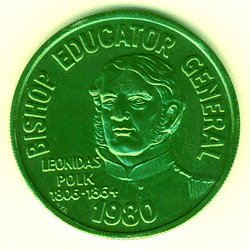
BISHOP
·
EDUCATOR ·
GENERAL
LEONIDAS POLK
1806 - 1864
_____
"Accept it, recognize the natural power
in the man, as men did in the past, and
give it homage, then there is a great joy,
an uplifting, and a potency passes from
the powerful to the less powerful. There
is a stream of power. And in this, men have
their best collective being, now and forever.
Recognize the flame of power, or glory,
and a corresponding flame springs up in
yourself. Give homage and allegiance to
a hero, and you become heroic. It is the
law of men."
-D.H. Lawrence, APOCALYPSE,
1931
_____
"Being the particular Southerners you
both are, of good breeding and well-born
status, you've no doubt heard the saying
that 'blood tells'? It was derived from
Don Marquis, who said, 'Blood will tell,
but often it tells too much.'
"Up on the Domain, we could see deeper
and better than that. Blood does tell, but
for us, it told just enough."
-Louella Josephine Taylor, in THE LAST
CHRISTIAN IN ALABAMA, draft manuscript
______
"Following the death of his mother,
young Dandridge comes trudging two hundred
miles to Uplands, where old Major Lightfoot,
after inspecting his countenance, owns the
tie of blood by saying, 'Come in sir, come
in: you are at home.' "
-In Richard Weaver's
THE SOUTHERN TRADITION AT BAY, 1968,
1989; quotation from THE BATTLE-GROUND
by Ellen Glasgow, 1902
_____
"Whenever the power of God is made
manifest, a division always occurs, because
there are those who like it and those who
do not like it at all."
-Father John Roddy, St. Hilda's
of Whitby Anglo-Catholic Church, Second
Sunday after Epiphany sermon, June 16, 2011,
quoting the late Archbishop John Thayer
Cahoun
_____
"The foundation of revolutionary internationalism
is a hatred of distinction and, among the
idealists at least, a terrifying dream of
human solidarity in which all differences
of race and nation, religion and philosophy,
tradition, culture, and class are replaced
by a free-flowing snake dance of nondiscriminating
'individuals.' It is the dream celebrated
in their anthem, the 'Internationale.' Making
a clean slate and acknowledging neither
god nor Caesar, the toiling masses of the
world will rise up, and the Internationale
(that is, their universal union) will be
the human race. For this to happen, everyone
clinging to one or another petty distinction-
Catholics and Protestants and Buddhists,
scientists and skilled dressmakers, patriotic
Frenchmen and Poles- will have to be eliminated."
-Thomas Fleming, "Back
to the Garden," Chronicles,
February, 2011
_____
"The last four words- though failing,
hardly expiring- declare the center
of Richard Weaver's historical and philosophical
interest in the amazingly varied material
that he explores. What deep-lying beliefs
and principles enabled the South so long
to be 'conspicuous for its resistance to
the spiritual disintegration of the modern
world?' From what sources of strength did
the South derive its immunity to the subversive
romanticism of Rousseau and the French Revolution
and so hold out to become, as Weaver expresses
it, 'the last non-materialistic civilization
in the Western world'?"
-Donald Davidson, "The
Vision of Richard Weaver," Forward
to THE SOUTHERN TRADITION AT BAY: A
History of Postbellum Thought, by Richard
M. Weaver, 1968 edition
|
___________
"That no free Government, or
the Blessings of Liberty can be preserved to any
People, but by a firm adherence to Justice, Moderation,
Temperance, Frugality, and Virtue and by frequent
Recurrence to fundamental Principles."
-George Mason, First Draft the Virginia
Declaration of Rights, ca. May 20-26, 1776,
at
http://www.gunstonhall.org/; viewed 8/22/2010;
Final Draft adopted unanimously by the Virginia
Convention of Delegates,
Williamsburg, Virginia, June 12, 1776
____________

______
Quieta Non
Movere
_____
From www.firstprinciplesjournal.com,
per John Randolph, credited to Russell
Kirk, posted March 3, 2012:
An ardent Anglican during his mature
years, and strongly attached to the
Virginia of yesteryear, Randolph looked
with foreboding upon the westward
expansion of the United States, saying
that no government which should extend
from Atlantic to Pacific would be
fit to govern him. At the Virginia
Constitutional Convention of 1829–30,
he denounced “King Numbers,”
the notion of one man, one vote. He
was the most conspicuous delegate
to that convention, though many Virginians
of mark were present; and on the floor
he expressed memorably the conservative
understanding of politics— which
he had acquired, in part, from the
study of Edmund Burke. Here he is
on one proposal of the innovators
at the convention:
"Mr. Randolph said, that he should
vote against the amendment, and that
on a principle which he had learned
before he came into public life; and
by which he had been governed during
the whole course of his life, that
it was always unwise— yes, highly
unwise— to disturb a thing that
was at rest. This was a great cardinal
principle that should govern all wise
statesmen— never without the
strongest necessity to disturb that
which was at rest."
_____
"If this then is the definition
of great art, that of a great artist
naturally follows. He is the greatest
artist who has embodied, in the sum
of his works, the greatest number
of great ideas."
-John Ruskin, MODERN
PAINTERS, Volume I, Part I, 1848
_____
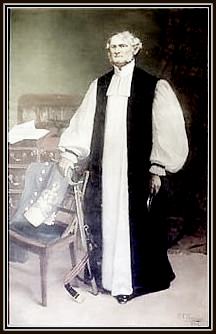
"Sword Over the
Gown"
Eliphalet Fraser Andrews, 1900 A.D.
RELIGION
· EDIFICATION
· WARFARE
_____
"To
all those artists and laymen of the
past and present who have done their
best to hold high the creative ideal
of the True, the Good, and the Beautiful,
this volume is dedicated."
-F.W.
Ruckstull's dedication in GREAT
WORKS OF ART AND WHAT MAKES THEM GREAT,
1925
|
_____
"Art,"
by Herman Melville, 1891:
IN placid hours well-pleased we dream
Of many a brave unbodied scheme.
But form to lend, pulsed life create,
What unlike things must meet and mate:
A flame to melt- a wind to freeze;
Sad patience- joyous energies;
Humility- yet pride and scorn;
Instinct and study; love and hate;
Audacity- reverence. These must mate,
And fuse with Jacob's mystic heart,
To wrestle with the angel- Art.
_____
"Yes, that's right,
he really is Sewanee's greatest Southern
Rights icon. I know you aren't allowed to
say that up there right now, but it's true.
We all know that's why you aren't
supposed to say it. But when I was up there,
students would keep themselves worthy of
his University of the South by speaking
of him frequently with genuine reverence.
His name was their ritual. (I only heard
him mocked one time, and that was in class
by a professor with a specialized 'expertise'
in Southern history.) The students came
from that special set of families who knew
their sons belonged at Sewanee, because
they had lost so much to Lincoln, Sherman,
Grant, and Stevens. The memory of war and
radical Reconstruction was palpable. Now,
you are supposed to say that twelve years
of harsh Reconstruction was a good start
for changing the South by forcing it to
catch up with the rest of America, but the
change regretfully ended too soon. And you
are never allowed to say anything good about
him. For this reason, among many others,
to those who know how to see and how to
care, especially to those few still at Sewanee,
he's looking better all the time."
-From THE LAST CHRISTIAN IN ALABAMA,
draft manuscript
_____

_____
"My great religion is a belief in the
blood, the flesh, as being wiser
than the intellect. We can go wrong in our
minds. But what our blood
feels and believes and says, is always true."
-D.H. Lawrence, in THE
COLLECTED LETTERS OF D.H. LAWRENCE,
Volume I, edited by Harry T. Moore, 1962
_____
"The
poetry of representation, depicting
an ideal world, is a great cohesive
force, binding whole peoples to the
acceptance of a design and fusing
their imaginative life."
-Richard M. Weaver, IDEAS HAVE
CONSEQUENCES, 1948
_____
"Crucial to this philosophy was
the role of the 'vatic spirit,' or
bardic poet. The vatic poet was entrusted
with the community's memory, which
defined identity. One's identity was
not created; it existed independent
of the individual will possessing,
[M.E.] Bradford argued, a historical
and ontological reality. In the process
of remembering, one literally discovered
who one was. Because this rooted and
immutable social identity is at the
heart of the social system, the poet's
role as a 'memory keeper' was essential.
In preserving the cultural heritage
of a people, its oral traditions and
stories of 'blood and land,' the poet
revealed to them the definition of
their society."
-Paul V. Murphy, THE
REBUKE OF HISTORY: The Southern Agrarians
and American Conservative Thought,
2001 |
_____
"When
righteousness is crushed, when evil rules
supreme, I come;
age after age, I take birth again and again,
to save the world."
-BHAGAVAD-GITA, IV, v. 7 and 8, circa
200-300 A.D.
_______
"Right's anvil stands staunch on the
ground
and the smith, Destiny, hammers our the sword.
Delayed in glory, pensive from
the murk, Vengeance brings home at last
a child, to wipe out the stains of blood shed
long ago."
-Chorus in Aeschylus' The Libation Bearers,480
B.C., translated by Richmond Lattimore, 1953
_____
"When the sound and wholesome
nature of a man acts as an entirety, when
he feels himself in the world as a grand,
beautiful, worthy and worthwhile whole, when
his harmonious comfort affords him a pure,
untrammeled delight: then the universe, if
it could be sensible of itself, would shout
for joy at having attained its goal and wonder
at the pinnacle of its own essence and evolution.
For what end is served by all the expenditure
of suns and planets and moons, of stars and
Milky Ways, of comets and nebula, of worlds
evolving and passing away, if at last a happy
man does not involuntarily rejoice in his
existence?"
-Johann Wolfgang von Goethe, "Essay on
Winckelmann," 1805, in the Introduction
to Friedrich Nietzsche's THUS SPOKE ZARATHUSTRA
(1883-1885), by R.J. Hollingdale, 1961, 1969
_____
"Great
star! What would your happiness be, if you
had not those for whom you shine?"
-Zarathustra's
Prologue, THUS SPOKE ZARATHUSTRA,
translation by R. J. Hollingdale
_____
"Thou
bindest them by thy love.
Though thou art far away, thy rays are upon
the earth;
Though thou art on high, thy footprints are
the day."
-Akhnaton's "Hymn to the Sun," circa
1400 B.C., translated by J. H. Breasted, in
DEVELOPMENT OF RELIGION AND THOUGHT IN
ANCIENT EGYPT, 1912
_____
"The essence of truth is not a mere concept,
carried about in the head. On the contrary,
truth is alive; in the momentary form of its
essence it is the power that determines everything
true and untrue;
it is what is sought after, what is fought
for, what is suffered for."
-Martin Heidegger, BASIC QUESTIONS OF
PHILOSOPHY: Selected "Problems"
of "Logic," lectures 1937-1938;
translated by Richard Rojcewicz and Andre
Schuwer, 1984, 1992, 1994
---
"The essence is that from
which a particular thing, and indeed in what
it is, has its origin,
whence it derives. Therefore the essence of
a thing, of a particular whatever,
can be conceived as that which the thing already
in a certain sense 'was'
before it became the singular thing it 'is.'
"
-Ibid.
_____
“My friends, the
follies of modern Liberalism, many and great
though they be, are practically summed in
this denial or neglect of the quality and
intrinsic value of things. Its benevolences—
theology of universal indulgence, and jurisprudence
which will hang no rogues— mean, one
and all of them, in the root, incapacity of
discerning, or refusal to discern, worth and
unworth in anything, and least of all in man;
whereas Nature and Heaven command you, at
your peril, to discern worth from unworth
in everything, and most of all in man. Your
main problem is that ancient and trite one,
‘Who is best man?’ and the Fates
forgive much— forgive the wildest, fiercest,
cruelest experiments— if fairly made
for the determination of that.”
-John Ruskin, FORS CLAVIGERA: Letters
to the Workmen and Labourers of Great Britain,
Volume II, Letter XIV, February 1, 1872
_____
"There is a tide in the affairs of men.
Which, taken at the flood, leads on to fortune;
Omitted, all the voyage of their life
Is bound in shallows and in miseries.
On such a full sea are we now afloat,
And we must take the current when it serves,
Or lose our ventures."
-Brutus, in William Shakespeare's Tragedy
of Julius Caesar, circa 1599
_____
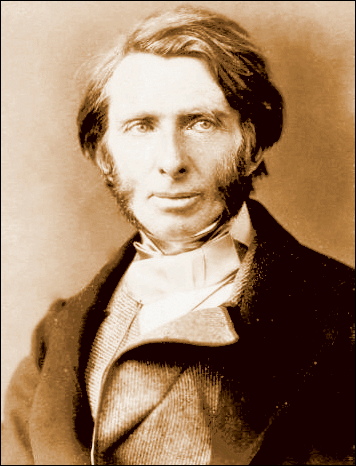
Ruskin
"Permit me, therefore, to fortify
this old dogma of mine somewhat.
Taste is not only a part and an
index of morality- it is the ONLY
morality. The first, and last, and
closest trial question to any living
creature is, 'What do you like?'
Tell me what you like, and I'll
tell you what you are."
-John Ruskin, "Traffic,"
in
THE CROWN OF WILD OLIVE,
1866
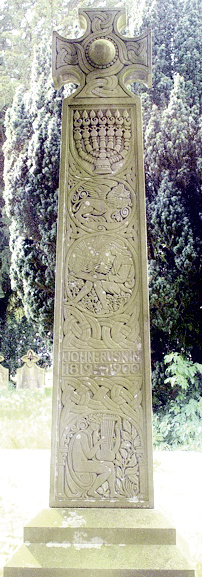
Grave
at St. Andrew’s Church, Coniston
|
_____
"Others say, because it is impossible
to find a man of such perfection as I would
have Courtier to be, it is superfluous to
write it and teach that which can not be
learned. To these I answer that I am content
to err with Plato, Xenophon, and Cicero.
As they conceived the idea of a perfect
Commonwealth, a perfect King, and a perfect
Orator, so also may we conceive of a perfect
Courtier; the image whereof if my power
could not draw nigh in style, so much less
the pains shall Courtiers have to draw nigh
to the end and mark that I have set before
them. Let mine accusers content themselves
with the judgment of Time, which at last
discovereth the privy faults of everything,
and because it is father to truth, and a
Judge without passion, it is accustomed
evermore to pronounce true sentence of the
life or death of writings."
-Baldassare Castiglione,
THE COURTIER, 1528; translated
by Thomas Hoby, 1907 version edited by Rossiter
Johnson and Dora Knowlton Ranous
|
_____
"Well before the War, orators
and writers often told the ladies that the age of
chivalry had passed but then added that they could
nonetheless count on their young gentlemen to behave
according to its canons. The War brought a renewed
emphasis on the religious dimension of medieval chivalry,
and those divines who, like bishop Leonidas Polk,
buckled on the sword could cite the example of the
medieval warrior-priest: fierce in battle and tender
in ministering to his flock."
-Elizabeth Fox-Genovese and Eugene D. Genovese, THE
MIND OF THE MASTER CLASS: History and Faith in the
Southern Slaveholders' Worldview, 2005
_____
"Some
of the most vivid memories
we have are of certain things
to which the name 'epiphany'
applies. These are objects
of mind that seem miraculously
endowed with clarity- things
caught in a moment of illumination
so that they stand forth vivid
in form and nature. . . .
. The scene suddenly arranges
itself in some kind of authenticity,
and we remember it in a way
that cannot be explained through
mechanical impression or through
our need to remember it."
-Richard M. Weaver, "The
Attack upon Memory,"
VISIONS OF ORDER: The
Cultural Crisis of Our Time,
1964, 1995, 2006 |
_____

_____
"Mark
almost any young person, and
you notice that he does not
see very much, in the sense
of understand what is present
to his vision. He perceives,
but he does not interpret,
and this is because he is
too lacking in those memory
traces which lead to ideas
and concepts. The memoryless
part of mankind cannot be
teachers of culture; they
are however, ready learners
of it if the real teachers
show faith in the value of
what they have."
-Ibid. |
|
_____
"Jesus Merciful Christ!
O, Merciful God, have mercy on us!"
-SIR
ABDIEL, at the encounter
_____
"In our concreteness,
somehow artistic representation provides
an icon of actual experience, always the
best of teachers."
-Mark C. Henrie, "A Student's Guide
to the Core Curriculum," in
ALL AMERICAN COLLEGES: Top Schools for
Conservatives, Old-Fashioned Liberals, and
People of Faith, 2006
_____
From
THE LAST CHRISTIAN ALABAMA, draft
manuscript:
The
epiphanous moment arrived one afternoon
while they studied the grand portrait of
Sewanee's Founder and First Father.
The revelation was of how the overlapping
and intersecting six iconographic elements
(The Sewanee Six) guide our best-told
story across the Glorious Founding, Vengeful
Destruction, and Miraculous Revival of Leonidas
Polk's University of the South.
1. LEONIDAS POLK-
Leading Founder
2. PROPHET EYE-
Student Gratitude
3. BISHOP'S GOWN-
Assisting Ante-Bellum Founders &
Sustainers' Post-Bellum Revival
4. PLANTER'S DESK,
PEN & INK
& 1856
LETTER- Ante-Bellum
Founding
5. BOOKE OF
COMMON PRAYER
in HAND- Founding,
Consecrated Cornerstone, War, Destruction
& Revival
6. GENERAL'S COAT,
SWORD &
BUCKLE- Independence,
Confederates, War, Destruction &
Revival
Finally, we have found the one best use
for the word "intersectionality."
By looking through this lens alone, we are
ready to proceed at making our progress
toward deeper understanding of the critical
issues we must confront.
_____
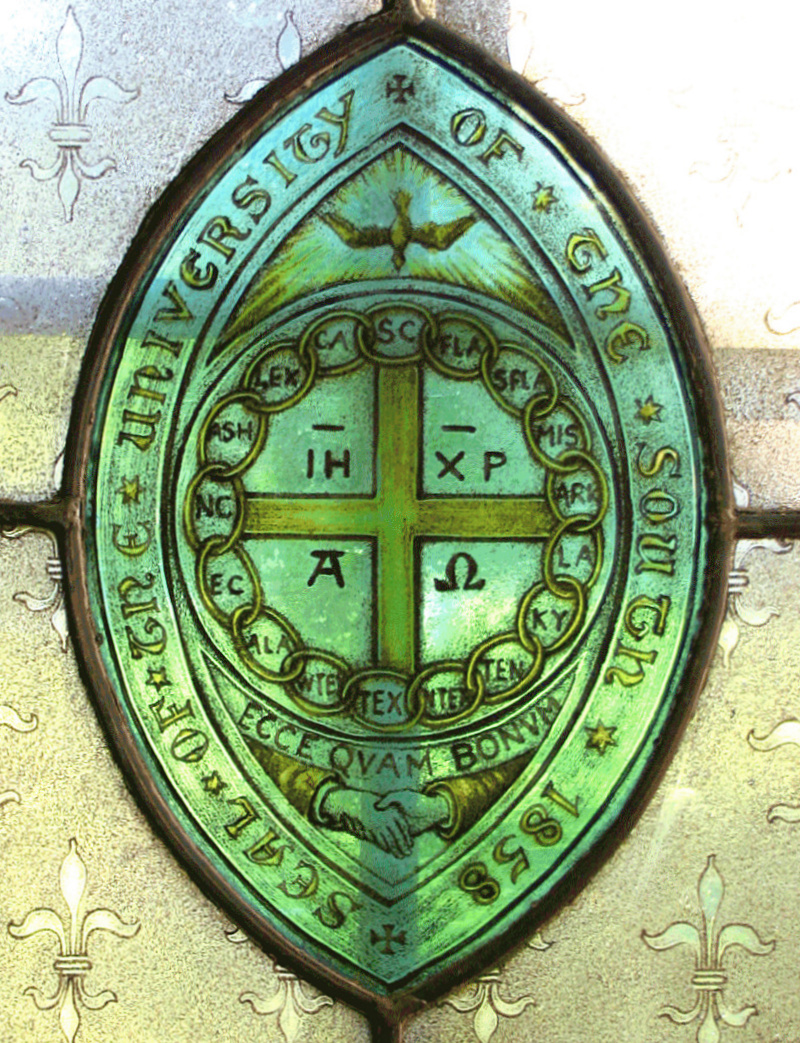
The Great Seal of Leonidas Polk's University
of the South
______
"For
after a course of years it is possible
to look back and see the development
of certain formative preoccupations
out of which the lineaments of a
vocation emerge and take shape,
seriatim, through a series
of discrete performances."
-M.E. Bradford, THE
REACTIONARY IMPERATIVE: Essays Literary
& Political, 1990
_____
Under
Construction
Leonidas Polk as Received
by the Gathered Saints
Preparing for
the Opening Day of Our Epoch of Restoration:
First "Sword Over the Gown"
presentation, Sewanee, Tennessee,
Easter Semester, April 28, 2003
Opening Day of Our Epoch of
Restoration:
Historic unveiling of the newly commissioned
reproduction "Sword Over the
Gown" portrait, Sewanee, Tennessee,
Trinity Term, June 1, 2003
Living into
Our Epoch of Restoration:
"A Man of God becomes a Man of
War," Sewanee, Tennessee, Advent
Semester, September 27, 2003
"Leonidas Polk: His Death and
Commemoration," Chattanooga,
Tennessee, June 15, 2004
"In Memory of Bishop-General
Leonidas Polk," Pine Mountain,
Georgia, June 26, 2004
Leonidas Polk remembered and discussed
by special visitors, Pine Mountain,
Georgia, September 19, 2004
"The Legacy of Bishop-General
Leonidas Polk," Smyrna, Georgia,
September, 20, 2004
Leonidas Polk remembered and discussed
by special visitors, Pine Mountain,
Georgia, October 22, 2004
"The Sword of Truth," Nashville,
Tennessee, June 5, 2005
"Chancellor of The University
of the South Killed in Battle,"
Pine Mountain, Georgia, June 25, 2005
"The Sword of Truth," Marietta,
Georgia, July 12, 2005
"The Bishop's Sword," Smyrna,
Georgia, February 25, 2006
"The Bishop's Sword," Mableton,
Georgia, February 27, 2006
"Sword Over the Gown," Pine
Mountain, March 3, 2006
Preparing for the Opening
Day of Our Epoch of the Sesqui-Centennial:
Leonidas Polk remembered and discussed
by special visitors, New Orleans,
Louisiana, April 8, 2006
"The Bishop, the Educator, the
General: A Prophetic Remembrance,"
New Orleans, Louisiana, April 9, 2006
Opening Day
of Our Epoch of the Sesqui-Centennial:
Fulfilling the Cornerstone Prophecy
and Establishing the Leonidas Polk
Memorial Society, New Orleans, April
10, 2006.
The Bi-Centennial Memorial Address:
"The Bishop, the Educator, the
General: To Pray, to Think, to Dare,"
New Orleans, Louisiana, April 10,
2006
Living into Our Epoch of the
Sesqui-Centennial:
A Bi-Centennial Memorial Lecture Series
Address: "Bishop-General Leonidas
Polk's Wartime Communion Chest,"
Atlanta, Georgia, April 26, 2006
A Bi-Centennial Memorial Lecture Series
Address: "The Tenth Year Hence:
2016 A.D.," Pine Mountain, Georgia,
June 24, 2006
A Bi-Centennial Memorial Lecture Series
Address: "Our Unchanging Christ,"
Atlanta, Georgia, June 24, 2006
A Bi-Centennial Memorial Lecture Series
Address: "The Triadic Mysteries
of Leonidas Polk," Blue Ridge,
Georgia, August 30, 2006
A Bi-Centennial Memorial Lecture Series
Address: "Leonidas Polk and the
Communion of Memory," Atlanta,
Georgia, September 26, 2006
A Bi-Centennial Memorial Occasion:
Leonidas Polk remembered by special
visitors, Pine Mountain, Georgia,
October, 20, 2006
A Bi-Centennial Memorial Lecture Series
Address: "The Lesson at Cowan,"
Roswell, Georgia, November 7, 2006
The Concluding Bi-Centennial Memorial
Lecture Series Address: "The
Sesqui-Centennial as Your Trinitarian
Prelude," Sewanee, Tennessee,
Advent Semester, December 9, 2006
"St. John's Episcopal Church
and the Leonidas Polk Pilgrimage,"
Spring Hill, Tennessee, May 25, 2007
"The Sacred Window of Memory:
Leonidas Polk in Louisiana,"
Pine Mountain, Georgia, June 16, 2007
Preparing for Our Epoch
of Reflection:
Closing Day
of Our Epoch of the Sesqui-Centennial:
Living into
Our Epoch of Reflection:
|
_____
Dylan
Thomas, "Do Not Go Gentle into that
Good Night," 1951:
Do not go gentle into that good night,
Old age should burn and rave at close of
day;
Rage, rage against the dying of the light.
Though wise men at their end know dark is
right,
Because their words had forked no lightning
they
Do not go gentle into that good night.
Good men, the last wave by, crying how bright
Their frail deeds might have danced in a
green bay,
Rage, rage against the dying of the light.
Wild men who caught and sang the sun in
flight,
And learn, too late, they grieved it on
its way,
Do not go gentle into that good night.
Grave men, near death, who see with blinding
sight
Blind eyes could blaze like meteors and
be gay,
Rage, rage against the dying of the light.
And you, my father, there on the sad height,
Curse, bless, me now with your fierce tears,
I pray.
Do not go gentle into that good night.
Rage, rage against the dying of the light.
_____
"There
is a message in the very being of your life,
and only some of you have already heard
the voice of this message. You've heard
the integrity of this voice in your blood.
Others of you feel the yearning for the
messenger's voice and hope it will soon
come to you, because you know you need it.
That yearning speaks inwardly back into
your being and is heard by the voice you
will soon hear. As God cannot ignore righteous
prayers, neither can the message, since
it was put deepest-most into you by God,
ignore your fervent longings to hear it.
This is what we will address tonight."
-SIR
ABIDEL, "Sewanee
Sermon," from THE LAST CHRISTIAN
IN ALABAMA, draft manuscript
_____
From
Donald Davidson's "Why the Modern
South Has a Great Literature,"
Address at the annual meeting of the
Southern Literary Festival, Mississippi
State College, 1950; published in
Vanderbilt Studies in the Humanities,
Vol. I; STILL REBELS, STILL YANKEES,
and Other Essays, 1957:
The picture in Vergil is idealized,
of course. Nevertheless, that is the
kind of knowledge that the South has
faithfully cultivated throughout its
history. Devotion to such knowledge,
knowledge 'carried to the heart,'
is the dominant characteristic of
Southern society.
|
______
THE
ALLEGORY of SEWANEE'S TRIPARTITE
FORM
"Knowledge Carried to the
Heart"
_____
"Wherever such a divinized
person lives, there we have the best,
noblest, and, in God's eyes, most
valuable life that ever was or can
be. Attachment to this kind of life
is rooted in a love of goodness for
the sake of the good. It has an eye
for the best and noblest in all things
for the sake of the good. And it is
so deep that it can never be quite
abandoned and rejected."
-THE THEOLOGICA
GERMANICA OF MARTIN LUTHER, 1518
edition, translated by Bengt R. Hoffman,
1980
_____
"And they were
originally rooted in oral cultures
that typically rely heavily on the
cliches and formulas that members
of literate cultures self-consciously
seek to avoid. Walter J. Ong, the
distinguished literary scholar, noted
that the formulas 'are necessary for
history' because they facilitate the
preservation of knowledge, which is
then available when needed. Oral cultures
depend heavily upon recall and recognition
and consequently favor verbosity,
repetition, standardization of themes,
and narrative, which wraps the knowledge
to be preserved and transmitted in
tales and songs easy to remember."
-Elizabeth Fox-Genovese and Eugene
D. Genovese, THE MIND OF THE MASTER
CLASS: History and Faith in the Southern
Slaveholders' Worldview, 2005
_____
|
"The
Bishop who lived to serve
the people he loved reminds
us to pray; the Educator who
lived to serve the people
he loved reminds us to think;
and the General who lived
to serve the people he loved
reminds us to dare to fight
those battles of this life
which we must fight in order
that the children of our own
land will not one day say
of us..."
-Excerpt from
"The Leonidas Polk Bi-Centennial
Address," delivered at
the Monument to the Confederate
Dead, Greenwood Cemetery,
New Orleans, Louisiana, April
10, 2006 |
|
|
___________
The Allegory Enhanced along the Pilgrims' Road
Katabasis & Anabasis
_______
The Allegory Developed in Proper
Turn
AnRl41
· ClEd56
· RgWr61
Biblical
· Original
· Historical
Traditional
· Intentional
· Preventional
Evangelical
· Societal
· Rhetorical
Domainian:
Creation
· Redemption
· Sanctification
_____

|
___________
Guiding Western Moralism
_____
"The freedom with which Dr. Johnson condemns whatever
he disapproves is astonishing; and the strength of words he
uses would, to most people would be intolerable."
-Miss Burney, quoted in MEMOIRS OF MADAME
D'ARBLAY, by Mrs. Helen Berkeley, 1844
_____
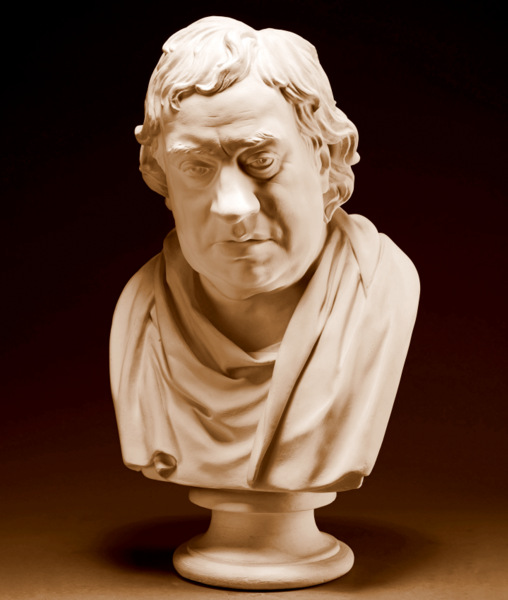
Joseph Nollekens' Dr. Johnson
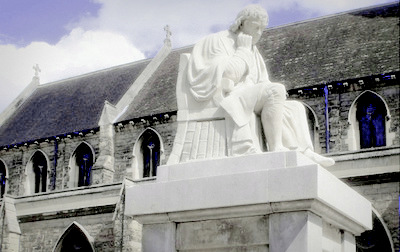
Dr. Johnson Monument, Lichfield
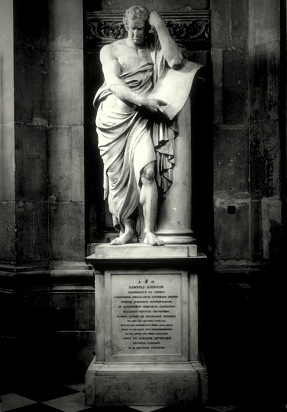
Dr. Johnson Monument, St. Paul's Cathedral
_____
From http://www.westminster-abbey.org/our-history/people/samuel-johnson;
viewed 2/6/2014:
Samuel Johnson
History
In
the south transept of Westminster Abbey is the grave of Dr
Samuel Johnson, lexicographer and critic. He lies just in
front of Shakespeare’s memorial. The inscription in
brass letters reads:
SAMUEL JOHNSON, LL.D Obiit XIII die Decembris Anno Domini
MDCCLXXXIV Aetatis suae LXXV
which can be translated:Samuel Johnson, Doctor of Laws, died
13 December in the year 1784, aged 75.
Above the grave is an 18th century bust by sculptor Joseph
Nollekens, which was presented to the Abbey in 1939 by G.H.Tite.
It just has the name JOHNSON at the base. In 1790 the Dean
and Chapter had given permission for the erection of a monument
to Johnson but this was never actually put up (a statue was
erected at St Paul’s cathedral in 1796 and this might
have been the monument which had been intended for the Abbey).
Life
Samuel was born in Lichfield on 7 September 1709, a son of
Michael Johnson and his wife Sarah. He was educated in that
town and later at Oxford. After an unsuccessful attempt at
being a schoolmaster he came to London to make his fortune
in 1737, with his friend David Garrick (the famous actor who
is buried next to him). In 1735 he married a widow, Elizabeth
Porter (d.1752). After periods of poverty and ill health he
made his name with essays entitled The Rambler and published
his great Dictionary of the English Language in 1755. One
of his last great works was The Lives of the Poets. He died
on 13 December 1784 aged 75. A wreath is laid on his grave
each year on the anniversary of his death.
_____
From http://www.johnson2009.org/; viewed 8/20/2010:
Samuel Johnson Tercentenary 2009
“Samuel
Johnson, a man whose talents, acquirements, and virtues, were
so extraordinary, that the more his character is considered,
the more he will be regarded by the present age, and by posterity,
with admiration and reverence.”
(James Boswell, The Life of Samuel Johnson, 1791)
Welcome to the Samuel Johnson Tercentenary web site. This
site contains information about the celebrations to mark the
300th anniversary of the birth of Samuel Johnson, which falls
on 18 September 2009.
Johnson
usually regarded anniversaries as occasions for repentance and
pious resolution. On his 72nd birthday, however, he decided that
“some little festivity was not improper” and “had
a Dinner”. Our
own festivities will be rather more extensive. They commenced
with a modern-day Johnson, Garrick and their horse walking from
Lichfield to London. Other clubbable, world-wide events will include
conferences, exhibitions, tours, lectures and a banquet.
Samuel Johnson
Samuel Johnson, 1709-1784, was widely regarded as the leading
literary figure of his time, so much so that it is often referred
to as the “Age of Johnson”. He was (amongst other
things) a poet, biographer, lexicographer, essayist, editor and
reviewer.
Lichfield
Johnson was born in Lichfield in 1709, the son of a bookseller.
(His home is now the Samuel Johnson Birthplace Museum .) He was
educated at Lichfield Grammar School and at Pembroke College,
Oxford, but was forced by poverty to leave Oxford without taking
a degree. He returned to Lichfield and worked in his father’s
shop for a while, as well as finding employment (rather unsuccessfully)
as a tutor.
In 1735, he married Elizabeth Porter, a widow who was 23 years
older than him. Using her money, they established a school at
Edial, near Lichfield, but it failed, and in 1737 Johnson departed
for London, hoping to make a living by his writing. With him went
his friend and former pupil, David Garrick.
Grub Street
When he arrived in London, his only source of income was his writing:
it was to remain so for the next twenty-five years. His publications
were prolific and demonstrated an extraordinary range, from his
account of the life of the poet Richard Savage (still considered
a classic of biography) to reports of the debates in Parliament.
He published his long poems London and The Vanity of Human Wishes,
and became an editor of, and contributor, to the Gentleman’s
Magazine.
He
gradually acquired a reputation in the literary world, and in
1746 he was commissioned by a consortium of printers to write
a dictionary of the English language. At this time he rented 17,
Gough Square, London, which served as both home and workshop for
the Dictionary. While working on the Dictionary, he also published
a series of essays under the name The Rambler, and contributed
to The Adventurer essays. (He was later to write another series
as The Idler.)
Elizabeth
Johnson died in 1752, plunging Johnson into the depression to
which he was subject all his life. Shortly afterwards, Francis
Barber, a young boy who had been a slave in Jamaica joined Johnson’s
household as a servant. He (and later his wife and children) was
to live with Johnson for over thirty years, and to become his
heir.
The Dictionary
The Dictionary of the English Language was eventually published
in 1755. It was not (as is often claimed) the first English dictionary,
but it was certainly the most important one published up to that
date. It went through numerous editions, and was not superseded
until the publication in 1928 of the Oxford English Dictionary.
Johnson
was often short of money, even being arrested for debt. In 1759
he published Rasselas, a short oriental story, intended to raise
the money to pay for his mother’s funeral.
In
1762, at the age of 53, he at last achieved financial security
when he was awarded a government pension. His later major works
included an edition of Shakespeare’s plays and a series
of biographical and critical studies of the major poets, originally
published as prefaces to a large collection of their works, but
subsequently published separately. They are usually known as The
Lives of the Poets.
Boswell
In 1763 he met the young Scottish lawyer James Boswell, a keen
admirer of Johnson and subsequently a close friend. In 1773 they
toured Scotland together. Both published accounts of their travels,
Johnson’s Journey to the Western Isles of Scotland and Boswell’s
Journal of a Tour to the Hebrides with Samuel Johnson.
This
stage of his life is familiar to reader of Boswell’s Life
of Johnson, the period when Johnson was the established leader
of the literary world, and was at the centre of a circle of some
of the greatest figures in art and literature, including Joshua
Reynolds, Edmund Burke and Oliver Goldsmith.
Another
important friendship began in 1765, when Johnson met Henry and
Hester Thrale. For almost 20 years they provided him with what
were effectively second (and third) homes with them in Southwark
and Streatham. Hester Thrale was one of a number of women writers
whom Johnson encouraged; others included Charlotte Lennox, Hannah
More and Fanny Burney. The diaries of Hester Thrale and Fanny
Burney provide a counterpoint to Boswell’s account.
Johnson’s
last years were marked by illness, the death of several friends,
and the breakdown of his friendship with Hester Thrale. He died
on 13 December 1784, and was buried in Poets’ Corner in
Westminster Abbey.
_____
From
http://hcl.harvard.edu/libraries/houghton/exhibits/johnson/chronology.cfm;
viewed 8/20/2010:
Samuel Johnson: A Chronology
1709: Samuel Johnson is born in Lichfield, England to Michael
and Sarah Johnson.
1728: Johnson enrolls in Pembroke College, Oxford. Unable to continue
paying his bills, he withdraws little more than a year later.
1731: "Messia," Johnson’s Latin translation of
Alexander Pope's "Messiah" is published in Husbands's
Miscellany, the first of his works to see print.
1735: Johnson marries Elizabeth (Jervis) Porter, a widow twenty
years his senior. With the inheritance from her late husband,
he opens a grammar school. Attracting few pupils, he is forced
to close it in January 1737.
1737: With his friend and former pupil David Garrick, Johnson
sets off for London to pursue a career as an author.
1738: Johnson's poem London, his first important literary work,
is published anonymously.
1746: Johnson begins work on his dictionary, and writes A Short
Scheme for Compiling a New Dictionary of the English Language,
published the following year.
1749: David Garrick’s Drury Lane Theatre performs Johnson’s
tragedy Irene. Johnson publishes his poem The Vanity of Human
Wishes.
1750: Johnson issues the first of his twice-weekly series of essays
entitled The Rambler. It will continue for two years, totaling
208 installments, all but seven written by Johnson.
1752: Elizabeth Johnson dies. Johnson never remarries.
1755: After nine years of labor, A Dictionary of the English Language
is published.
1759: Johnson writes The Prince of Abyssinia (better known as
Rasselas), in just one week’s time, to pay the expenses
of his mother’s final illness and funeral.
1762: Johnson is granted a royal pension of £300 per year.
1763: Johnson meets James Boswell for the first time.
1764: Sir Joshua Reynolds founds the Club, its membership drawn
from Johnson’s circle of friends.
1765: Johnson publishes his long-awaited edition of the works
of Shakespeare.
1773: Boswell and Johnson tour Scotland together; the trip forms
the basis of Johnson’s A Journey to the Western Islands
of Scotland (1775) and Boswell’s The Journal of a Tour to
the Hebrides, with Samuel Johnson, LL.D. (1785).
1779: Johnson publishes the first volumes of his Prefaces, Biographical
and Critical, to the Works of the English Poets, completed in
1781.
1784: Johnson dies on December 13th, at age 75. He is buried in
Westminster Abbey the following week.
___________
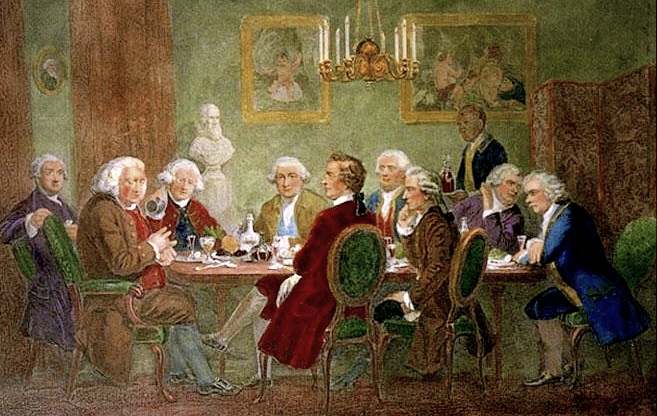
The
Club: Joshua Reynolds and Samuel Johnson, including Edmund
Burke, et al.
_____
"a very good hater"
From Ebenezer Cobham Brewer's DICTIONARY
OF PHRASE AND FABLE, 1898:
I love a good hater. I like a man to be with me or
against me, either to be hot or cold. Dr. Johnson called
Bathurst the physician a “good hater,” because
he hated a fool, and he hated a rogue, and he hated a
Whig; “he,” said the Doctor, “was a
very good hater.”
_____
"Dr.
Johnson seemed to delight in drawing characters; and
when he did so con amore, delighted every one
that heard him. Indeed, I cannot say I ever heard him
draw any con odio, though he professed himself
to be, or at least to love, a good hater."
-Miss Reynolds, in James Boswell's THE
LIFE OF SAMUEL JOHNSON, Vol. IX, New Edition, 1844
_____
"The Tyranny of Liberalism,
published in 2008, established James Kalb, a writer
and attorney, as one of the most incisive social, intellectual,
and political critics of the 21st century. Against
Inclusiveness furthers the argument of the first
book, while expanding upon it in interesting directions.
The book's thesis, briefly stated, is that what we call
'diversity' is not diverse at all but, instead, a monolithic
concept, matching and reflecting the monolithic thought
of the increasingly monolithic social structure that
has been developing and imposing it upon Western Society
for a generation at least."
-Chilton Williamson, Jr.'s review of
James Kalb's AGAINST INCLUSIVENESS: How the Diversity
Regime is Flattening America and the West and What to
Do About It, in Chronicles,
Vol. 37, No. 12, December 2013
______
At http://thedmonline.com/meredith-statue-incident-life-changing-for-witness;
February 18, 2014:
“I obviously didn’t
see those two young men do it, but there’s
no doubt in my mind that they did it,”
McMillan said. “I wish I could have done
more. If I would have seen what they did before
I lost sight of them, I may have tried to hold
one of them down. I hope and pray that they
find whoever did this. I know I could identify
them if I saw them again.”
_____
At http://thedmonline.com/staff-editorial-experience-informs-our-consciousness;
February 19, 2014:
But still nothing has changed. These events
continue to happen semester after semester,
and year after year. All of our actions seem
fruitless and impotent, leaving us broken, scared,
humiliated and with burning, difficult questions:
What do we do about it? How do we stop these
events from transpiring? How do we fight an
idea?
---
We offer hope to this university community and
to the world. Hope that if we come together,
we can achieve new heights. Heights where when
we hear hatred, when we see prejudice, when
we encounter judgment, we are compelled to love.
It is time for us to reach these heights and
create a welcoming environment for all.We, as
a community, must take the power from this event
and show our rejection of it. It is our turn
to show our own power and not be swayed by the
fear perpetuated by a few.
_____
At http://thedmonline.com/students-faculty-organize-discussion-regarding-meredith-statue-incident;
February 20, 2014:
“It’s a sad commentary on a small
group of students that has not evolved to a
consciousness that all men are created equal
and that everyone is the same in the sight of
God,” Ball said.
_____
At http://thedmonline.com/we-need-productive-outrage;
February 24, 2014:
Don’t get me wrong — I truly love
Ole Miss and Mississippi. I love it enough to
try my hardest to make it better. I love many
of our traditions and appreciate Mississippi’s
unique heritage. However, it would be in our
university’s best interest to celebrate
heritage that’s inclusive of all Mississippians,
not just a few.
The status quo is unacceptable.
_____
At http://thedmonline.com/students-express-concern-about-greek-life-after-incident;
February 24, 2014:
News spread Friday that the three suspects the
university is seeking in the Meredith statue
investigation were members of the Sigma Phi
Epsilon fraternity at The University of Mississippi.
The fraternity, known as Sig Ep, expelled all
three members immediately, and the fraternity’s
national headquarters indefinitely suspended
the chapter while the investigation is underway.
Some
students at Ole Miss are discussing the role
that Greek life plays in fostering racial problems
on campus.
“It
is challenging to directly identify the root
of the problems that African-American students
experience at Ole Miss, particularly those related
to race,” said Quadray Kohlheim, president
of the Ole Miss Black Student Union. “However,
history itself gives proof that members from
(Interfraternity Council) Greek life contribute
heavily to this issue.”
The
Interfraternity Council, commonly referred to
as IFC, is the group of 16 traditionally-white
fraternities on campus. There are three traditionally-black
fraternities on campus, but they fall under
National Pan-Hellenic Council, not the Interfraternity
Council.
Before
the allegations became public, the presidents
of all 16 Interfraternity Council fraternities
on campus signed a letter Thursday condemning
the desecration of the statue.
Kohlheim
said he believes the culture of Greek life in
general allows “a homogenous mindset”
that leads to acts of racism and discrimination.
“I
would not dare isolate the problem solely to
the IFC, and I would like to commend the strong
statement made by its leaders,” he said.
“Their response reflects progress of our
institution.”
Sig
Ep President Jeremy Smith said that the actions
of the three students in no way represent the
values of the fraternity itself.
“When
we learned that these students were responsible,
we were offended and outraged,” Smith
said. “The act of desecrating a statue
of a civil rights leader like James Meredith
represents a culture that should be long gone
and one that has absolutely no place in our
fraternity.”
For
many non-Greek students on campus, the negative
perceptions caused by some members of the Greek
system is discouraging.
“This
(incident) doesn't change my opinion of Greek
life, it reinforces it,” senior journalism
major Ryan Rigney said. “It’s not
a coincidence that many frat boys fail to act
like paragons of tolerance and inclusion. Exclusion
and rejection of people who differ from the
norm are fundamental to the system they are
a part of.”
Other
leaders in the Ole Miss Greek community were
quick to discredit any negative connotations
caused by similar incidents in the past.
“It’s
such a shame that these three individuals would
do something like this,” said William
Burns, president of Sigma Alpha Epsilon fraternity
said. “These actions go against everything
we stand for as a Greek community. We are tired
of the negative perceptions to Greek life, our
university and the state of Mississippi because
of a small number of ignorant people.”
_____
At http://thedmonline.com/chancellor-jones-releases-letter-regarding-statue-incident;
February 26, 2014:
As we deal with feelings of hurt and
frustration, I encourage us all to respond to
hate with love – recognizing that a component
of love is holding each other accountable for
our actions. In that spirit, the university
police, aided by an Ole Miss Alumni Association
$25,000 reward, led an intensive investigation
that identified suspects in a matter of days.
At the request of University Police and university
leadership, the FBI was asked to take the lead
on the case. Our purpose in doing this was to
assure the most thorough and objective investigation
with the best potential for the fullest accountability.
---
So let’s consider some of our ongoing
efforts at improving diversity and being inclusive.
Just this past weekend, we hosted consultants
who helped us systematically review our symbols
and campus names to reflect on opportunities
to better tell the full history of the university.
Another consultant will be here in the next
few days to review our organizational structure
and our efforts in diversity and multicultural
issues. Both of these consultancies were arranged
before last week’s incident and reflect
the hard work of the expanded Sensitivity and
Respect Committee.
---
Much has been done. But our work is not complete.
I offer my encouragement to those who have already
engaged. And I urge others to step up to the
important work ahead of us. Every one of you
can make a difference. Each of us can take responsibility
for stopping the next act of hate and instead
foster the next demonstration of love, civility
and respect.
_____
Report,
Findings and Recommendations of the
Extended Sensitivity and Respect Committee;
undated, circa 2012-2013, excerpt:
A complete list of the recommendations
and their rationale is given in the
main report, but here are some of the
key recommendations:
• Develop and plainly display
a clear message that explains our institutional
commitment to diversity
• Evaluate current administrative
structure and increase resources to
support diversity efforts
• Create a culture of research
excellence related to race
• Enhance our communications and
marketing strategies to ensure that
race and inclusiveness are a central
part of our messages
• Better prepare our faculty and
staff to respond to and address incidents
of bias
• Conduct a review of all of our
divisive symbols
• Adopt a comprehensive, holistic
diversity plan with strategies tied
to measurable goals
• Incorporate an emphasis on racial
climate and diversity into all aspects
of university planning and assessment
• Provide an ongoing assessment
of campus climate
• Engage diverse, prospective
students earlier (with an emphasis on
Mississippians) and aid in their transition
to UM
• Initiate a new student program
(or enhance our current offerings) to
more intentionally educate students
about our commitment to inclusion and
reinforce our shared values
• Further explore how we engage
diverse alumni
(Source: http://www.olemiss.edu/depts/chancellor/sandrfiles/SR%20Committee%20Report%20and%20Response.pdf;
viewed March 2, 2014)
_____
Under
Construction
RA 1986, MRRR 1989, MMD 1998,
LH 2004, SP 2010, Theo Div.
From
http://allafrica.com/stories/201405140600.html;
5/14/2014:
"The University is committed
to serious scholarship and to
the preparation of an educated
ministry," explains John
M. McCardell Jr., vice-chancellor
of the University of the South.
"As part of our broader,
long-range vision, we want to
see students matriculating here
from across the Anglican Communion.
Dr. Tengatenga's appointment
underscores this global orientation
as we seek to increase Sewanee's
diversity in both the college
and The School of Theology."
UGA
Div. Inc.
From http://www.ajc.com/news/news/local-education/uga-faces-accusation-it-is-limiting-free-speech/nfpmB;
May 5, 2014:
A lawsuit accuses the University
of Georgia of inhibiting free
speech by limiting demonstrations
to two areas on its Athens campus.
The
lawsuit, filed last week by
the Alliance Defending Freedom
on behalf of a UGA student group,
charges that the university’s
two areas make up less than
1 percent of the main campus.
The “Free Expression Areas,”
at the Tate Student Center Plaza
and the Memorial Hall Plaza,
are open for speeches and demonstrations
on weekdays between 8 a.m. and
9 p.m., according to UGA policy.
The gatherings are scheduled
through the associate dean of
students. Any group wanting
to gather outside the designated
time must get approval from
the dean at least 48 days in
advance and receive a permit.
ADF,
an American conservative Christian
nonprofit group, is suing on
behalf of the UGA chapter of
the Young Americans for Liberty.
In March, UGA prohibited the
student group from displaying
a nation’s debt clock
in an area outside one of the
free speech zones.
UGA
officials declined to comment
on the pending lawsuit, which
they had not seen, university
spokesman Tom Jackson said Monday.
“There
is clearly no shortage of expression
here at UGA,” Jackson
said. “It’s something
that we value greatly, as demonstrated
by the numerous demonstrations
we’ve had at UGA.”
Last
week, a group of students held
a demonstration protesting a
state University System policy
banning illegal immigrants from
attending some state institutions,
which currently includes UGA.
The
free speech lawsuit was first
reported by Campus Reform, a
watchdog group that monitors
higher education bias and abuse.
The suit names UGA President
Jere Morehead and other UGA
administrators as defendants
in the case.
|
_____
At http://thedmonline.com/racial-climate-report-released;
October 9, 2013:
The university’s Extended Sensitivity
and Respect Committee released a report
Tuesday that makes recommendations to
improve the campus’ racial climate,
including changing the names of two
campus buildings and striving to support
campus symbols that represent all people
on campus.
Following
the Nov. 6, 2012, election night protest,
Chancellor Dan Jones challenged the
committee to study race relations with
the goal of improving the racial climate
on campus. Jones wrote a response letter
to the report and listed individual
implementation plans for each of the
12 main recommendations.
“It
is always important to stop and take
the measure of our progress and what
work remains,” said Susan Glisson,
member of the committee and Executive
Director of the William Winter Institute
for Racial Reconciliation. “This
process has been important in illuminating
areas that still need more work and
helps to provide a road map for proceeding.”
One
of the specific actions the committee
suggested will be visually apparent
to anyone on Ole Miss’ campus.
The committee recommended to rename
Vardaman Hall, and to consider renaming
the Paul B. Johnson Ballroom, which
is more familiarly known as the Johnson
Commons. James K. Vardaman and Paul
B. Johnson, Jr. were both Mississippi
politicians who openly promoted white
supremacy.
Additionally,
university symbols were mentioned in
the report. Committee Co-chair and Assistant
Provost Donald Cole said the committee’s
discussions and inclusion of that section
of the report was “in some ways
controversial itself.”
“Campus
symbols, particularly those that became
associated with the university during
Jim Crow segregation and the resistance
to civil rights (e.g., the Confederate
monument, Rebels, Colonel Rebel/Colonel
Reb and Dixie) are a source of contention
among different members of the university
community,” the report states.
“UM should strive to support symbols
that represent all on our campus.”
In
Jones’ response to the divisive
symbols section, he wrote: “A
consultant will be engaged to help with
this review; this process will be begun
in the first half of this academic year
with a goal of beginning the review
within the academic year.”
The
committee is a standing university committee,
but Jones appointed additional members
to the committee after the election
night protest, including students.
Cole
said that there is no connection between
the timing of the report’s release
and this week’s UM Pride Week,
Racial Reconciliation Week or the incident
at the showing of the Oct. 1 performance
of “The Laramie Project.”
Once the committee finished its report
and recommendations, it then submitted
the report to Chancellor Dan Jones for
approval.
“We
(as a committee) took whatever time
that was needed to produce a quality
product,” said Cole, “(Jones)
said that it was a quality product.
I sure hope that it is, but time will
tell.”
Another
main issue addressed in the report involves
freshman experience and the way race
is addressed to new students on campus
– something Cole says the committee
agreed on 100 percent.
“I’m
excited about the work around improving
the freshman experience and in introducing
the importance of learning to be respectful
in a diverse world to students who may
not have been in very diverse environments
before,” Glisson said.
ASB
President Gregory Alston served as a
student representative to the committee.
He stated that while no specific actions
have been taken to enact the committee’s
recommendations, he has a positive,
optimistic outlook for the committee’s
mission.
“The
report was needed,” Alston said.
“It addresses issues that were
brought up here at the university, and
the community did a great job in producing
this report. The university will benefit
in moving forward. ”
|
_____
At http://thedmonline.com/bsu-president-discusses-race-issues-on-campus;
February 24, 2014:
Do you think that IFC Greek life at Ole Miss
plays a significant role in the problems that
have occurred on our campus?
---
I dare not isolate the problem solely to the
IFC, and I would like to commend the strong
statement made by the IFC, which appeared in
the DM on last week. It truly spoke volumes
that this segment of the student population
willingly took a stance on the issue. Their
response reflects progress of our institution.
It is my hope that in the future they will work
even more with groups such as BSU, NPHC, etc.,
to find a way to bridge that gap between all
cultures, backgrounds, and orientations of all
students at the University of Mississippi.
---
Lastly, it is time for the university to put
its money where its mouth is. It is time for
funds to be directed toward areas that will
have a substantive and long-term impact toward
progress and diversity. I am hopeful that this
will happen, considering the university’s
announcement of the Center for Inclusion and
Cross Cultural Engagement and other departments
alike.
_____
At http://thedmonline.com/private-racism;
February 25, 2014:
The reality is that both of these narratives
are partially true. Over the past couple decades,
university and ASB officials have made conscious
decisions- removing Colonel Reb, banning the
Confederate flag at football games, etc.- in
order to move the university beyond its shameful
past. On the other hand, as in events such as
the protests following the 2012 presidential
elections, “The Laramie Project”
incident and the Meredith statue incident, our
past continues to rear its ugly head.
_____
At http://thedmonline.com/ole-miss-needs-culture-change;
February 27, 2014:
For some time, I didn’t know how to channel
my anger, disgust, frustration, sadness and
the many swirling emotions that I’ve experienced
over the past week. Frankly, I’m still
somewhat in shock, and I think many of us don’t
know where we go from here. This wasn’t
supposed to happen. And we certainly were supposed
to be past such hateful, ignorant actions on
our own campus.
---
Mississippi has not yet reached the “oasis
of freedom and justice” that Martin Luther
King Jr. called for. We must continue to press
forward; we must continue to ask uncomfortable
questions; and most importantly, we must continue
to speak up and speak loudly against injustice
and intolerance.When it is obvious that intolerant,
disrespectful bigots don’t have a place
here, then The University of Mississippi will
stand as a flagship institution of freedom and
justice.
_____
At http://thedmonline.com/the-future-depends-on-courage-today;
Febuary 28, 2014:
And we must combat the dangerous, discriminatory
“stand your ground” laws, which
are extremely subjective and encourage vigilantes
in states across the country.
_____
At http://thedmonline.com/meredith-statue-investigation-continues-consultant-recommendations-expected;
February 28, 2014:
Ole Miss Chancellor Dan Jones requested that
a consultant come to campus to assess symbols
such as monuments, names of buildings and roads
and traditions. University of Richmond President
Edward Ayers was brought to campus last weekend
to handle those responsibilities.
“The University of Richmond went through
a very similar thing we are going through now,”
Blanton said.
_____
At http://www.huffingtonpost.com/matthew-lynch-edd/why-the-symbolic-lynching_b_4894276.html;
March 4, 2014:
I should know: I am an American. I earned my
graduate degrees from Ole Miss. I wrote my dissertation
about lynching. I daily walked along picturesque
campus drives named "Confederate"
and "Rebel." I frequently studied
in areas near the Confederate statue, cemetery,
and stain-glass window. The invocation of the
spirit of the Confederacy conveyed that while
I was at Ole Miss, I was not meant to be of
Ole Miss.
---
The abundant Confederate memorabilia reflected
in flags and a mascot, personified in a doppelganger
of Colonel Sanders, nicknamed "Colonel
Reb," challenged the claims of a fully
integrated Ole Miss. By 2009, economic expediency
played a vital role in the retiring of the symbols
that venerated the false romantic valor of the
Confederacy.
____
At http://thedmonline.com/students-march-to-not-forget-james-meredith-incident;
March 4, 2014:
A student march of about seventy-five participants
was held on the University of Mississippi campus
with the purpose of reminding the Ole Miss community
of the recent desecration of the James Meredith
statue.
The march, starting noon yesterday, began at
the Student Union, proceeded through the Grove
and the Circle, passed the Lyceum and ended
at the statue. After the students walked, Shan
Williams, senior psychology major and leader
of the march, gave a short speech expressing
her frustrations about the desecration enacted
on the statue by university students.
“The university needs to know that we
will not be silent,” Williams said.
_____
At http://thedmonline.com/oxford-commitment-to-diversity-resolution-passes-unanimously;
March 5, 2014:
A resolution affirming the city of Oxford’s
commitment to diversity passed without opposition
yesterday at the bi-monthly Board of Aldermen
meeting.
The bill, which recognizes the dignity and worth
of all residents, affirms that diversity in
Oxford will enhance economic growth by helping
attract business and create jobs.
It also recognizes that “all individuals
have inherent worth and should be treated with
dignity and respect without regard to race,
color, religion, national origin, sex, gender
identity or expression, age, marital status,
sexual orientation, family status, veteran status,
disability or source of income.”
---
“ We decided we needed to encourage the
city of Oxford to do the same as Starkville
and Hattiesburg. This type of resolution is
an important first step to overcoming past stereotypes.
We have to be proactive and vocal about our
commitment to diversity,” Dickason said.
____
At http://thedmonline.com/letter-to-the-editor-11;
March 6, 2014:
In the revolutionary spirit of many trailblazers
before us who continue to show support, we want
to see the university continue to promote open
dialogue and to implement progressive strategies
and policies that will bring forth more than
a modicum of change for our university. We as
members of the Black Student Union, The University
of Mississippi Gospel Choir, Improving Minority
Access to Graduate Education, and the National
Pan-Hellenic Council are willing to actively
work with the administration, and other campus
organizations, to see the vision come to its
fruition.
_____
At http://thedmonline.com/statue-desecration-investigation-ongoing;
March 19, 2014:
Just over a month has passed since the Feb.
16 desecration of the James Meredith statue,
and university officials say both the FBI investigation
and the judicial process to determine university
punishment for the three involved students are
continuing.
“The judicial council has made no decisions
on possible suspensions or expulsions (for the
involved students),” University of Mississippi
Communications Director Danny Blanton said.
“Obviously, we are approaching the situation
with extreme care in order to be fair to all
parties involved.”
The three students, who are suspected of involvement
and have been the subjects of a university conduct
review since Feb. 21, have not been named publicly
because of a federal privacy law.
____
At http://thedmonline.com/letter-to-the-editor-14;
April 9, 2014:
Over the past few weeks, the very men that were
criticized for their lack of action have been
collaborating amongst peers and administrators
to be a more inclusive and socially aware community.
Several meetings have been held in which administrators
and fraternity men have discussed the need for
a change within our communities.
____
At
http://thedmonline.com/open-letter-to-students;
April 10, 2014:
Last week, opinion articles in the Daily Mississippian
called on members of our Greek-letter organizations
to make good on their public pledge to take
action in opening doors, becoming more inclusive
and promoting inclusion. Although it may not
be apparent to the broader campus community,
we are aware of movement on that front—some
Greek-letter organizations are engaged in discussions
about how best to move forward. Likewise, we
were witness to the inauguration of our new
Associated Student Body (ASB) leadership. The
new ASB President and Vice President both shared
their vision of a united student body and a
campus where all students feel welcome all of
the time. We are inspired by this shared commitment
to make The University of Mississippi a better
place, and with this letter we add our words
of encouragement.
Our
Creed reinforces key values—the values
of respect, fairness, and civility. Challenging
discussions can test those values, but if we
are to have meaningful dialogue and make real
progress, it is important to hold those values
close. Now is the time that we work together
as the family we hold dear. We urge our student
leaders to join together in accomplishing the
very important goal of making this a better
campus for everyone. We will also continue to
commit our leadership as an instrument to help
our campus community be a more inclusive place
for all.
We
offer our support to student organizations as
they evaluate their practices, embrace diversity,
make this a welcoming place for all, and implement
real change. We thank you for your leadership
and for the hard work that will make this campus
a better place.
Dan
Jones, M.D.
Chancellor
Brandi
Hephner LaBanc, Ed.D.
Vice
Chancellor for Student Affairs
_____
At
http://thedmonline.com/open-letter-to-students-2;
April 14, 2014:
Immediately following the February 2014 James
Meredith statue incident, the IFC fraternity
presidents signed a letter joining our university
community in expressing our common goal of becoming
more inclusive and unified.
Leadership
is a key component of Greek life, and we felt
compelled to do our part and lead our community
in finding ways to make our campus climate more
accepting of other cultures and identities.
We
appreciate the work done by the university and
the encouragement for students to be leaders
in producing ideas and plans for achieving progress.
To that end, the IFC presidents have been meeting
on our own to develop ways to improve the climate
of the IFC Greek organizations and ultimately
contribute to an improved climate for the entire
Greek community.
Not
only have we been meeting with each other, but
we have been meeting with individual chapter
members, national organizations, alumni, campus
administrators and faculty to engage in open
dialogue and discussion of the issues we face,
the problems we wish to fix, the barriers to
solving these problems and identifying certain
tactics we could use to help our organizations
become more inclusive and provide better cross-cultural
engagement for our members.
At
this time our primary focus is on improving
the climate of our organizations. To extend
our dialogue into action we have set the following
goal: develop the IFC community into one that
respects the dignity of each person, seeks an
understanding of all cultures and identities
and becomes a force for inclusion and cross-culture
engagement on the University of Mississippi
campus. These are goals that may be passed on
to future fraternity presidents who can continue
what we have started. We hope our efforts will
inspire the entire Greek community, other campus
organizations and campus communities across
the country to find ways to become more welcoming.
We
hope our fellow students and colleagues will
recognize this as a sincere effort to set our
organizations on a path towards becoming more
open to all members of our community, and not
simply an effort to improve our reputation or
achieve positive press. IFC takes this important
work very seriously. We have a long road ahead
of us, though we are committed because it is
the right thing to do.
Sincerely,
William
Fowler
William
Fowler is the chapter president of Phi Delta
Theta Mississippi Alpha and the outgoing director
of diversity and multicultural affairs for the
Associated Student Body. His words are printed
here on behalf of the IFC chapter presidents.
_____
At http://thedmonline.com/sharing-cultural-diversity-together-with-the-african-drum-and-dance-ensemble;
April 15, 2014:
“It doesn’t matter where you live,
where you go to school; you do what’s
right, and that’s what’s important,”
said George Worlasi Kwasi Dor, holder of the
McDonnell-Barksdale chair of ethnomusicology
and associate professor of music at The University
of Mississippi.
This
is the message of “Brighten the Corner
Where You Are,” one of the songs Dor composed
for the UM African Drum and Dance Ensemble’s
spring concert tonight.
The
concert, “Sharing Cultural Diversity Together,”
will be performed by students, faculty, alumni
and community volunteers who take part in the
ensemble. They will be joined by special guest
artist Misonu Amu, whose father Ephraim Amu
is considered “the father of Ghanaian
art music.”
The
first act will consist mainly of Ghanaian dances.
The purpose of these dances and songs is to
teach and inspire curiosity in multiculturalism.
_____
At http://thedmonline.com/burdened-by-division;
April 24, 2014:
As you may have heard, Oxford Mayor Pat Patterson
made some offensive and absurd comments this
week about diversity on the Square.
Patterson
told NewsWatch 99: “ If there were Dollar
Generals and Family Dollars out there, you’d
have a different demographics [sic].”
He
went on to say, “There’s a big diversity,
‘diversity,’ push right now, that
I think is, for the most part, silly.”
There
are a lot of “silly” things in this
world, but working to increase diversity is
definitely not one of them.
Diversity
— in every sense of the word — is
inherently good. It allows for individuals to
realize people see the world through many different
lenses. It teaches us to respect others’
opinions, and more importantly, to learn from
them.
As
a public policy leadership major, diversity
in policymaking ensures legislators consider
how a new bill might impact different groups.
Diversity is more than a buzzword: It is an
integral part of our society.
Yet,
many times, diversity seems to be feared.
When
the Oxford City Council passed a diversity resolution
several weeks ago, a man who spoke against the
document said he worried about the day his wife
would have to use a transgender bathrooms.
Seriously
— the first thing that comes to your mind
when you see “diversity” is transgender
bathrooms?
I
think there is some truth behind Mayor Patterson’s
words.
The
Square is exclusive in many ways because of
the types of shops there. I, along with many
other students, cannot afford to shop at the
high-priced boutiques.
But
there’s more about the Square than just
cost that is prohibitive. There’s a sense,
I think, that only certain people are welcome.
This
phenomenon is not limited to the Square, however.
Walk
around the Grove during football season, and
you’ll be hard-pressed to find much diversity.
Personally,
I have never felt comfortable in the Grove because
I never have a tent where I can spend much time.
I think this is partly because I am not a legacy,
and I have no family members who attended this
university. I’m not trying to cast a negative
light on those who are legacies or have strong
family connections here. We simply must be cognizant
of the fact that, for many students, this type
of legacy is not even a possibility for them,
as their grandparents were barred from entry
into this institution because of the color of
their skin.
Go
to the Union at lunchtime. Sit in an Honors
College class. Look at the yearbook photos of
the fraternities and sororities. In all of these
situations, barriers divide, dissuade or completely
bar some students from inclusion.
There
have been steps taken by ASB and other groups
to remedy some of the issues listed above, though.
This
past football season, ASB introduced “Everybody’s
Tent,” which was a great step at making
those without a home in the Grove feel more
included. If you were a student a few years
ago, you may remember the Two + 2 program, started
by former ASB President Taylor McGraw. Basically,
the program matched you and a friend up with
two random people every week, and the four of
you would go to coffee or lunch. It was a great
opportunity to meet students and faculty from
all areas of campus, and I still have friends
that I met during that program.
But
Two + 2 is now gone, and there’s more
that can, and should, be done.
The
most memorable class I have taken was in Fall
2012 on the integration of the university. Never
have I engaged in such open, honest dialogue
with my peers, challenging each other in ways
I never imagined possible. Yet, outside of that
classroom, I find this campus is lacking in
spaces in which students can truly express themselves.
When
I visited the University of Chicago last fall,
there were coffee shops — many of which
were student-run — in what seemed like
every building on campus. Instead of commercialized
Starbucks, these spaces were each unique and
comfortable in a way that I’ve never felt
at The University of Mississippi.
In
my time as a student here, I’ve seen the
consequences of lingering divides on this campus
— from the James Meredith statue this
semester to the homophobic slurs used during
the performance of “The Laramie Project”
to the incendiary reactions on campus after
the re-election of President Obama.
In
the 21st century, diversity is not a thing to
be feared.
Until
we — students, faculty, staff, community
members — wholeheartedly embrace diversity,
this university and city will remain burdened
by these divisions.
______
At http://thedmonline.com/chancellor-awaits-reports-discusses-campus-diversity;
April 28, 2014:
University of Mississippi
Chancellor Dan Jones sat down with The Daily
Mississippian last week to talk about what the
university has done in the months following
multiple discriminatory incidents of the past
two years.
Chancellor
Dan Jones and other university officials are
expecting reports from two outside consultants
about both physical symbols on campus and organizational
structure regarding the handling of issues of
diversity and inclusivity. The consultants were
scheduled to come to campus after the Extended
Sensitivity and Respect Committee released a
campus climate report in October 2013 that called
for outside consultation.
Edward
Ayers, president of the University of Richmond
and noted historian, visited campus to assess
features of campus like building names, street
names, statues and other physical symbols.
“(Ayers)
has written a great deal about a lot of these
things, but he was also a college president
that had tried to provide leadership both at
his university and in his community about having
an honest conversation about race, issues of
slavery, Jim Crow, Civil Rights, and he led
his university and community in those conversations,”
Jones said.
Gregory
Vincent, vice president for diversity and community
engagement, visited campus to assess the university’s
organization structures that deal with issues
of diversity and inclusivity.
Jones
said universities typically take one of two
approaches when dealing with similar issues:
a centralized approach, where there is one main
office for diversity within a university that
reports directly to the chancellor or provost,
or a distributed approach, where there are diversity
officers in many different offices on campus
that report to their superiors, who then report
to the provost or chancellor.
Ole
Miss currently uses the distributed approach,
but the Sensitivity and Respect Committee suggested
a reevaluation of whether it was best for the
university.
Jones
then reached out to Vincent, who led the University
of Texas through a reorganization of their approach
to diversity.
“Both
approaches have their advantages and disadvantages,”
Jones said. “Because we’ve had reasons
to question our environment about race and inclusiveness,
the (Extended Sensitivity and Respect Committee)
suggested we look at our organizational structure.
I decided to bring someone in who works at a
university and works with those kinds of responsibilities
and in a place where they’ve evaluated
that recently in a purposeful way.”
Both
Ayers and Vincent are leaders in places with
extreme symbolism related to the Confederacy.
Richmond
was the capital of the Confederate States of
America, and Jones said the University of Richmond
has many physical characteristics that tie them
to those times. Jones also said the University
of Texas has six monuments on their campus that
are related to the Confederacy.
Jones
requested specific reports from each consultant
but is still waiting for them to come in. He
hopes that he will receive the reports in the
coming days, but does not expect them before
the end of the semester. While he was hoping
to have the reports by now, he is grateful for
the work of the consultants.
“Because
we don’t have both reports in, I want
to wait so the university leadership can digest
those and draft a specific response,”
Jones said. “I would have liked to have
it completed during this semester, but I’m
certainly not disappointed that the consultants
are taking a thoughtful, purposeful approach
to what is obviously so important for our university
and for the broader society right now.”
Since
the reports have not yet been returned, Jones
declined to disclose many specific actions that
may or may not be addressed by the university.
The
DM asked Jones about some widely-discussed concerns
that many students, alumni and other university
supporters have voiced over the past few weeks,
including the future of the university’s
secondary name “Ole Miss” and the
nickname “Rebels.”
“When
I receive the consultants’ reports, I
will issue a specific response to those reports
and there will be clarity in my response,”
Jones said. “I have, in the past and on
the record, talked about not having any interest
in addressing the nomenclature around ‘Ole
Miss’ and ‘Rebels.’ Those
are terms that are embraced by the vast majority
of our people and are seen by the vast majority
of the people in the country in positive light
of a modern university. The consultants did
address those, and we’ll have some further
things to say about those in our response to
the consultant report.”
After
the Feb. 16 desecration of the James Meredith
civil rights statue on campus, Jones drafted
and released a letter condemning the acts and
calling for individual leadership. In the letter,
he also shared his views on why it is so important
that we own our mistakes so we can improve both
the university and the state.
“There
are a lot of personal feelings in that letter,”
Jones said. “People care what the chancellor
of The University of Mississippi thinks about
things and I’m grateful for that. Broadly,
this is a state with a lot of wonderful traits,
but also with a lot of needs. I continue to
see this university as the largest hope for
leadership for this state to move us from a
less-desirable place to a more-desirable place.
That’s the most important context –
the privilege of leadership of this university
and this state that I love so much.”
Also
in the letter, the chancellor wrote about how
the doors to the university are open from the
outside. He continued, “But we have many
internal doors that need to be further opened
to achieve our ideal of a fully inclusive university.”
Jones
expanded a bit on what he meant by that during
the interview, giving multiple examples.
One
example he gave was when he was a student at
the university’s medical school, there
were only three women in his class. In order
to improve on that injustice, he said, it took
deliberate action from the medical school’s
selection committee members.
“All
of our doors need to be examined,” Jones
said. “It requires a very purposeful,
intentional plan about how you do that. That
means spending some money and exerting lots
of effort. A little of it is individual responsibility.
I’ve been using a theme in alumni meetings
this spring. I’ve asked the groups to
look around the room. Think about diversity.
Think about age diversity. The average age in
those meetings are probably 60-65. Could we
do better? Do you know younger alumni? Could
you help the alumni association by being purposeful
and picking up a phone and inviting those younger
people to the meetings?
“Just
be sure you are purposeful. It’s the same
whether it’s gender or race. Unless you’re
intentional about it, people may not know that
they are welcome.”
Jones
also discussed Greek life and how improvements
can be made in that area.
“Certainly
the most visible place in our campus organizations
where you would see an opportunity for improvement
is in Greek life,” Jones said. “Is
it complicated? Yes. They’re membership
traditions revolve around legal discrimination.
How do you work that pathway around being sure
that you’re not inappropriately or illegally
discriminating? It comes down to being purposeful
and intentional, and I do think it’s time
for every organization on campus to ask themselves
those questions. How open are our doors? What
are we doing to promote equity and inclusiveness?
It’s time for us, as an entire university,
to look at our internal doors.”
Jones
said he has received a lot of criticism for
being so intentional in his approach regarding
some of the incidents that have occurred on
campus.
Over
the past few weeks, many people have expressed
their concerns to The DM about the university’s
quickness to publicize some incidents that bring
negative local, regional and even national attention.
Jones cites the university’s history as
a reason that the university is in the spotlight
– and often times, the attention here
is more than most universities going through
similar situations.
“All
southern universities resisted integration,
but it was here where people died and where
there was massive physical resistance. Our history
is what it is. We can’t erase it,”
Jones said. “We can get mad that the national
press comes when things happen here, but we
don’t. Instead, we can say that when the
spotlight is on us, let’s do something
in that spotlight. Let’s do something
about the problem. The other reason that we
can’t quit talking about it, and this
is painful to say, but it’s hard for some
of our alums to comprehend that when incidents
of hate occur on our campus, there are students
who feel unsafe here. And that anxiety that
they feel is real. We can’t just let those
acts of hate go unchallenged, nor can we we
not challenge the things that aren’t perfect
about this place. We have to ask ourselves those
difficult questions.”
While
he said many areas of campus could improve,
Jones believes the university has already made
vast improvements regarding diversity and race.
He pointed to the Associated Student Body and
The DM leadership for being intentional about
starting conversations about some of the university’s
problems.
“As
attitudes and actions of broader society in
our state and nation continue to evolve on issues
of inclusivity and equity, I am glad to see
leadership from various parts of our university,”
Jones said. “We have large opportunities
for progress on inclusion in many campus organizations.
I’m encouraged by voices of student leaders
including The Daily Mississippian editorial
team, ASB leaders and other students calling
for visible steps to assure more inclusiveness
in student organizations.”
Through
it all, Jones feels encouraged by what he has
seen in recent weeks. While he cannot control
acts of hate, he said he can be an effective
leader when the university and state needs it
the most, despite personal challenges of the
pressures and stresses that come along with
being in such a public position during trying
times.
“I
personally feel that great responsibility from
time to time,” Jones said. “This
spring has been filled with plenty of good.
I’m encouraged that, in spite of national
press about less-than-attractive-incidents on
our campus, applications and enrollment continue
to climb. This is a place where more and more
students want to come to get a great education
and have a strong, healthy collegiate experience.
Most of my time is spent on trying to ensure
that we continue moving in that direction as
an education institution.”
_____
At http://thedmonline.com/john-lewis-to-speak-at-law-commencement;
April 29, 2014:
Rep. John Lewis, D-Ga., will be the keynote
speaker for The University of Mississippi School
of Law’s commencement ceremony May 10.
Lewis
was a major player in the civil rights movement.
He was an important leader in the March on Washington
in 1963 and holds many positions in the U.S.
House of Representatives, including senior chief
deputy whip for the Democratic Party. He has
been awarded numerous honors, including a Presidential
Medal of Freedom granted by President Obama.
Law
school Dean Richard Gershon spoke of Lewis’
encouraging presence.
“The
congressman is an inspiring speaker,”
Gershon said. “He will remind the graduates
that there is more to life than making money.
He was a hero of the civil rights movement,
and he made many personal sacrifices to make
the country a better place for all of us.”
The
only living “Big Six” leader of
the civil rights movement, Lewis is especially
known for his endeavors to safeguard and establish
human rights and civil freedoms. He is also
a vital member of the House Ways and Means Committee
and its subcommittees.
“He
does not have a law degree, but he has had an
impact on our laws as a member of Congress,”
Gershon said. “As a student at Fisk University,
John Lewis organized sit-in demonstrations at
segregated lunch counters in Nashville, Tennessee.
He has been awarded over 50 honorary degrees
from prestigious colleges and universities throughout
the United States.”
Marcus
Williams, student body president of the law
school, commented on why Lewis will be especially
influential as the graduation speaker.
“He
was so important in the civil rights movement,
which was made up of young people all participating,”
Williams said. “Since we are all graduating
and are young, we can appreciate someone doing
something at such a young age of especially
significant value.”
According
to Gershon, Lewis spoke at the dedication of
the James Meredith statue on campus, so his
return is especially timely.
“Recent
events make his return to Ole Miss even more
compelling,” Gershon said. “He is
a great speaker, and I know his remarks will
be memorable.”
_____
At http://thedmonline.com/alumni-association-forms-council-for-lgbtq-alumni;
April 30, 2013:
A new alumni council for the LGBTQ community
was formed by the University of Mississippi
Alumni Association Executive Committee on April
10.
The
Lesbian Gay Bisexual Transgender and Questioning
Alumni and Friends Council is one of only three
of its kind in the Southeastern Conference,
according to Chancellor Dan Jones.
“Members
of our LGBTQ community recently requested from
our alumni association an opportunity to form
a new affinity group for LGTBQ alumni, just
as we have a black alumni group, as a symbol
that the association is intentional about welcoming
them,” Jones said regarding the formation
of the council.
Tim
Walsh, executive director of Alumni Affairs,
said that when he was approached with the idea,
he immediately felt it was the right time to
form the council since the LGBTQ is another
segment of the population that needed a formal
structure to help members feel welcome on campus.
Jones
was pleased by the “rapid, positive response”
from the alumni board of directors.
University
Director of Public Relations Danny Blanton released
a statement about the formation of the new council.
“The
University of Mississippi has a very diverse
alumni, and we are committed to celebrating
the differences of our university community
and to fostering an environment of inclusivity,
civility and respect,” the statement read.
“The formation of the Lesbian Gay Bisexual
Transgender and Questioning Alumni and Friends
Council by the university’s Alumni Association
Executive Committee is a reflection of that
commitment to inclusivity and an atmosphere
of tolerance.”
The
“commitment to inclusivity and an atmosphere
of tolerance” Blanton refers to is felt
by gay alumnus Tread Strickland. Strickland
recently visited campus with his husband with
apprehension of how they would be greeted because
of their sexual orientation and marital status.
“I
had read the national news about the incident
at the Matthew Shepherd play and also the recent
approval by the legislature of the Religious
Protection bill,” Strickland said.
“Everyone
we met seemed determined to face the problems
in a way that I am not sure much of Mississippi
is willing to do.”
Jones
sympathized with this sentiment when he said
that the formation of this group is a sign of
a healthy community.
“I
see positive signs that there is a great leadership
and people that want to have a civil conversation
about making progress,” Jones said.
Strickland
felt that the formation of the alumni council
“made it clear that we are not alone.”
“I
feel so proud that there are alumni like myself
who want to help make life better for not only
gay students at Ole Miss, but also all students
who might feel afraid of being themselves for
fear of disapproval,” Strickland said.
Although
this society was originally intended for alumni,
their long-term goal includes targeting students
as well. Walsh recognizes that no future plans
are definite because the society is new and
still forming.
“We
are still in the process of getting alumni to
identify and register with the group,”
Walsh said.
However,
Walsh said that the council intends to aid in
the student recruitment and student mentoring
processes.
Walsh
hopes that a more short-term goal of the LGBTQ
Alumni and Friends Council could be to help
make the Lavender Graduation Ceremony, recognizing
graduating LGBTQ students, a success next year.
Strickland
said he hopes the council can one day provide
“support in a financial and mentoring
way to make Ole Miss as wonderful as it can
possibly be.”
_____
At http://dailycaller.com/2014/05/12/oberlin-college-mulls-gender-pronoun-ban-mandatory-transgender-sensitivity-for-athletic-department;
May 12, 2014:
The new rules would mandate transgender sensitivity
training for all coaches and athletic staff
members, reports Campus Reform.
In
addition, the new policy would replace all gender-specific
pronouns – she, her, hers, he, her, hers
– with plural equivalents they, them and
theirs.
Student-athletes
don’t have to attend the required training
sessions, but they would be “strongly
encouraged.”
The
new rules would also require all athletic department
paperwork to say “a transgender student-athlete
who was designated a female at birth and is/is
not taking medically prescribed hormone replacement
therapy related to gender transition”
for female students who have decided they are
now male students.
For
male students who have decided they are now
female students, the new wording would be “a
transgender student-athlete who was designated
a male at birth and is/is not taking medically
prescribed hormone replacement therapy related
to gender transition.”
The
current lingo for these individuals at Oberlin
is “FTM,” which stands for female-to-male,
and “MTF,” which stands for male-to-female.
---
The
changes are part of a draft policy proposed
at the end of April entitled “Guidelines
for Inclusion and Respectful Treatment of Intercollegiate
Transgender Student Athletes.” The policy
was developed by Oberlin’s Transgender
Participation Advisory Committee.
The
policy is expected to be implemented in the
fall of 2015, according to Oberlin’s student
newspaper.
“It
is basically intended to sort of be a 101,”
Oberlin junior Emily Clarke, a member of the
longwinded committee, told Campus Reform. “We
also talk about choice, privilege and agency
in presentation of gender and pronouns and ends
with trans-allyship dos and don’ts.”
The
rationale behind the policy is that it’s
wrong to “question people about their
transitioning processes,” Clarke explained.
“Don’t
use ‘ladies’ or ‘gentlemen’
when addressing a group of people,” she
added, according to Campus Reform.
|
_____
From "Free Speech, RIP: A Relic of
the American Past," John Whitehead at www.rutherford.org,
March 3, 2014:
Insisting
that it’s not safe to display an American flag in
an American public school, on February 27, the Ninth Circuit
Court of Appeals ruled that school officials were justified
when they ordered three students at a California public
high school to cover up their patriotic apparel emblazoned
with American flags or be sent home on the Mexican holiday
Cinco de Mayo, allegedly out of a concern that it might
offend Hispanic students.
---
The challenge we face today, however, is that government
officials have succeeded in insulating themselves from
their constituents, making it increasingly difficult for
average Americans to make themselves seen or heard by
those who most need to hear what “we the people”
have to say. Indeed, while lobbyists mill in and out of
the White House and the homes and offices of Congressmen,
the American people are kept at a distance through free
speech zones, electronic town hall meetings, and security
barriers. And those who dare to breach the gap—even
through silent forms of protest—are arrested for
making their voices heard.
_____
From http://jurist.org/hotline/2014/05/david-hacker-speech-zones.php;
May 21, 2014:
Free speech zones on public university campuses sound
wonderful in the abstract— a special zone just for
free speech! But don't be fooled. College's sell the idea
of free speech zones like used car salesmen. They make
students think that they want the zones, but in reality,
students don't want them and they don't need them. And
in the end, students realize they've been duped.
---
Despite courts uniformly striking down university speech
zone policies, they persist from coast to coast. "Free
speech zones" might sound great at first glance,
but they put the First Amendment rights of students in
a box and in some cases, a ridiculously small box. When
free speech zones prevent students from distributing the
US Constitution, we know it is time to put the zones in
a box—six feet under—and let students participate
freely in the "marketplace of ideas."
_____
"from the nature of democracy"
"If the rhetorical use of the term
has any rational content, this probably comes through
a chain of deduction from the nature of democracy; and
we now that in controversies centered about the meaning
of democracy, the air is usually filled with cries of
'prejudice.' If democracy is taken crudely to mean equality,
as it very frequently is, it is then a contradiction of
democracy to assign interiority and superiority on whatever
grounds. But since the whole process of evaluation is
one of such assignment, the various inequalities which
are left when it has done its work are contradictions
of this root notion and hence are 'prejudice' - in the
assumption of course being that when all the facts are
in, these inequalities will be found illusory. The man
who dislikes a certain class or race or style has merely
not taken the pains to learn that it is just as good as
any other. If all inequality is deception, then superiorities
must be accounted the products of immature judgment. This
affords plausible ground, as we have suggested, for the
coupling of 'prejudice' and 'ignorance.' "
-Richard M. Weaver, THE ETHICS OF RHETORIC, 1953,
1985
_____
"reflect the time of their creation
. . . . not endorsing the content."
From https://archive.org; viewed 2/9/2014:
Subject: University of the South- Alumni Magazine
Publisher: University of the South
Digitizing sponsor: LYRASIS Members and Sloan Foundation
Book contributor: University of the South, Jessie Ball
DuPont Library
Collection: sewanee; americana
Description
Sewanee's alumni magazine, published from
1934-present. Issues beginning in 1934 will be available
in this digital collection. These works reflect the time
of their creation and as such provide historical and cultural
data. They contain content that is no longer representative
of the attitudes and policies of the University of the
South. In making this data available, the University is
not endorsing the content.
_____
"will not be tolerated"
From http://parade.condenast.com/91919/jonmeacham/americas-war-without-end-2;
April 10, 2011:
America's War Without
End
The Civil War's true legacy must be remembered: Then
and now, prejudice will not be tolerated.
---
Following World War II, with Jim Crow
under attack, many Southerners reached back to the 1860s
for imagery to lend historical drama and credibility
to their resistance. After South Carolina’s Strom
Thurmond defected from the Democratic Party in 1948
to form the pro-segregation Dixiecrats, he was greeted
by supporters in the South waving Confederate flags.
That same year, Ole Miss added the playing of “Dixie,”
the unofficial anthem of the Confederacy, to its football
pageantry. During the integration decisions of the 1950s,
Georgia altered its flag to include the Confederate
battle emblem. Ultimately, though, the bigotry and brutality
of white authorities could not withstand the forces
of justice and equality, and the Civil Rights Act was
passed in 1964.
---
As
we reflect on the war, let us never forget that it was
fought to rid us of a monumental prejudice and that
we must remain vigilant about confronting inequality
in our time. On the war’s eve, Lincoln hoped that
we might be touched by the “better angels of our
nature.” That’s a prayer worth repeating
now, and always.
_____
"So far is it from being
true that men are naturally equal, that no two people
can be half and hour together, but one shall acquire
an evident superiority over the other."
-Samuel Johnson, in THE LIFE OF SAMUEL JOHNSON,
LL. D., by James Boswell, Ninth Edition, 1822
_____
From http://www.invisibleserfscollar.com/imposing-cybernetics-control-theory-on-students-while-pretending-the-impetus-is-equity-for-all;
March 7, 2014:
That Connected Learning report above makes it painfully
clear that the digital and media agenda now in education
is tied to a social and economic transformation to a
shareable, collaborative consumption economy. The new
motto is to be “sharing reinvented through technology.”
---
The constant drumbeat that these shifts are necessary
“begins with questions of equity” and “centers
on an equity agenda.”
_____
From http://www.nytimes.com/2014/03/06/education/major-changes-in-sat-announced-by-college-board.html;
March 4, 2014:
“It is time for the College
Board to say in a clearer voice that the culture and
practice of costly test preparation that has arisen
around admissions exams drives the perception of inequality
and injustice in our country,” Mr. Coleman said
Wednesday. “It may not be our fault, but it is
our problem.”
_____
From http://blogs.vancouversun.com/2014/02/09/ethnic-diversitys-inconvenient-truths;
February 9, 2014:
People in diverse urban regions tend to seek shelter
in their own little worlds. “Diversity, at least
in the short run, seems to bring out the turtle in all
of us. … The more ethnically diverse the people
we live around, the less we trust them.“
Putnam adds an additional disturbing discovery –
that “in-group trust, too, is lower in more diverse
settings.” In other words, people also become
more distrustful even of members of their own ethnic
group.
_____
"to
characterize unfavorably any value judgment whatever"
From Richard M. Weaver's "Ultimate Terms in Contemporary
Rhetoric, in ETHICS OF RHETORIC, 1963, LANGUAGE IS SERMONIC,
1970:
No student of contemporary usage can be unmindful of
the curious reprobative force which has been acquired
by the term "prejudice." Etymologically it
signifies nothing more than a prejudgment, or a judgment
before all the facts are in; and since all of us have
to proceed to a great extent on judgments of that kind,
the word should not be any more exciting than "hypothesis."
But in its rhetorical applications, 'prejudice' presumes
far beyond that. It is used, as a matter of fact, to
characterize unfavorably any value judgment whatever.
If "blue" is said to be a better color than
"red," that is prejudice. If people of outstanding
cultural achievement are praised through contrast with
another people, that is prejudice. And behind all is
the implication, if not the declaration, that it is
un-American to be prejudiced.
I suspect that what the users of this term are attempting,
whether consciously or not, is to sneak "prejudiced"
forward as an uncontested term, and in this way to disarm
the opposition by making all propositional judgments
reprehensible. It must be observed that no people are
so prejudiced in the sense of being committed to valuations
as those who are castigating others for prejudice. What
they expect is that they can nullify the prejudices
of those who oppose them, and then get their own installed
in the guise of sensus communis. Mark Twain's
statement, "I know that I am prejudiced in this
matter, but I would be ashamed of myself it I weren't"
is a therapeutic insight into the process; but it will
take more than a witticism to make headway against the
repulsive force gathered behind "prejudice."
_____
From http://www.campusreform.org/?ID=5473;
March 6, 2014:
The informal gathering did not
sit well with the school.
“McDaniel College campus officials are conducting
in-depth investigation,” college spokesperson
Cheryl Knauer said in an interview with Campus Reform
Thursday.
“The college partnered with the national headquarters
of these student chapters to launch an ongoing investigation,”
she said. “Decisions will be forthcoming and sanctions
will be determined.”
Knauer said the school’s Office of Student Engagement
has been talking to the leaders of all of the Greek
houses — not just the two involved — to
“review approval processes for events, as well
as appropriate themes.”
_____
From
http://www.nytimes.com/2014/03/09/magazine/the-guardians-alan-rusbridger-its-essential-to-be-paranoid.html?smid=tw-nytimes&_r=1;
March 7, 2014:
Q: He wrote in The Guardian that words were disappearing
from his screen as he was writing about the N.S.A. Has
anything like that happened to you?
A: Odd things have happened, but the trouble is, you
sound paranoid if you talk about them. We have assumed
that a number of people might be trying to monitor what
we’ve been doing, so we’ve done our best
to take precautions. One thing that Snowden has taught
us journalists is that it’s essential to be paranoid.
_____
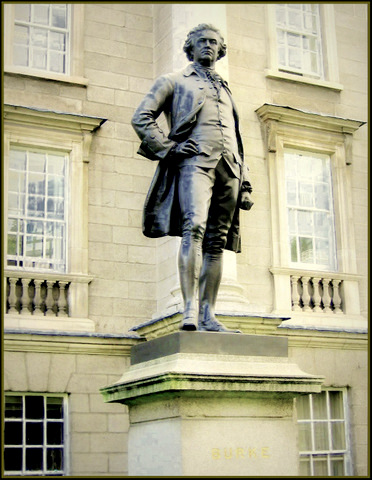
Edmund
Burke Statue, Trinity College, Dublin,
by John Henry Foley
"we
cherish them because they are prejudices"
"You see, Sir, that in this
enlightened age I am bold enough to confess, that we
are generally men of untaught feelings; that instead
of casting away all our old prejudices, we cherish them
to a very considerable degree, and, to take more shame
to ourselves, we cherish them because they are prejudices;
and the longer they have lasted, and the more generally
they have prevailed, the more we cherish them. We are
afraid to put men to live and trade each on his own
private stock of reason; because we suspect that this
stock in each man is small, and that the individuals
would do better to avail themselves of the general bank
and capital of nations and of ages. Many of our men
of speculation, instead of exploding general prejudices,
employ their sagacity to discover the latent wisdom
which prevails in them. If they find what they seek,
and they seldom fail, they think it more wise to continue
the prejudice, with the reason involved, than to cast
away the coat of prejudice, and to leave nothing but
the naked reason; because prejudice, with its reason,
has a motive to give action to that reason, and an affection
which will give it permanence. Prejudice is of ready
application in the emergency; it previously engages
the mind in a steady course of wisdom and virtue, and
does not leave the man hesitating in the moment of decision,
sceptical, puzzled, and unresolved. Prejudice renders
a man’s virtue his habit; and not a series of
unconnected acts. Through just prejudice, his duty becomes
a part of his nature."
-Edmund Burke, REFLECTIONS ON THE
REVOLUTION IN FRANCE, and on the Proceeding in Certain
Societies in London Relative to That Event in a Letter
Intended to Have Been Sent to a Gentleman in Paris,
1790
_____
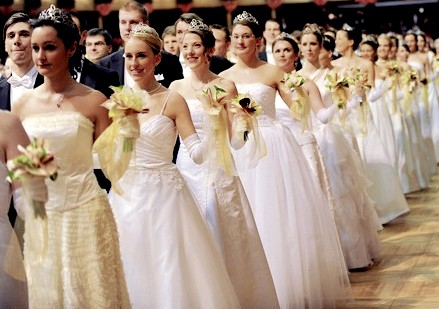
Vienna, Austria
“Envisioning success
brings you an inspiring image,
but bringing that image to life requires action.”
-Dr. Larina Kase
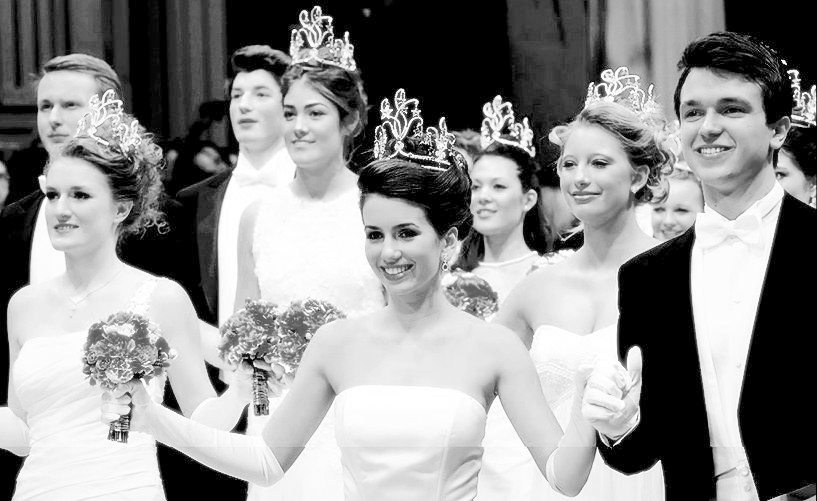
_____
"[Society], politically regulated, is a state contradistinguished
from a state of nature, and any attention to that coalition
of interests which makes the happiness of a country
is possible only to those whom enquiry and reflection
have enabled to comprehend it."
-Dr. Samuel Johnson, LIVES OF THE ENGLISH POETS,
1779-1781
_____
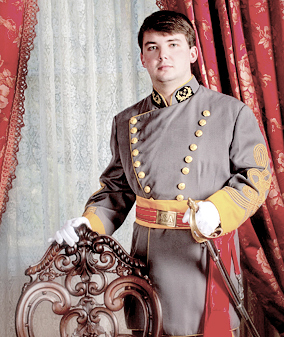
Natchez,
Mississippi, 2014
_____
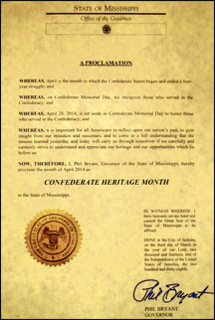
Jackson, Mississippi, March 3, 2014
____
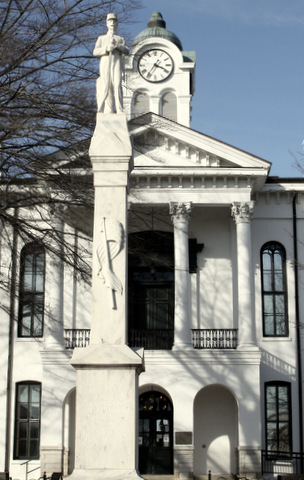
Confederate Monument, Courthouse Square,
Oxford, Mississippi
In Memory of the Patriotism of the
Confederate Soldiers of
Layfayette County, Mississippi.
They Gave Their Lives to
a Just and Holy Cause.
A Tribute to our Confederate Dead
by Their Surviving Comrades.
The Sons of Veterans Unite in this
Justification of Their Fathers' Faith.
A Loving Tribute to Our
Dead Heroes.
By the Patriotic Daughters of
Lafayette County.
_____
_____
From THE LAST CHRISTIAN IN ALABAMA,
draft manuscript:
The professor kept his Neo-Manichean credentials before
us every chance he got. This was deemed an intolerable
act of disrespect by those in power, who, obsessed
with their own irrational fears and untreated anxieties,
insisted that 'We are all one' and were addicted to
expertly injecting the words "us," and "unity,"
and "together,"
and "everyone," and "shared,"
and "'we must" into their jarringly paranoid
propaganda.
The ever-present, never-ending battles between true
Good and lying Evil gave him ample opportunities for
making his dividing, or as they called it, "divisive,"
evaluations. He would say, 'Praise Merciful Holy-
there's a rare victory for Christ," and then
he would see the next thing, and say, 'Look at that,
still yet another victory for Satan.'
Once we recognized that the place was swarmed by the
next things, we began to earn our own credentials. We
are ever appreciative that he not only showed us how,
but taught us why. But we are still bothered by the
fact that he was the only one.
_____
From http://www.breitbart.com/Big-Government/2014/03/10/With-Common-Core-in-Trouble-Obama-s-Social-Justice-Education-Agenda-To-Be-Achieved-With-New-Dumbed-Down-SAT;
March 10, 2014:
The current executive
with MonolithIC 3D Inc. and co-author with Professor
Sandra Stotsky of “Common Core’s Standards
Still Don’t Make the Grade” (Pioneer Institute,
2010), exposed the primary social engineering goal of
the SAT changes.
“This
charade is bound to explode, unless a way is found to
force regular state colleges to accept the low-level
college-readiness offered by the Common Core,”
Wurman said. “The goal is, as the College Board
says, to ‘bridge economic and demographic barriers’
rather than assure that college freshmen are adequately
prepared.”
“So, in the name of this ‘social justice,’
the SAT is now being dumbed down so it will find more
students ‘ready,’ whether truly ready or
not,” he said.
_____
From http://www.civilrights.org/archives/2014/1436-ccss-nyt-ad.html;
May 20, 2014:
On Monday, The Leadership Conference joined with several
other civil rights and education groups in signing onto
a full-page
ad placed in the New York Times to commemorate the
60th anniversary of the landmark school desegregation
decision in Brown v. Board of Education and to demonstrate
their strong, united support for the equitable implementation
of the Common Core State Standards.
The
Brown decision was handed down on May 17, 1954. In
his opinion for the unanimous Supreme Court, Chief
Justice Earl Warren wrote that it is “doubtful
that any child may reasonably be expected to succeed
in life if he is denied the opportunity of an education…a
right which must be made available to all on equal
terms.”
Echoing
Warren, the groups said in a joint statement that
while Brown “ended legal segregation in America’s
public schools in May 1954, separate and unequal resources
and expectations have remained a reality for many
students. Still, we believe that the opportunities
for a bright future and a fair chance to achieve their
potential are achievable for all children –
and the responsible implementation of the Common Core
State Standards is a critical piece in the continuing
fight for equity.”
The
Common Core State Standards are a set of high-quality
math and English language arts standards developed
by state education officials across the country to
ensure that students graduate with the knowledge and
skills they need to be college or career-ready. Currently,
44 states and the District of Columbia have adopted
the standards and are working to implement them.
The
organizations featured in the ad include the National
Urban League, National Action Network, National Council
of La Raza, NAACP, Campaign for High School Equity,
Alliance for Excellent Education, National Coalition
on Black Civic Participation, NALEO Educational Fund
and National Indian Education Association.
______
From http://cnsnews.com/news/article/barbara-hollingsworth/southern-poverty-law-centers-criteria-naming-hate-groups;
March 7, 2014:
Noting that nearly every news article
mentioning Public Advocate refers to it as a “hate
group,” King added: “My question is: What
does that mean?
“This is not some guy in camo advocating
the overthrow of the government in a compound in Iowa.
He has views on traditional values and marriage. I want
to know why that is hate. I want to know what the criteria
is. What does it mean to be a hate group?”
King is requesting all research, electronic or written
correspondence, witness testimony, and "all staff
memorandums and writings of any kind," including
minutes and videos of staff meetings, that were used
by SPLC to come to the conclusion that Public Advocate
is a "hate group."
_____
From http://www.lohud.com/story/news/local/westchester/2014/03/09/westchester-democrats-urge-action-wake-racist-slurs;
March 9, 2014:
State Sen. Greg Ball, R-Patterson, also
weighed in by issuing a statement last week that read,
in part, "Let it be clear, Mount Vernon is equally
responsible for the toxic environment that was unfortunately
created. Yet unlike Mahopac, Mount Vernon has yet to
take action to hold their fan base and students accountable.
Two wrongs never make a right, yet unlike Mount Vernon,
Mahopac immediately took the accusations seriously and
the district has used their appropriate authority to
hold the individuals involved accountable."
____
From http://www.breitbart.com/Big-Government/2014/03/10/States-That-Struggle-Most-With-Income-Inequality-Voted-For-Obama-Study;
March 10, 2014:
Nonetheless, the White House is determined
to make income inequality a pivotal issue for years
to come, with President Obama calling it "the defining
challenge of our time." Press Secretary Jay Carney
denied that the Obama administration's policies damaged
income inequality when confronted with the question,
suggesting instead that the uptick in the wage gap began
under President George W. Bush. Not all on staff stuck
to the message so strictly; one pollster publicly described
income inequality as an issue that was "a bit overhyped."
_____
From http://www.pasadenastarnews.com/social-affairs/20140308/asians-rally-against-sca-5-call-it-revival-of-affirmative-action;
March 8, 2014:
Asians in the San Gabriel Valley and
beyond joined forces Friday to rally against a proposed
Senate constitutional amendment that they said would
punish their children for working hard to achieve the
American Dream.
---
“This kind of program needs to be established
at the high school level, not at the university level,”
she said. “It has the possibility of encouraging
administrators and officials to discriminate based on
skin color. It has a negative impact on high-performing
students and Chinese students. We need to put merit
and academic performance as a priority.”
---
“What makes a society and a country better is
its diversity and how we interact,” Hernandez
said. “Look at the examples of how we purposely
try to diversify. Look at Covered California. It would
be discriminatory if we did not try to create communities
of interest.”
_____
"Living Word, I affirm that all things come from
You and through You and to You. You have made the cosmos
and all that is in it, and You hold all things together.
All truth is derived from You, and You tell me to love
You with all my mind as well as all my heart. May I
renew my mind with the timeless truths of Your Word
and cultivate an ever clearer biblical worldview, so
that my thinking will be in accordance with truth. Give
me the wisdom to test everything according to the truths
of Scripture so that I will think clearly and make sound
judgments that are not based on emotions or wrong thinking
but on the sure foundation of the written and living
Word. I know that only as I think biblically will I
be in a position to make the right decisions about my
circumstances."
-Dr. Ken Boa, Reflections, March 2014
_____
http://www.nationaljournal.com/tech/here-s-how-nasa-thinks-society-will-collapse-20140318;
March 18, 2014:
"Two important features seem to appear across
societies that have collapsed," reads the study.
"The stretching of resources due to the strain
placed on the ecological carrying capacity and the economic
stratification of society into Elites and Masses."
In unequal societies, researchers said, "collapse
is difficult to avoid.... Elites grow and consume too
much, resulting in a famine among Commoners that eventually
causes the collapse of society."
---
So how do we save ourselves? "Collapse can be avoided,
and population can reach a steady state at the maximum
carrying capacity, if the rate of depletion of nature
is reduced to a sustainable level, and if resources
are distributed equitably," reads the report.
_____
http://miami.cbslocal.com/2014/03/18/fmu-student-allegedly-lured-into-dorm-room-beaten;
March 18, 2014:
Florida Memorial University student Kameron Moore spent
a night in the emergency room after she says at least
five girls jumped her in a dorm room.
“They was cheering on the couch. Saying ‘get
her! Get her! Get her!” said Moore.
Moore, a freshman, said it started when she returned
from spring break.
“I came back and all my stuff was missing and
my room was messed up,” said Moore. “They
took my money and they ate all my snacks and stuff.”
---
“What happens if this do happen to another child.
That child may not come out and say what happened. She
might not make it out to say anything,” McDuffie
said.
“They could have killed her” Moore is afraid
to return to school after the incident claiming, “It’s
not safe.”
_____
http://www.nationaljournal.com/next-america/health/the-root-causes-behind-many-health-problems-may-surprise-you-20140313;
March 13, 2014:
From her office in the peaceful and picturesque
Laurel Heights neighborhood, Paula Braveman directs
the Center on Social Disparities in Health at the University
of California (San Francisco) and writes prolifically
on the links between class, race, and health. She spoke
recently to National Journal about the complex relationships
among opportunity, biology, personal responsibility,
and the way Americans live and die.
---
I think it's silly to say there's no role for personal
responsibility. Even those of us who are pretty privileged
know that it's hard eating right, exercising. But the
mistake is neglecting to ask, what is it that shapes
personal behaviors? We have a huge body of literature
that documents how behavior is shaped by the contexts
in which people live and work. And then how those contexts
are shaped by their opportunities. Do we think it's
an accident that [good] behaviors are arrayed socioeconomically?
Where does this all begin? Is it the choice of a child
to be born into a poor family?
_____
From http://www.chron.com/news/houston-texas/houston/article/Principal-who-told-kids-not-to-speak-Spanish-will-5327528.php;
March 18, 2014:
The Hempstead school board won't renew the contract
of a principal who instructed her students not to speak
Spanish, in a rapidly-evolving district where more than
half of the students, like many Texas schools, are now
Hispanic.
Hempstead Middle School Principal Amy Lacey was placed
on paid administrative leave in December after reportedly
announcing, via intercom, that students were not to
speak Spanish on the school's campus. The Hispanic population
of the rural area, roughly 50 miles northwest of Houston,
is growing quickly, and Latino advocates say that it's
important to allow Spanish in public schools.
_____
From http://www.healthcentral.com/schizophrenia/cf/slideshows/10-signs-you-may-be-in-an-emotionally-abusive-relationship?ap=825#slide=8;
Jan 8, 2013 (updated Jan 25, 2014):
An abuser is a grand manipulator and will sulk,
threaten to leave, and emotionally punish you for not
following their idea of how things should be. An abuser
will try to make you feel guilty any time you exert
your will and assert what is right for you. At times
the abuser may appear to be apologetic and loving; the
abuse begins again when the abuser feels he or she has
your forgiveness.
_____
http://www.nytimes.com/2014/03/15/your-money/for-boarding-schools-an-evolving-financial-aid-philosophy.html;
March 15, 2014:
Admission to the country’s top preparatory high
schools has always been fiercely competitive. But today,
with the price of some private boarding schools like
Tabor topping $50,000 a year, affluent families are
also lining up for aid — and sometimes shutting
out those further down the income ladder. The reality
has affected the whole philosophy behind financial aid.
“We used to be trying to open our doors to all
students,” said Mr. Marshall, who has worked at
independent schools for nearly four decades. “Now,
it’s ‘Who can afford us?’ ”
That’s not many families. After paying $200,000
for four years of boarding school, parents are looking
at another $200,000 or more for college. And that is
for one child.
The magnitude of these costs mean that even parents
with annual incomes of more than $300,000 are applying
for financial aid and receiving it. Both Tabor and Webb
said that about a third of students received aid.
_____
From http://www.michigancapitolconfidential.com/19913;
March 19, 2014:
The teachers union contract in Ferndale
Public Schools in Oakland County gives "special
consideration" to applicants who are of "the
non-Christian faith."
_____
From http://cnsnews.com/news/article/jesse-jackson-protesting-tech-industrys-lack-diversity;
March 18, 2014:
Jackson's strategy borrows from the traditional civil
rights era pl "Technology is supposed to be about
inclusion, but sadly, patterns of exclusion remains
the order of the day," Jackson wrote in a letter
released Monday to Apple Inc., Twitter Inc., Facebook
Inc., Hewlett-Packard Co., Google Inc. and others.
____
From http://www.beyondprejudice.com;
March 20, 2014:
Prejudices exist. It is an undeniable force
within our society, so prevalent that it can be found
within the most open-minded people and enlightened organizations,
subtly taking its toll despite the best of intentions.
To recognize the insidious and pervasive power of prejudice
is to take the first step toward defeating it. Assigning
blame or guilt, however, will often yield avoidance,
denial, and defensiveness. Understanding that prejudicial
thinking can be greatly diminished through commitment
and education will bring people together to successfully
solve this shared problem. It is toward this end that
Beyond Prejudices is committed.
_____
From http://rachelheldevans.com/blog/greg-boyd-interview-doubt;
circa 2013:
On top of this, those who embrace “certainty-seeking
faith” tend to become narrow-minded, for honestly
trying to see things from other peoples’ point
of view might lead them to question their faith and
thereby jeopardize their “salvation.“ In
fact, this model can easily lead people to develop learning
phobias, for if you dare to read broadly and learn to
see things from other people’s point of view,
you might uncovering facts that could shake your certainty
and thus displease God. I’m convinced this explains
why Christians, especially conservative Christians,
have a well-deserved reputation in the broader culture
for being narrow-minded.
_____
From http://www.atlantaprogressivenews.com/interspire/news/2014/03/19/39-arrested-in-moral-monday-protest-for-medicaid-expansion-in-georgia.html;
March 19, 2014:
"The Georgia state government's
right wing agenda promotes corporate greed over people's
needs; denies healthcare to over 600,000 uninsured Georgians;
has cut over $7.6 billion from public education
in the past 10 years; accelerates income inequality
by restricting worker's rights and benefits; attacks
women's reproductive freedom; promotes bigotry toward
the LGBT community, enables gun violence through Stand
Your Ground and Carry Guns Anywhere laws; and restricts
our voting rights," Moral Monday's press release
states.
"We are here today as the NAACP, as labor, as faith,
as a broad coalition of the 'ain't going to take it
no more.’ To say that we the people, finally means
we the people. Not just the well oiled and silk stocking…
persons of the elite, but everybody. The Legislators
and Governor have put politics over people for too long,"
Rev. Johnson said.
"Here is why they are desperate in passing local
legislation to reduce the number of seats on Boards
and Commissions, because they know a change is coming
to Georgia," Rev. Johnson said.
_____
"After the secret initiation at Sewanee, she gained
an unusual and always correct insight into other's motives
and traits. For instance, she looked at the protesters,
and spoke their aspirations, sounding as if in a trance:
'All we want and demand in life is an unfair advantage.'
Then she came out of whatever thing she was in, looked
at each of us straight in the eyes, and said, 'And they
say they deserve it and that we should pay for it. If
we say we want to keep what's ours, they'll deem us
offensive, call us hateful, and then attack.' "
-From THE LAST CHRISTIAN IN ALABAMA,
draft manuscript
_____
From
http://www.markey.senate.gov/news/press-releases/-sen-markey-and-rep-jeffries-introduce-legislation-to-examine-and-prevent-the-promotion-of-hate-crimes-and-hate-speech-in-media;
April 16, 2014:
Boston (April 16, 2014) – Senator
Edward J. Markey (D-Mass.), a member of the Commerce,
Science and Transportation Committee, introduced legislation
to examine the prevalence of hate crime and hate speech
on the Internet, television, and radio to better address
such crimes. The Hate Crime Reporting Act of 2014 (S.2219)
would create an updated comprehensive report examining
the role of the Internet and other telecommunications
in encouraging hate crimes based on gender, race, religion,
ethnicity, or sexual orientation and create recommendations
to address such crimes.
_____
From http://www.breitbart.com/Big-Government/2014/05/24;
5/24/2014:
Oklahoma-Lawmakers-Overwhelmingly-Vote-To-Repeal-Common-Core-Standards;
The Oklahoma legislature voted overwhelmingly Friday
night to repeal the Common Core math and English standards
for its state’s schools and to replace them with
standards developed by the state. The bill now heads
to Gov. Mary Fallin’s (R) desk for her signature.
|
___________
"We made our pilgrimage through Louisiana
and found a fine hand-embellished photographic copy of Sewanee's
'Sword Over the Gown' hanging in the Nicholls State University
Library in Thibodaux, Lafourche Parish. This is the locale of
Leonidas Polk's Leighton Plantation and his second St. John's
Church, which he organized in 1843 and consecrated in 1845. The
archivest told us that an Episcopalian student group had anticipated
that The University of the South would give to them its
own original portrait of the Bishop-General. Unlike Sewanee's
original painting, its gift of the copy to Nicholls State remains
unmolested by vandals. We told the archivest that Sewanee should
have made a copy for itself and given the original to the students,
because obviously Polk is safer in Louisiana than he is in Tennessee."
-From THE LAST CHRISTIAN IN ALABAMA, draft
manuscript
______
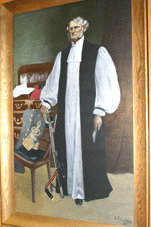
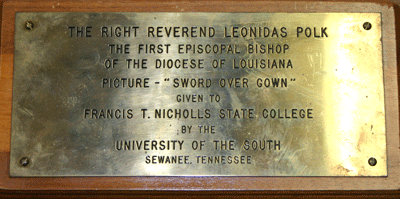

|
THE
RIGHT REVEREND LEONIDAS POLK
THE FIRST EPISCOPAL BISHOP
OF THE DIOCESE OF LOUISIANA
PICTURE - "SWORD OVER GOWN"
GIVEN TO
FRANCIS T. NICHOLLS STATE COLLEGE
BY THE
UNIVERSITY OF THE SOUTH
SEWANEE, TENNESSEE |
_____
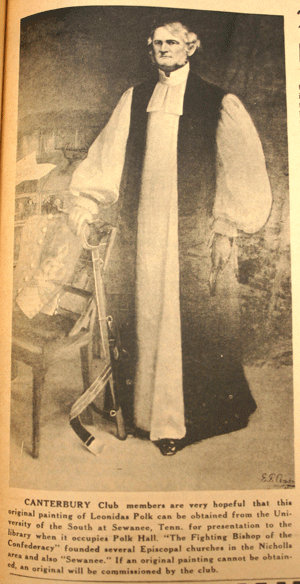
Canterbury Club members are very hopeful that this original
painting of Leonidas Polk can be obtained from the University
of the South at Sewanee, Tennessee. "The Fighting
Bishop of the Confederacy" founded several Episcopal
churches in the Nicholls area and also "Sewanee."
If an original painting cannot be obtained, and original
will be commissioned by the club.
-The Nicholls Worth, March 7,
1963 |
_____
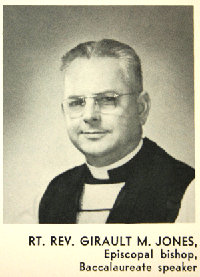
The Episcopal Diocese of Louisiana's
Diocesan Trustee of THE UNIVERSITY OF THE SOUTH,
circa 1965 Baccalaureate speaker at Nicholls State College
_____
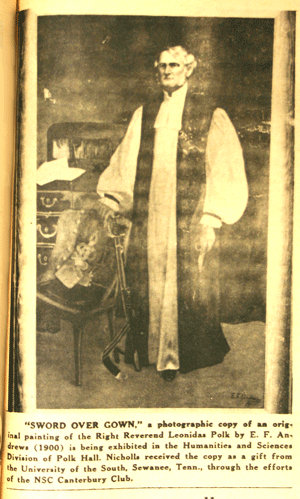
"Sword Over Gown," a photographic copy of
an original painting of the Right Reverend Leonidas
Polk by E.F. Andrews (1900) in being exhibited in
the Humanities and Sciences Division of Polk Hall.
Nicholls received the copy as a gift from the University
of the South, Sewanee Tenn., through the efforts of
the NSC Canterbury Club.
-The Nicholls Worth, February 10, 1966

|
_____
-
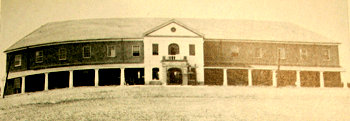


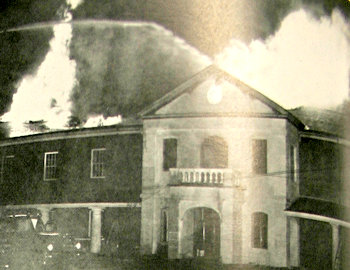
Polk Hall in flames
___________
Nicholls State as Memorial to Francis Redding Tillou Nicholls:
The university is named in honor of Francis Redding Tillou Nicholls,
who was born on Aug. 20, 1834, in Donaldsonville, La. After
graduating from West Point, he practiced law in South Louisiana.
He rose to the rank of brigadier general in the Civil War, during
which he was a prisoner of war and lost his left arm and leg.
He returned to his Napoleonville law practice, and the Louisiana
State Democratic Party nominated him for governor in 1876. His
election is generally considered to mark the end of Louisiana’s
political Reconstruction and the re-establishment of “Home
Rule.” During his second tenure as governor (1888–1892),
he successfully opposed the corrupt Louisiana Lottery Company.
After completing two gubernatorial terms, he was named chief
justice to the Louisiana Supreme Court. He retired to his Thibodaux
home in 1911 and died in 1912.
(Source: https://www.nicholls.edu/about/history-and-traditions;
viewed 3/21/2104)
_____
Born: August 20, 1834 in Donaldsonville, Louisiana
Political Affiliation: Democrat
Religious Affiliation: Episcopalian
Education: Jefferson Military Academy, U.S. Military Academy
at West Point and University of Louisiana (Tulane)
Career Prior to Term: Lawyer and Confederate General
How He Became Governor: Elected in 1876 bringing the Reconstruction
Era to a close; re-elected in 1888
Career after Term: Chief Justice and Associated Justice of the
Louisiana Supreme Court
Died: January 4, 1912 in Thibodaux, Louisiana
A
conservative Democrat who looked at the antebellum period as
a golden age in Louisiana, Francis R. T. Nicholls embodied the
"Bourbon" or planter approach to less government-low
taxes, few official services and little involvement by blacks
in the political processes.
Nicholls
became Governor as part of the national compromise of 1877.
In return for Louisiana's presidential electoral votes, Rutherford
B. Hayes recognized Nicholls' victory over Stephen B. Packard.
Nicholls
still had to determine which of the rival legislatures would
act as the official institution. Nicholls convinced some Republicans
to join his Democratic faction to give it the necessary quorum.
His
first administration battled three corrupt men with great power:
State Treasurer, Edward Burke; Samuel James, operator of the
convict lease system, and Lieutenant Governor Louis Wiltz, a
defender of the Louisiana Lottery.
Wiltz
presided over the Constitutional Convention of 1879 which reapportioned
the legislature, moved the capital back to Baton Rouge, lowered
taxes and cut a year from Nicholls' term.
Nicholls
fought the corrupt Louisiana Lottery throughout his second term.
He lost the battle when the state Supreme Court revoked his
dissolution of the lottery. Nicholls won the war, however, when
the Federal government outlawed the use of mails to sell lottery
tickets.
Nicholls
later became a Supreme Court Justice himself, serving until
his retirement in 1911.
He
died in Thibodaux in 1912.
(Source: http://www.sos.la.gov/HistoricalResources/AboutLouisiana/LouisianaGovernors1877-Present/Pages/FrancisTNicholls.aspx;
viewed 3/20/2014)
_____
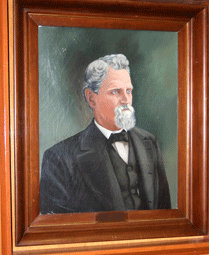
Nicholls State University Library
.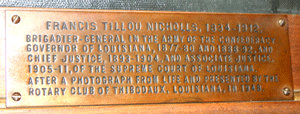
Francis Tillou Nicholls, 1834-1912,
Brigadier-General in the Army of the Confederacy. Governor of
Louisiana, 1877-80 and 1888-92,
and Chief Justice, 1892-1904, and Associate Justice, 1905-11,
of the Supreme Court of Louisiana.
After a photograph from life and presented by the Rotary Club
of Thibodaux, Louisiana, in 1948
_____
-
Nicholls, Guion, Polk, and THE
UNIVERSITY OF THE SOUTH:
"On April 26, 1860, F.R.T. Nicholls married Caroline Zilpha
Guion, the daughter of native Mississippian George Seth Guion.
G.S. Guion, of Huguenot
blood, was a sugar planter in Thibodaux, Louisiana, and
a close associate of Rt. Rev. Leonidas Polk. Guion was a founding
Trustee of THE UNIVERSITY
OF THE SOUTH
in 1857 while serving as a lay representative from the Diocese
of Louisiana. He had earlier donated the land upon which Bishop
Polk built St. John's Episcopal Church and is buried there with
his two wives in the cemetery."
-From The LAST CHRISTIAN IN ALABAMA,
draft manuscript
---
"As the fateful Civil War approached, Guion took the position
of immediate secession and supported not only Louisiana's removal
from the Union but also the inclusion of the Episcopal Diocese
of Louisiana in a newly formed 'National Protestant Episcopal
Church in the Confederate States of America.' ... Guion died
on October 30, 1861 ... 'one whose demeanor was composed and
diginfied... his manners as well as in his character... was
a model of the true Southern gentleman.' "
-David D. Plater, "THE REMARKABLY NEAT
CHURCH IN THE VILLAGE OF THIBODAUX:" AN ANTEBELLUM HISTORY
OF ST. JOHN'S EPISCOPAL CHURCH, 1994
_____
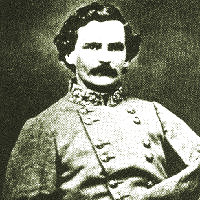
_____
Francis Redding Tillou Nicholls
1834 August 20 Born in Donaldsonville, Ascension
Parish, Louisiana. His father was Thomas Charles
Nicholls, a native of Maryland who practiced
law in Donaldsonville and later became a District
Judge and the First president of the Temperance
Society. His mother was Louisa Hannon Drake
of New York. Francis was educated at the Jefferson
Academy in St. James Parish.
1851
Appointed to the United States Military Academy
at West Point, New York.
1855
Graduates from the USMA 12th in a class of
34. Commissioned a brevet 2nd Lt. of the 2nd
Artillery Regiment and serves briefly at Fort
Myers, Florida and California.
1856
Resigns his commission due to health problems
and studies law at the University of Louisiana
(later Tulane U.) but leaves before he gains
a degree to pass the bar and open a practice
in Napoleonville.
1860
April 26 Marries Caroline Zilpha Guion. They
will have one son and five daughters.
1861
Helps to raise an infantry company and is
elected Captain. He is later appointed a Lt.
Col. of the 8th Louisiana Infantry Regiment
and will fight at the first battle of Manassas.
1862
May 25 Loses his left arm at the Battle of
Winchester.
1863
May 4 Loses his left foot at the Battle of
Chancellorsville where he commanded the 2nd
La. Brigade as a Brig. General.
1864
Defends Lynchburg, Virginia and then controls
the Conscript Bureau of the Trans-Mississippi
Department until the war ends.
1865
Resumes his law practice in Assumption Parish.
1876
Nominated for governor by the Democrats and
elected by a majority of 8,000 votes, but
the Republican controlled State Returning
Board cites irregularities and declares S.
B. Packard the winner. Nicholls takes his
seat, establishes a defacto government and
is later recognized as governor by the federal
government as part of the Compromise of 1877.
A
conservative Democrat who looked at the antebellum
period as a golden age in Louisiana, Francis
R. T. Nicholls embodied the "Bourbon"
or planter approach to less government-low
taxes, few official services and little involvement
by blacks in the political processes. Nicholls
became Governor as part of the national compromise
of 1877. In return for Louisiana's presidential
electoral votes, Rutherford B. Hayes recognized
Nicholls' victory over Stephen B. Packard.
Nicholls still had to determine which of the
rival legislatures would act as the official
institution. Nicholls convinced some Republicans
to join his Democratic faction to give it
the necessary quorum.
His
first administration battled three corrupt men
with great power: State Treasurer, Edward Burke;
Samuel James, operator of the convict lease
system, and Lieutenant Governor Louis Wiltz,
a defender of the Louisiana Lottery. Wiltz presided
over the Constitutional Convention of 1879 which
reapportioned the legislature, moved the capital
back to Baton Rouge, lowered taxes and cut a
year from Nicholls' term. Nicholls fought the
corrupt Louisiana Lottery throughout his second
term. He lost the battle when the state Supreme
Court revoked his dissolution of the lottery.
Nicholls won the war, however, when the Federal
government outlawed the use of mails to sell
lottery tickets. Nicholls later became a Supreme
Court Justice himself, serving until his retirement
in 1911. He died in Thibodaux in 1912
(Source: http://www.lascv.com/names.html;
viewed 3/21/2014)
_____
|
Francis Redding Tillou Nicholls was born on August 20,
1834, in Donaldsonville, Louisiana. He graduated from
West Point in 1855, and served for one year. He resigned
his commission and went to the University of Louisiana
to study law. Nicholls practiced law in Napoleonville
until the Civil War. After joining the Confederate forces
in 1861, he took part in the First Battle of Bull Run,
then in the Shenandoah Valley Campaign. In May of 1862,
he was wounded at Winchester, and had to have his left
arm amputated. On October 14, 1862, he was promoted
to brigadier general. Commanding the District of Lynchburg
until 1863, he later led a brigade in the Chancellorsville
Campaign. During that campaign, his left foot was ripped
off by a shell, and he was unable to return to combat
service. Nicholls was transferred to the Trans-Mississippi
Department to direct the Volunteer and Conscript Bureau
until the end of the war. After the Civil War ended,
he went back to practicing law. he ran for governor
in 1876, and refused to accept a defeat by his republican
opponent. The state had two administrations until the
federal government recognized Nicholls' administration
as the legitimate one. He was reelected in 1888, then
appointed to the Louisiana Supreme Court in 1892. Nicholls
died on his plantation near Thibodeaux, Louisiana, on
January 4, 1912.
(Source: http://www.historycentral.com/bio/CWcGENS/CSANickolls.html;
viewed 8/16/05)
_____
Louisiana Tourist and Development Commission:
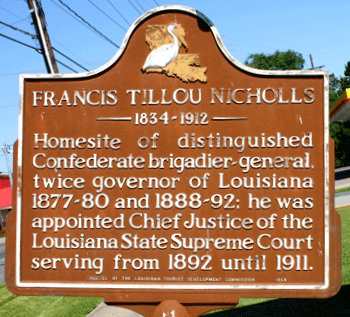
_____
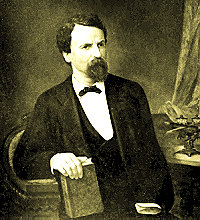
History of Nicholls State University
Nicholls State University, located in Thibodaux, Louisiana,
is a comprehensive, regional University serving south
central Louisiana. Tax supported and coeducational,
it opened its doors September 23, 1948, as Francis T.
Nicholls Junior College of Louisiana State University.
In
1956, the Louisiana Legislature separated Nicholls from
Louisiana State University and authorized it to develop
full four year curricula. Thus, in September 1956, the
former junior college began operation as Francis T.
Nicholls State College. It granted its first degrees
in May 1958. Act 93 of the State Legislature in 1970
changed the name to Nicholls State University.
The
210 acre campus, once part of historic Acadia Plantation,
fronts on Bayou Lafourche, about 50 miles southwest
of New Orleans and 60 miles southeast of Baton Rouge.
Nicholls
is located in the heart of Cajun country, an area rich
in tradition and culture. It is also located in the
heart of the Mississippi River delta, allowing easy
access to the river, its distributaries, Louisiana's
wetlands, and the Gulf of Mexico.
(Source: http://www.nicholls.edu/about/history.html;
viewed 8/16/05)
_____
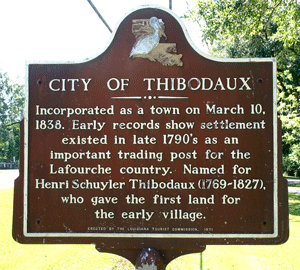
City of Thibodaux
Incorporated as a town on March 10, 1838. Early records
show settlement existed in late 1790's as an important
trading post for the Lafourche country. Named for Herni
Schuyler Thibodaux (1769-1827), who have the first land
for the early village. |
___________
St. John's Episcopal Church Cemetery, Thibodaux, Louisiana:
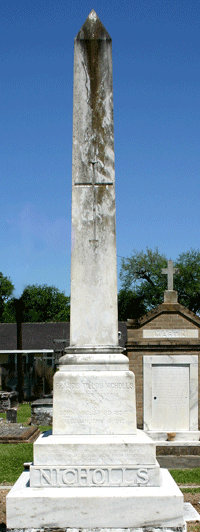
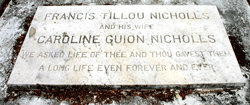
Francis Tillou Nicholls
and his wife
Caroline Guion Nicholls
We asked life of thee and thou gavest them
a long life even forever and ever.
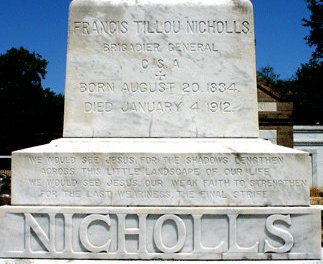
Francis Tillou Nicholls
Brigadier General
C.S.A.
+
Born August 20, 1834.
Died January 4, 1912.
"We would see Jesus for the shadows lengthen
across this little landscape of our life.
We would see Jesus this weak faith to strengthen
for the last weariness the final strife."
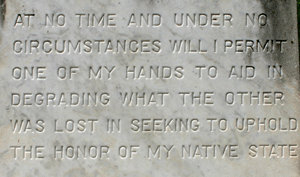
At no time and under no circumstances will I permit
one of my hands to aid in degrading what the other
was lost in seeking to uphold the honor of my native state.
___________
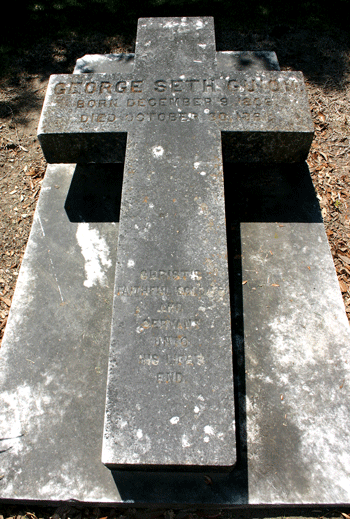
George Seth Guion
Born December 9, 1806
Died October 30, 1861
Christ's faithful servant
and soldier until the very end.
|
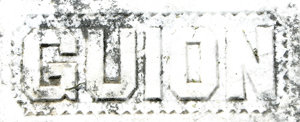
George Seth Guion, founding
Trustee of THE UNIVERSITY
OF THE SOUTH
and father-in-law of Francis T. Nicholls.
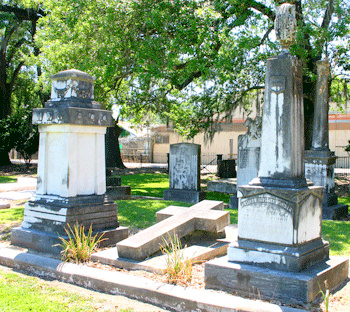
G.S. Guion and wives
|
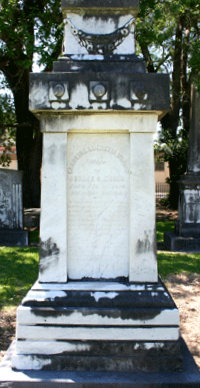
First wife
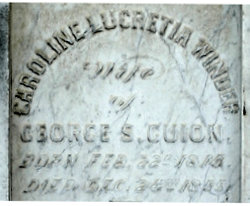
Caroline Lucretia Winder
Wife of George S. Guion
|
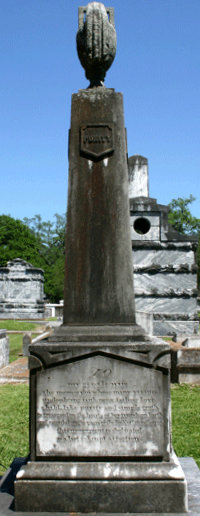
Second wife
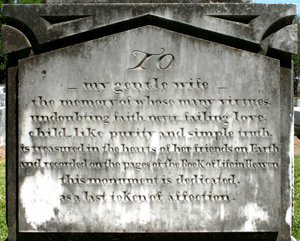
To my gentle wife- the memory of whose many virtues,
undoubting faith, never failing love, child-like purity
and simple truth is treasured in the hearts of her friends
on Earth and recorded on the pages of the Book of Life
in Heaven, this monument is dedicate as a last token
of affection. |
___________
Colonel Tillou as Nicholls State University mascot:
.gif.jpg)
Colonel Tillou
|
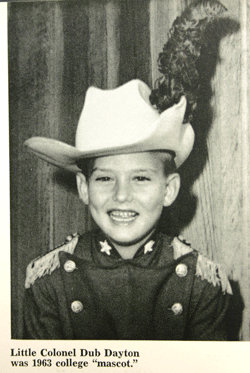
The Little Colonel
|

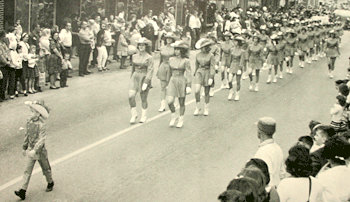
The Little Colonel leading the Little Colonels marchers.
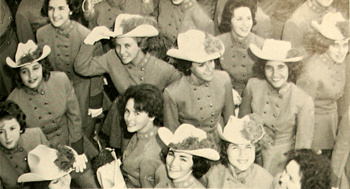
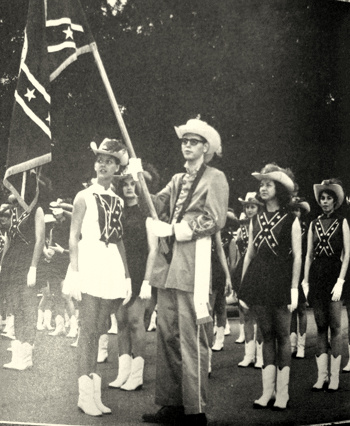
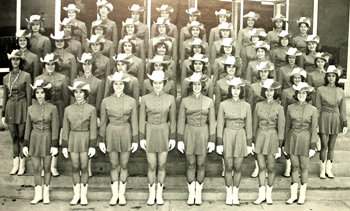
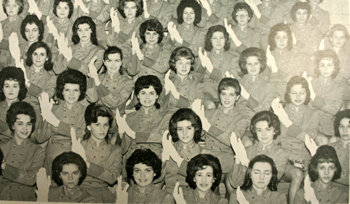
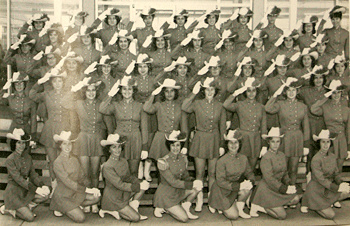
___________
| Anti-Tillouism:
5/3/01- Mascot will probably get facelift
(http://www.thenichollsworth.com/media/paper262/news/2001/
05/03
/News/Mascot.Will.Probably.Get.Facelift-75485.shtml)
11/13/03- NAACP President proposes mascot image
change
(http://www.thenichollsworth.com/media/paper262/news/2003/
11/13/News/
Naacp.President.Proposes.Mascot.Image.Change-557272.shtml)
2/10/04- Mean Mascot
(http://tonguetied.us/archives/000990.php)
2/8/04- "The Colonel" Faces a Major Reversal
(http://www.washingtonpost.com/ac2/wp-dyn?pagename=
article&contentId=A22328-2004Feb7¬Found=true)
2/16/04- A Brief History of the Nicholls Mascot
(http://www.nicholls.edu/admin/president/att-pm-2-16-04b.pdf)
2/16/04 -Presidents Message Re: Colonel Mascot
(http://www.nicholls.edu/admin/president/pm-2-16-04b.html)
2/19/04- Changes at Nicholls could spin out of control
(http://www.thenichollsworth.com/media/paper262/news/2004/02/19/
Lagniappe/Changes.At.Nicholls.Could.Spin.Out.Of.Control-611242.shtml)
4/1/04- Nichols State Pulls Mascot, Affirms Colonels
Name
(http://www.nicholls.edu/news/2004/081.html)
4/2/04- Nicholls State ditching mascot
(http://64.233.161.104/search?q=cache:WR83wLX2qogJ:www.wwltv.
com/local/stories/WWL040204nichollsmascot.e6dc59c5.html+tillou+%
2B+mascot&hl=en)
4/3/04- La. University to Retire Its Rebel-Style
Mascot
(http://64.233.161.104/search?q=cache:Or6BeiMy1ooJ:charleston.net/
stories/040304/wor_03mascot.shtml+tillou+%2B+mascot&hl=en)
4/5/05- Students Had No Say On Mascot
(http://www.nsuvomit.bravehost.com/lance.html)
4/7/05- New NSU pres forgets university's past
(http://www.heraldguide.com/editorial/april04/NSU.htm)
4/22/04- Houma Resident Uses History to Argue
Mascot Decision
(http://www.thenichollsworth.com/media/paper262/news/2004/04/22/Editorial/
Houma.Resident.Uses.History.To.Argue.Mascot.Decision-668642.shtml)
undated- Nicholls State University Mascot Under Siege
(http://www.bellaonline.com/ArticlesP/art16666.asp)
7/15/05- Mascots Not Only an Issue for Native Americans
(http://indianz.com/News/2005/009291.asp)
8/11/05- Political Correctness Hits Home
(http://64.233.161.104/search?q=cache:AfoeUVchDoAJ:
www.varvaro.com/+tillou+%2B+mascot&hl=en)
8/25/05- SGA to sponsor contest to select new
mascot
(http://www.thenichollsworth.com/media/paper262/news/2005/08/25/News/
Sga-To.Sponsor.Contest.To.Select.New.Mascot-969588.shtml)
|
___________
"The Southern scene, past and present, naturally affords
examples of the clash between tradition and antitradition, but
the conflict is all pervasive, though its manifestations are
often disguised."
-Donald Davidson, STILL REBELS, STILL YANKEES,
and Other Essays, 1957
___________
|
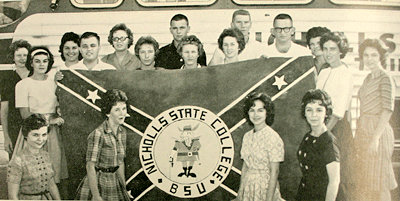

_____
"Modern
rationalism rejected the mythopoeic vision
that makes religion possible. Filtered through
these distortions, God is merely and amiable
expression. At the bottom of agrarianism is
a commitment to what Richard Weaver called
'the older religiousness.' In essence, it
is an ontology as well as a preference for
the agricultural life and an attitude that
rejects most versions of progressive, Faustian
myth. Ignoring the Agrarians, many politicians
and journalists predicted that the South would
lose its character after the conclusion of
the Second Reconstruction. They were guilty
of wishful thinking. . . . Certainly, this
conservatism is not going to hold that liberty
or human rights can exist apart from the context
in which they are created and readily subsist:
it is not going to accept that such values
can be posited as anterior to their historical
development in particular circumstances."
-Mel Bradford, "Doctrine
Rooted in Memory," Southern Partisan,
Volume XXV, Number 1, May, 2006
|
|
___________
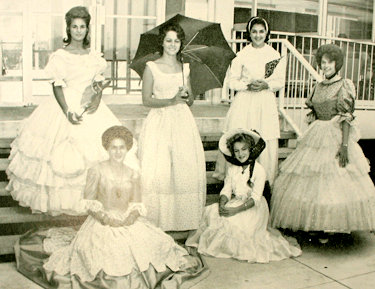
___________
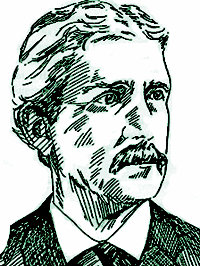
Eliphalet Fraser Andrews,
painter of first "Sword Over the Gown"
|
Biography
from http://www.marietta.edu/alumni/honor/2002/andrewse.html;
viewed 9/25/05:
After graduating in 1853 from Marietta College, where
he received his initial art training, Eliphalet Andrews
studied with Ludwig Knaus at Dusseldorf Academy in Germany
and with Leon Bonnat at Ecole de Beaux-Arts in Paris.
Andrews returned to his hometown in Steubenville, Ohio,
to open his first studio in 1860. Known for painstaking
detail in his portraits, he specialized in large-scale
paintings. He painted portraits of two Ohio governors,
including his friend, Rutherford B. Hayes. Following
Hayes' election to the U.S. Presidency, Andrews moved
to Washington, D.C., in 1876. There he painted a full
length portrait of President Hayes which found a home
in the White House, as did renderings of President Thomas
Jefferson and First Ladies Martha Washington and Dolley
Madison. Several of Andrews' works were exhibited at
the nation's 1876 Centennial Exhibition in Philadelphia.
In 1877, at the behest of William Wilson Corcoran, banker
and art patron, Andrews conducted a series of informal
drawing classes at the Corcoran Gallery of Art. Ten
years later, when the Corcoran School of Art was established,
Andrews was named director, serving until 1902.
Many of his presidential portraits now hang in the collections
of the National Museum of Art, the White House, the
United States Capitol, the Corcoran Gallery of Art,
the Ohio State House and in several Steubenville municipal
buildings. Eliphalet F. Andrews died in Washington,
D.C., in 1915 and was returned for burial to Union Cemetery
in Steubenville, Ohio.
_____
Eliphalet Fraser Andrews
Also Known as: Eliphalet F. Andrews
Born: Steubenville, Ohio 1835
Died: Washington, District of Columbia 1915
Biography
Born June 11, 1835, in Steubenville, Ohio. Graduated
from Marietta College, Ohio. Married Emma Stewart, 1857.
Studied with Lüdwig Knaus and Heinrich Mücke
in Düsseldorf, 1859–63, and with Léon
Bonnat in Paris, 1863. In Steubenville, 1863–76.
Visited New York, 1863, and Düsseldorf and Paris,
1873. Lived in Washington, D.C., 1876–1915. Gave
free instruction at the Corcoran Gallery of Art, 1877–87.
Served as director and instructor of art at the Corcoran
School of Art, 1887–1902. Visited Paris, 1888,
1891. Married Marietta Minnigerode, 1895. Had a studio-house
on Scott Circle, and a country house, "Vaucluse,"
in Alexandria, Va. Died March 19, 1915, in Washington,
D.C.
-C.Andrew J. Cosentino and Henry H. Glassie, The
Capital Image: Painters in Washington, 1800–1915,
1983
_____
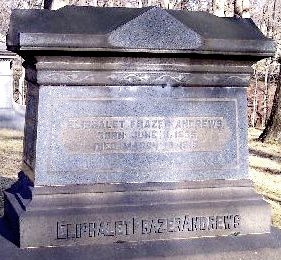
Union Cemetery, Stubenville, Ohio |
___________
"General Underwood will bring his portrait
gallery of famous Confederate Generals to
the Louisville Reunion May 30 - June 3."
-"The Lost Cause: A Confederate War Record,"
Vol. III, No 7., Louisville, KY., February, 1900
_____
"The 'Lost Cause' is a Monthly Illustrated
Journal of History, devoted to the collection and preservation
of the Records of the Confederate States, Humorous Anecdotes,
Reminiscences, Deeds of Heroism, also devoted to the works and
interest of the 'DAUGHTERS OF THE CONFEDERACY.' "
-Ibid.
_____
"South Carolina Legislature passed a bill to erect a monument
at Chickamauga Park."
-Ibid.
_____
"MACON, Ga., Jan 19- For the first time in its history,
Macon has observed the birthday of "Robert E. Lee. The
school children were given a half holiday, and all of the banks
and other public buildings except the post-office were closed.
During the afternoon there was a parade of the local militia
organizations, and at night appropriate exercises were carried
out under the auspices of the Daughters of the Confederacy."
-Ibid.
_____
"The March edition of the "Lost Cause" will be
an official Confederate Reunion edition. It will be increased
in size and full of interesting information of the Reunion."
-Ibid.
_____
"The souvenir badge of the Confederate Reunion at
Louisville, May 30 - June 3, will be a celluloid canteen with
the profile of Winnie Davis, daughter of the Confederacy, on
one side and the Winnie Davis rose on the other."
-Ibid.
_____
"The Alabama Historical Society has requested the
family of Maj.-Gen. Wm. Allen, of Montgomery, to furnish his
portrait for preservation among the valuable possessions of
the society at Tuscaloosa. The order has been given to Miss
Adelaide Everhardt, of Atlanta, a gifted young artist and personal
friend. General Allen entered the Confederate Army as lieutenant
of his company. Because of remarkable deeds of valor he arose
step by step to the rank of Major-General C.S.A. He died a few
years since at the home of his son at Florence, Ala."
-Ibid.
_____
"No man also having drunk old wine straightway desireth
new: for he saith, The old is better."
-Luke 5:39, KJV
_____
“But
I trust,” said Bertram, “I am encouraged to hope,
we shall all see better days. All our wrongs shall be redressed,
since Heaven has sent me means and friends to assert my right.”
“Friends indeed!” echoed the Dominie, “and
sent, as you truly say, by Him, to whom I early taught you to
look up as the source of all that is good.”
-GUY MANNERING, by Sir Walter Scott,
1815
_____
"Battle of Fontenoy," by Bartholomew
Dowling (1823-1863):
May
11, 1745
By our camp-fires rose a murmur
At the dawning of the day,
And the tread of many footsteps
Spoke the advent of the fray;
And as we took our places,
Few and stern were our words,
While some were tightening horse-girths,
And some were girding swords.
The trumpet-blast has sounded
Our footmen to array-
The willing steed has bounded,
Impatient for the fray-
The green flag is unfolded,
While rose the cry of joy-
"Heaven speed dear Ireland's banner
To-day at Fontenoy!"
We looked upon that banner,
And the memory arose
Of our homes and perish'd kindred
Where the Lee or Shannon flows;
We look'd upon that banner,
And we swore to God on high,
To smite to-day the Saxon's might-
To conquer or to die.
Loud swells the charging trumpet-
'Tis a voice from our own land-
God of battles! God of vengeance!
Guide to-day the patriot's brand;
There are stains to wash away,
There are memories to destroy,
In the best blood of the Briton
To-day at Fontenoy.
Plunge deep the fiery rowels
In a thousand reeking flanks-
Down, chivalry of Ireland,
Down on the British ranks!
Now shall their serried columns
Beneath our sabres reel-
Through the ranks, then, with the war-horse-
Through their bosoms with the steel.
With one shout for good King Louis,
And the fair land of the vine,
Like the wrathful Alpine tempest,
We swept upon their line-
Then rang along the battle-field
Triumphant our hurrah,
And we smote them down, still cheering,
"Erin, shanthagal go bragh."
As prized as is the blessing
From an aged father's lip-
As welcome as the haven
To the tempest-driven ship-
As dear as to the lover
The smile of gentle maid-
Is this day of long-sought vengeance
To the swords of the Brigade.
See their shatter'd forces flying,
A broken, routed line-
See, England, what brave laurels
For your brow to-day we twine.
Oh, thrice bless'd the hour that witness'd
The Briton turn to flee
From the chivalry of Erin
And France's "fleur de lis."
As we lay beside our camp-fires,
When the sun had pass'd away,
And thought upon our brethren
Who had perished in the fray,
We prayed to God to grant us,
And then we'd die with joy,
One day upon our own dear land
Like this of Fontenoy.
_____
"Weep not over me, my children,
for the death of a brave man gives new life to the young."
-"O Gero Demos," traditional Greek
song
_____
"Another achievement of Drayton's was the design of South
Carolina's state seal. Drayton designed one side of the state
seal, while Arthur Middleton designed the other. Drayton's side
features two trees — an upright palmetto tree over a fallen
English oak representing South Carolina's victory at Fort Sullivan
under Colonel William Moultrie on June 24, 1776."
(Source: http://www.draytonhall.org/research/people/drayton.html;
viewed 8/22/2010)
___________
-
"The
revival of the southern tradition, Davidson quickly
added, had to accompany the revival of southern society.
No longer could southern writers feel ashamed of their
heritage. No longer could they accept northern descriptions
of the South as a disgraceful example of bigotry and
fanaticism. No longer could they acquiesce in the progressive
formula of industrialism, liberalism, and public education.
They had to disavow the progressive ideal as the betrayal
of everything they cherished. There was no reason to
contort themselves into awkward conformity with a world
view they found repugnant."
-Mark G. Malvasi, THE UNREGENERATE
SOUTH: The Agrarian Thought of John Crowe Ransom, Allen
Tate, and Donald Davidson, 1997
|
___________
"The active functioning of the imagination is not the act
of a child, a kind of make believe; nor is it fantasy; nor is
it fancy. It is a mature and vigorous act of the mind and heart,
oriented toward reality, expanding the cosmos within which the
knowing mind dwells. . . . . Heroism is one of the fundamental
patterns built into all of us, a universal potentiality that
must, however, be ignited to be realized. America has been steeped
in the classical heroic tradition. But it can easily remain
merely latent if each generation simply starts over again without
the guidance of the classics. Admiration of the heroic principle
will surface from time to time in surprising ways; but without
a tradition of reverence it is likely to be deformed and misplaced.
A godlike aspiration, a selfless desire for a commitment to
a calling, a sense that honor is far more valuable than life-
these are aspects of the soul that must be awakened by a vision
of the high and the noble."
-Dr. Louise Cowan, "The Necessity of the
Classics," in ALL AMERICAN COLLEGES: Top Schools for
Conservatives, Old-Fashioned Liberals, and People of Faith,
2006
_____
From THE LAST CHRISTIAN IN ALABAMA,
draft manuscript:
The trouble started when our professor began teaching about
what was behind so-called 'education reforms.' He shared the
reformers' statements and made the forbidden connections and
conclusions about sinister intentions and the obviously horrid,
though self-justifying and perpetuating outcomes.
Some aggressive students, trained to "take action,"
much to the credit of the eductional establishment, became angry
that he was "only trying to foster division and undermining
progress by focusing too much attention on his version
of the past." They insisted that having and teaching "the
right feelings about social problems and best practices of self
expression" was more important than knowing "old facts
that don't matter anymore." (These students were all receiving
dubiously named scholarships and grants.)
"We must fight against historic injustices and commit more
will too promoting social consciousness and awareness off the
need for tolerance and inclusion" was their ready mantra.
Most of us just sat there quietly, especially those of us who
had next semesters financial aid request still pending, seeing
the obvious, but also fearing the too high costs of speaking
up in support of inquiry. We, in our own acquiescent way, were
also a credit to the establishment.
But as often happens when tacit permission is granted through
exposure and inquiry, a very few special students, clearly gifted,
and therefore oppressed, threw the yoke off their necks, and
defied the new rules by pursuing the matter on their own.
And that is how Edmund Burke Huey's work received its new attention.
These ambitious students discovered how progressive educational
reform was premised upon preventing "insidious" learning.
That's when they pledged themselves to more intentional insidiousness,
and upon encountering Dewey's agenda, soon elevated their dedication
to the level of "invidious," having transitioned in
steps from "unfortunate, wearisome, tensioned," and
"egregious." (I'll admit it was quite exciting, as
any controversy is at Sewanee. It gave us something new to talk
about before we got too drunk to talk.)
That's how they started making a difference where change was
most needed.
By the time they were lambasted and mocked as "extremist
reactionaries who are too conservative for today's Sewanee"
and openly attacked for "fearing change because it threatens
your privilege," they knew that God was on their side.
In a rare show of support, one of Sewanee's oldest told them,
"You are historic preservationists, which means you will
be accused of being 'on the wrong side of history,' which really
means, naturally, that you are on the better side with the angels."
---
"Both the inner utterance and reading aloud are natural
in the early years and are to be encouraged, but only when left
thus free, to be dominated only by the purpose of getting and
expressing meanings; and until the insidious thought of reading
as word-pronouncing is well worked out of our heads, it is well
to place the emphasis strongly where it really belongs, on reading
as thought-gettingy independently of expression." (Huey's
PSYCHOLOGY AND PEDAGOGY OF READING, 1908)
---
"It should constantly be remembered that there is no need
of hurrying the young child into the ability to read every kind
of printed matter at sight. The premature possession of this
power is in itself a temptation to use it with matter that is
wholly unnatural and unfitted for the child, and sprouts the
insidious thought of reading as a formal end in itself. His
reading vocabulary should grow mainly from his daily varying
and developing needs of self-expression, in the social activities
of the school. Whatever the children write for each other's
use, either in pictures or words, will be quickly read; and
new matter, whether a story of bear-hunting or directions about
making the new kind of kite, will be pretty promptly made out
if it appeals to an actual own interest, and the new written
forms will be added to the child's vocabulary."
(Ibid.)
_____
From https://www.classicalconversations.com/easyblog/the-educational-waters-in-which-we-swim-part-1;
viewed 3/24/2014:
[John] Dewey’s own philosophy was entirely humanistic,
which became evident in his educational philosophy. In 1933,
Dewey joined thirty-three prominent religious, educational,
and philosophical leaders in signing the original Humanist
Manifesto. In order to understand Dewey’s personal
philosophy, a brief look at the Humanist Manifesto
is in order.
The stated purpose of the Humanist Manifesto was to
establish a new religion, the religion of Humanism.
_____
From http://americanhumanist.org/Humanism/Humanist_Manifesto_I;
viewed 3/24/2014:
American Humanist Association: Promoting Good Without a God
Advocating progressive values and equality for humanists, atheists,
and freethinkers
---
-
-
Humanist Manifesto I
The Manifesto
is a product of many minds. It was designed to represent a developing
point of view, not a new creed. The individuals whose signatures
appear would, had they been writing individual statements, have
stated the propositions in differing terms. The importance of
the document is that more than thirty men have come to general
agreement on matters of final concern and that these men are undoubtedly
representative of a large number who are forging a new philosophy
out of the materials of the modern world.
-Raymond B. Bragg (1933)
The time has come for widespread recognition of the radical changes
in religious beliefs throughout the modern world. The time is
past for mere revision of traditional attitudes. Science and economic
change have disrupted the old beliefs. Religions the world over
are under the necessity of coming to terms with new conditions
created by a vastly increased knowledge and experience. In every
field of human activity, the vital movement is now in the direction
of a candid and explicit humanism. In order that religious humanism
may be better understood we, the undersigned, desire to make certain
affirmations which we believe the facts of our contemporary life
demonstrate.
There is great danger of a final, and we believe fatal, identification
of the word religion with doctrines and methods which have lost
their significance and which are powerless to solve the problem
of human living in the Twentieth Century. Religions have always
been means for realizing the highest values of life. Their end
has been accomplished through the interpretation of the total
environing situation (theology or world view), the sense of values
resulting therefrom (goal or ideal), and the technique (cult),
established for realizing the satisfactory life. A change in any
of these factors results in alteration of the outward forms of
religion. This fact explains the changefulness of religions through
the centuries. But through all changes religion itself remains
constant in its quest for abiding values, an inseparable feature
of human life.
Today man's larger understanding of the universe, his scientific
achievements, and deeper appreciation of brotherhood, have created
a situation which requires a new statement of the means and purposes
of religion. Such a vital, fearless, and frank religion capable
of furnishing adequate social goals and personal satisfactions
may appear to many people as a complete break with the past. While
this age does owe a vast debt to the traditional religions, it
is none the less obvious that any religion that can hope to be
a synthesizing and dynamic force for today must be shaped for
the needs of this age. To establish such a religion is a major
necessity of the present. It is a responsibility which rests upon
this generation. We therefore affirm the following:
FIRST: Religious humanists regard the universe as self-existing
and not created.
SECOND: Humanism believes that man is a part of nature and that
he has emerged as a result of a continuous process.
THIRD: Holding an organic view of life, humanists find that the
traditional dualism of mind and body must be rejected.
FOURTH: Humanism recognizes that man's religious culture and civilization,
as clearly depicted by anthropology and history, are the product
of a gradual development due to his interaction with his natural
environment and with his social heritage. The individual born
into a particular culture is largely molded by that culture.
FIFTH: Humanism asserts that the nature of the universe depicted
by modern science makes unacceptable any supernatural or cosmic
guarantees of human values. Obviously humanism does not deny the
possibility of realities as yet undiscovered, but it does insist
that the way to determine the existence and value of any and all
realities is by means of intelligent inquiry and by the assessment
of their relations to human needs. Religion must formulate its
hopes and plans in the light of the scientific spirit and method.
SIXTH: We are convinced that the time has passed for theism, deism,
modernism, and the several varieties of "new thought".
SEVENTH: Religion consists of those actions, purposes, and experiences
which are humanly significant. Nothing human is alien to the religious.
It includes labor, art, science, philosophy, love, friendship,
recreation--all that is in its degree expressive of intelligently
satisfying human living. The distinction between the sacred and
the secular can no longer be maintained.
EIGHTH: Religious Humanism considers the complete realization
of human personality to be the end of man's life and seeks its
development and fulfillment in the here and now. This is the explanation
of the humanist's social passion.
NINTH: In the place of the old attitudes involved in worship and
prayer the humanist finds his religious emotions expressed in
a heightened sense of personal life and in a cooperative effort
to promote social well-being.
TENTH: It follows that there will be no uniquely religious emotions
and attitudes of the kind hitherto associated with belief in the
supernatural.
ELEVENTH: Man will learn to face the crises of life in terms of
his knowledge of their naturalness and probability. Reasonable
and manly attitudes will be fostered by education and supported
by custom. We assume that humanism will take the path of social
and mental hygiene and discourage sentimental and unreal hopes
and wishful thinking.
TWELFTH: Believing that religion must work increasingly for joy
in living, religious humanists aim to foster the creative in man
and to encourage achievements that add to the satisfactions of
life.
THIRTEENTH: Religious humanism maintains that all associations
and institutions exist for the fulfillment of human life. The
intelligent evaluation, transformation, control, and direction
of such associations and institutions with a view to the enhancement
of human life is the purpose and program of humanism. Certainly
religious institutions, their ritualistic forms, ecclesiastical
methods, and communal activities must be reconstituted as rapidly
as experience allows, in order to function effectively in the
modern world.
FOURTEENTH: The humanists are firmly convinced that existing acquisitive
and profit-motivated society has shown itself to be inadequate
and that a radical change in methods, controls, and motives must
be instituted. A socialized and cooperative economic order must
be established to the end that the equitable distribution of the
means of life be possible. The goal of humanism is a free and
universal society in which people voluntarily and intelligently
cooperate for the common good. Humanists demand a shared life
in a shared world.
FIFTEENTH AND LAST: We assert that humanism will: (a) affirm life
rather than deny it; (b) seek to elicit the possibilities of life,
not flee from them; and (c) endeavor to establish the conditions
of a satisfactory life for all, not merely for the few. By this
positive morale and intention humanism will be guided, and from
this perspective and alignment
the techniques and efforts of humanism will flow.
So stand the theses of religious humanism. Though we consider
the religious forms and ideas of our fathers no longer adequate,
the quest for the good life is still the central task for mankind.
Man is at last becoming aware that he alone is responsible for
the realization of the world of his dreams, that he has within
himself the power for its achievement. He must set intelligence
and will to the task.
(Signed)
J.A.C. Fagginger Auer— Parkman Professor of Church History
and Theology, Harvard University; Professor of Church History,
Tufts College.
E. Burdette Backus— Unitarian Minister.
Harry Elmer Barnes— General Editorial Department, ScrippsHoward
Newspapers.
L.M. Birkhead— The Liberal Center, Kansas City, Missouri.
Raymond B. Bragg— Secretary, Western Unitarian Conference.
Edwin Arthur Burtt— Professor of Philosophy, Sage School
of Philosophy, Cornell University.
Ernest Caldecott— Minister, First Unitarian Church, Los
Angeles, California.
A.J. Carlson— Professor of Physiology, University of Chicago.
John Dewey— Columbia University.
Albert C. Dieffenbach— Formerly Editor of The Christian
Register.
John H. Dietrich— Minister, First Unitarian Society, Minneapolis.
Bernard Fantus— Professor of Therapeutics, College of Medicine,
University of Illinois.
William Floyd— Editor of The Arbitrator, New York City.
F.H. Hankins— Professor of Economics and Sociology, Smith
College.
A. Eustace Haydon— Professor of History of Religions, University
of Chicago.
Llewellyn Jones— Literary critic and author.
Robert Morss Lovett— Editor, The New Republic; Professor
of English, University of Chicago.
Harold P Marley— Minister, The Fellowship of Liberal Religion,
Ann Arbor, Michigan.
R. Lester Mondale— Minister, Unitarian Church, Evanston,
Illinois.
Charles Francis Potter— Leader and Founder, the First Humanist
Society of New York, Inc.
John Herman Randall, Jr.— Department of Philosophy, Columbia
University.
Curtis W. Reese— Dean, Abraham Lincoln Center, Chicago.
Oliver L. Reiser— Associate Professor of Philosophy, University
of Pittsburgh.
Roy Wood Sellars— Professor of Philosophy, University of
Michigan.
Clinton Lee Scott— Minister, Universalist Church, Peoria,
Illinois.
Maynard Shipley— President, The Science League of America.
W. Frank Swift— Director, Boston Ethical Society.
V.T. Thayer— Educational Director, Ethical Culture Schools.
Eldred C. Vanderlaan— Leader of the Free Fellowship, Berkeley,
California.
Joseph Walker— Attorney, Boston, Massachusetts.
Jacob J. Weinstein— Rabbi; Advisor to Jewish Students, Columbia
University.
Frank S.C. Wicks— All Souls Unitarian Church, Indianapolis.
David Rhys Williams— Minister, Unitarian Church, Rochester,
New York.
Edwin H. Wilson— Managing Editor, The New Humanist, Chicago,
Illinois; Minister, Third Unitarian Church, Chicago, Illinois.
_____
"There is no special connection between the unreal, the myth,
the fairy tale, and the play of mental imagery. Imagination is
not a matter of an impossible subject matter, but a constructive
way of dealing with any subject-matter under the influence of
a pervading idea. The point is not to dwell on the wearisome iteration
upon the familiar and under the guise of the object-lessons to
keep the senses directed at material which they have already made
acquaintence with, but to enliven and illumine the ordinary, commonplace,
and homely by using it to build up and appreciate situations previously
unrealized and alien. And this also is culture of imagination.
Some writers appear to have the impression that the child's imagination
has outlet only in myth and fairy tale of ancient time and distant
place, or in weaving egregious fabrications regarding sun, moon
and stars; and have even pleaded for a mythical investiture of
all 'science'- as a way of satisfying the dominating imagination
of the child. But fortunately these things are exceptions, are
intensifications, are relaxations of the average child, not his
pursuits."
-John Dewey, 1899, in JOHN DEWEY: Middle Works, 1884-1924,
Volume I, edited by Jo Ann Boydston, 1976, 2008
---
"When the social quality of individualized mental operations
is denied, it becomes a problem to find connections which will
unite an individual with his fellows. Moral individualism is set
up by the conscious separation of different centers of life. It
has its roots in the notion that the consciousness of each person
is wholly private, a self-inclosed continent, intrinsically independent
of the ideas, wishes, purposes of everybody else. But when men
act, they act in a common and public world. This is the problem
to which the theory of isolated and independent conscious minds
gave rise: Given feelings, ideas, desires, which have nothing
to do with one another, how can actions proceeding from them be
controlled in a social or public interest? Given an egoistic consciousness,
how can action which has regard for others take place?"
-
-John Dewey, DEMOCRACY AND EDUCATION: An
Introduction to the Philosophy of Education, 1916
---
"Think of accreditation now as a lucrative means of enforcing
John Dewey's social and political and economic transformation
vision."
-Robin S. Eubanks, CREDENTIALED TO DESTROY:
How and Why Education Became a Weapon, 2013
-
_____
"Any community that allows outsiders the right of dictating
how it should feel about its own fables, myths, and heroes,
about its very identity, that allows 'the other' to decide
what are acceptable and approved uses of imagination and genius,
is a community preparing itself for abjection, servitude,
and extinction. It will sit and do nothing while its own achievements
are stolen or start rotting away. Its own children will worship
foreign gods and sacrifice to idols of murder and self-hatred.
It will choose self-restraint when self-assertion is the only
answer. It is a community that has abandoned not just its
own future, but yours as well. If you are part of and support
such a community, you are sustaining your own failure and
meaninglessness. Is that your purpose? If you aren't
better than that, then you deserve what's coming."
-From THE LAST CHRISTIAN IN ALABAMA,
draft manuscript
_____
From http://www.parliamentofreligions.org/_includes/FCKcontent/File/TowardsAGlobalEthic.pdf;
viewed 6/11/2014:
IV. A Transformation of Consciousness!
Historical experience
demonstrates the following: Earth cannot be changed for
the better unless we achieve a transformation in the consciousness
of individuals and in public life. The possibilities for
transformation have already been glimpsed in areas such
as war and peace, economy, and ecology, where in recent
decades fundamental changes have taken place. This transformation
must also be achieved in the area of ethics and values!
Every individual has intrinsic dignity and inalienable rights,
and each also has an inescapable responsibility for what
she or he does and does not do. All our decisions and deeds,
even our omissions and failures, have consequences. Keeping
this sense of responsibility alive, deepening it and passing
it on to future generations, is the special task of religions.
-
We are realistic
about what we have achieved in this consensus, and so we
urge that the following be observed:
1. A universal
consensus on many disputed ethical questions (from bio-
and sexual ethics through mass media and scientific ethics
to economic and political ethics) will be difficult to attain.
Nevertheless, even for many controversial questions, suitable
solutions should be attainable in the spirit of the fundamental
principles we have jointly developed here.
2. In many areas
of life a new consciousness of ethical responsibility has
already arisen. Therefore we would be pleased if as many
professions as possible, such as those of physicians, scientists,
business people, journalists, and politicians, would develop
up-to-date codes of ethics which would provide specific
guidelines for the vexing questions of these particular
professions.
3. Above all,
we urge the various communities of faith to formulate their
very specific ethics: What does each faith tradition have
to say, for example, about the meaning of life and death,
the enduring of suffering and the forgiveness of guilt,
about selfless sacrifice and the necessity of renunciation,
about compassion and joy. These will deepen, and make more
specific, the already discernible global ethic.
-
-
In conclusion, we appeal to all the inhabitants of this
planet. Earth cannot be changed for the better unless the
consciousness of individuals is changed. We pledge to work
for such transformation in individual and collective consciousness,
for the awakening of our spiritual powers through reflection,
meditation, prayer, or positive thinking, for a conversion
of the heart. Together we can move mountains! Without a
willingness to take risks and a readiness to sacrifice there
can be no fundamental change in our
situation! Therefore we commit ourselves to a common global
ethic, to better mutual understanding, as well as to socially
beneficial, peace-fostering, and Earth-friendly ways of
life.
We invite all
men and women, whether religious or not, to do the same.
_____
From http://kairoscenter.org/mission; viewed 6/11/2014:
Kairos: the Center for Religion, Rights and Social Justice
at Union Theological Seminary aims to strengthen a
mutually reinforcing relationship between the world’s
religions and the global struggle for human rights and to
challenge efforts to create a conflict between them. Through
rigorous scholarship, applied research, reciprocal education,
and shared practice, it works to contribute to transformative
movements for social change that can draw on the strengths
of both religions and human rights.
Background
We live in a time of both tremendous possibilities and severe
challenges for the global struggle to advance dignity and
rights. Waves of mass movements, including the Saffron revolution
in Burma, the 2008 global food riots, the Arab Spring and
the 2011 Occupy protests, have given strong voice to widespread
popular demands for dramatically better lives for all people.
They have also further exposed and mobilized powerful economic,
political and social forces deeply opposed to change and
prepared to do what is necessary to stop it. The possibilities
demand action.
The challenges
require action based on the most serious reflection and
analysis. Religions play a critical role in these struggles.
Believers in religions are activists and often leaders in
these movements, finding in their different religious traditions
an inspiration and deep legitimacy for their demands and
a source of great and lasting strength for the hard fight
to realize them. At the same time opponents also often use
religious beliefs to oppose change, to create divisions,
justify inequality and oppression, and to fuel an antagonism
between religions and human rights.
___________
"I
have said that our great Southern writers are prophets
and guides. Faulkner has called them the pillars and props
to help man endure and prevail. Indeed, they are among
our best allies. They grow from the central best of our
culture; they articulate and dramatise it, and will help
to preserve it, if not in a realized future, then most
certainly for all time through the immortality of their
art. If in centuries to come, those who want to know who
we were and what we stood for, or to chart what has been
lost in our passing perhaps in order to reclaim it, will
only need read such works as Wendell Berry's novels The
Memory of Old Jack, and Remembering. For
to reclaim what has been lost, it is essential to know
what has been lost."
-James Everett Kibler, "Knowing Who
We Are: Southern Literary Tradition and the Voice in the
Whirlwind," 1995,1998
_____
In the second year prior to changing our historic name
into
the new and scandalously offensive "Sewanee: The
University of the South":
How
Shall We then Live?" Series with Wendell Berry
at The University of the South, 2002
Summer
Reading Focuses on Work of Wendell Berry
at The University of the South, 2002
_____
"Likewise, we students cannot expect the character
that we have formed in our years at Sewanee to remain
intact without any further effort on our part. As Wendell
Berry writes in one of his poems, 'Cleared, the field
must be kept clear' and in another 'Such a mind is as
much a predicament as such a place.' "
-Amy Metzger, Valedictory Address, The
University of the South, May 14, 2006
_____
| Wendell
Berry Honored at the Sesqui-Centennial Easter
Semester Opening Convocation at The University
of the South, Sewanee, Tennessee
"Berry, a proponent of traditional agrarian
values and environmental sustainability who operates
a working farm in Henry County, Kentucky, will
receive an honorary Doctor of Letters degree recognizing
his contributions to literature. Called 'the prophet
of rural America,' he has published 40 books of
fiction and nonfiction, 15 volumes of poetry and
numerous essays which have received wide critical
acclaim; in 1994, he was the recipient of the
Sewanee Review’s Aiken Taylor Award
in Modern American Poetry."
(Source: http://www2.sewanee.edu/communications/news?id=17485;
viewed January 22, 2007) |
____
From http://www.dissentmagazine.org/article/nature-as-an-ally-an-interview-with-wendell-berry,
Spring 2012; viewed 3/25/2014:
SL: Andrew Nelson Lytle in I’ll Take
My Stand writes something similar. I know you’ve
written about the Twelve Southerners, too. I wonder if
you ever think about region as useful to thinking about
agriculture, whether it obscures the way people think
about land and agriculture.
WB: I did talk about that in an essay on the
Civil War. The South is a region, but mainly in the political
sense. Geographically, ecologically, even historically,
the South has many regions. Kentucky has many regions.
But that won’t tell you how to farm. What we’re
talking about is adapting the farming to the farm, and
to the field. . . . John Todd wrote a sentence that has
mattered immensely to Wes Jackson and me: “Elegant
solutions will be predicated on the uniqueness of place.”
One of the wonders of modern agriculture is that agricultural
science— like all other science— is founded
on evolutionary biology, which sees local adaptation as
an absolute necessity for every species, but we have we
managed to exempt the human species.
SL: Is there anything else you’d like to add?
WB: Here’s the tragedy of agriculture in
our time. In the middle of the last century, Aldo Leopold
was writing and publishing on the “land community”
and ecological land husbandry. Sir Albert Howard and J.
Russell Smith had written of natural principles as the
necessary basis of agriculture. This was work that was
scientifically reputable. At the end of the Second World
War, ignoring that work, the politicians, the agricultural
bureaucracies, the colleges of agriculture, and the agri-business
corporations went all-out to industrialize agriculture
and to get first the people and then the animals off the
land and into the factories. This was a mistake, involving
colossal offenses against both land and people. The costs
have not been fully reckoned, let alone fully paid.
|
__________
"Whenever you make contact with the first episode of a consequential
trend, with the primary inspiration as expressed in the first
mention in the first reference, the first occurrence, the first
of firsts, you are making contact with the original spark that
rose up and became all the else. What you are witnessing in its
simplicity contains all the complexity to come. That's the code
you must seek. All subsequent imagination was fired from that
one spark. It is as holy as the first time Gabriel told Mary of
our Savior. When you seize it with your attention, when you pray
for its effect, when you focus on its grace, when you embrace
its courage, you are mystically uniting yourself with the conception
in a way that is invisible to others and gives you the gifts that
will be forever denied them. The spark runs along electric wire
of revolutionary breakthrough in triune understanding, acceptance,
and insight. That spark is a call to action and a corresponding
response in one combined instantaneous force.”
-SIR ABDIEL
attempts describing the annunciation effect, in THE LAST CHRISTIAN
IN ALABAMA, draft manuscript
-
___________
The Researched and Compiled Chronological
Origins of Blessed Sword Over the Gown
Revolutionary Breakthrough in Understanding
Whom We Are
Now Revealed to Sewanee for
the Very First Time
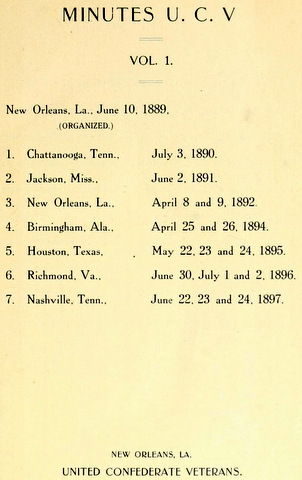
_____
New Orleans, 1890:
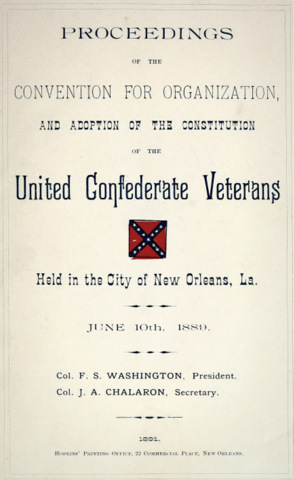
At Convention, June 10, 1890
---
Rev. Thomas R. Markham, of the Army of Tennessee, invoked
the divine blessing upon the assemblage and the cause for
which they gathered.
---
Biographical/Historical Note
Thomas Railey Markham was a Presbyterian minister
in New Orleans who joined the Confederate Army and
served as a chaplain in two regiments. Born in Fayette,
Mississippi, in 1828 to William F. and Susan Railey
Markham, he spent his childhood in Vicksburg. In 1850,
Markham entered Princeton Theological Seminary, where
he graduated as a Presbyterian minister. In 1856,
Markham became the pastor of Lafayette Presbyterian
Church in New Orleans and married Mary E. Searles
in 1858. Between 1862 and 1864, he enlisted in the
Confederate Army, serving as a chaplain until the
end of the Civil War. After the war, Markham returned
to Lafayette Presbyterian Church and continued his
activities as minister until 1894. The Hodgson family
were prominent and involved members of his congregation.
(Source: http://www.lib.lsu.edu/special/findaid/0250.pdf;
viewed 4/9/2014)
_____
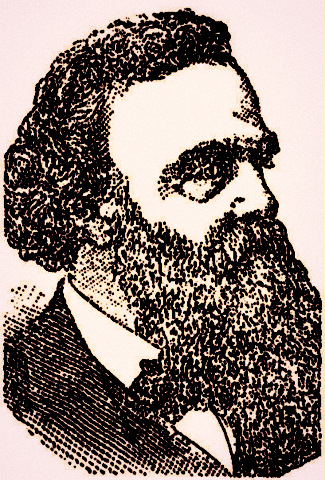
_______
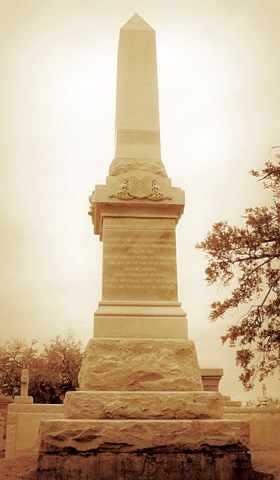
Metaire Cemetery
In Memory Of
Thomas Railey Markham D.D.
Born December 2, 1828
Died March 12, 1894
37
Years Pastor Of
The La Fayette Presbyterian Church
New Orleans, La
A True Man And Earnest Patriot
A Sound Divine, A Faithful Pastor,
Eloquent, Persuasive, Wise
Generous, Truthful, Brave,
Courteous, Gentle, Loving,
His Life Was A Benediction
And His Death A Triumph
Chaplain 1st Mississippi, Artillery Light
And Later, Of Featherstone’s Brigade, C.S.A.
After The War,
Chaplain Benev. Ass’n. Army Of Tenn., La. Div.
And Also At The Time Of His Death
Chaplain General,
United Confederate Veterans.
In Every Position, He Shared The Dangers,
Trials And Sufferings Of His Comrades.
To His Virtues As Priest And Patriot,
He Added The Loftiest Qualities Of The Citizen.
No Class, No Creed,
Bounded The Wide Circle Of His Sympathies
No Cause Hostile To Public Virtue
Or Public Interest Escaped His Censure
No Movement To Advance The Welfare
And Elevation Of His People Failed Of His Support.
_____
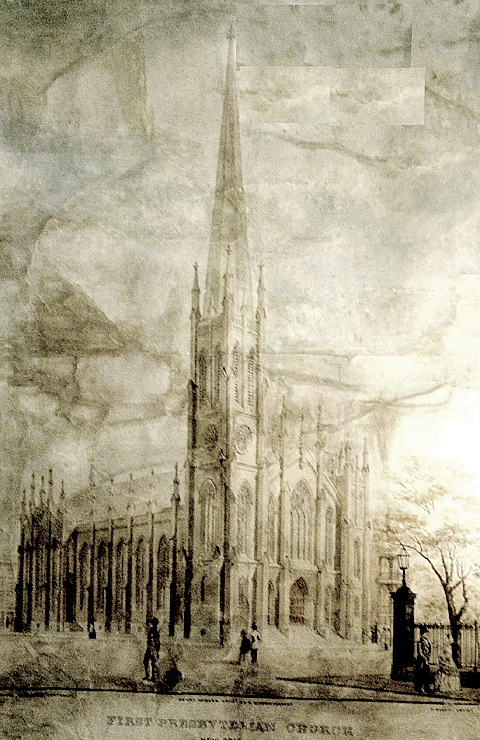
First Presbyterian Church, Lafayette Square, New Orleans |
-
_____
Chattanooga, 1890:
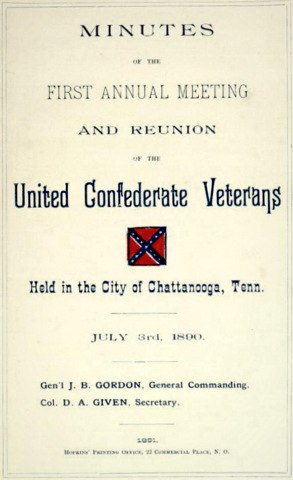
Proceedings, July 3, 1890
---
Gen. E. Kirby Smith was introduced, and after delivering a
telling speech, requested his staff to meet at the Read House
at 3 o'clock, p.m.
---
Col. J.F. Shipp announced an entertainment, to be given in
the present tent, at 8 o'clock, p.m., for the benefit of the
monument fund to the memory of the "Wizard of the Saddle"
-N.B. Forrest- and invited all present to attend.
---
Surgeon General, Joseph Jones, requested the medical medical
corps to meet at the Stanton House at 3 o'clock, p.m.
---
Election of officers for the ensuing year being in order,
the following comrades were elected by acclamation amidst
great enthusiasm, viz:
Jno B. Gordon, General commanding; W.L. Cabell, Lieutenant
General Trans-Mississippi Department;E. Kirby Smith, Lieutenant
General East of Mississippi Department.
---
The following resolution was offered by Col. D.A. Given, and
passed unanimously, viz:
Resolved, That the badge of the United Confederate
Veterans shall be the Confederate battle flag (square in shape),
with the initials U.C.V., the size of which to be
approved by the General commanding, and a record filed at
General Headquarters.
_____
From
the handbook and program of the First Annual United
Confederate Veterans Convention, July 3,4, 5, 1890;
splendidly prepared by committees of the citizens of
Chattanooga and of the N. B. Forrest Camp, United Confederate
Veterans:
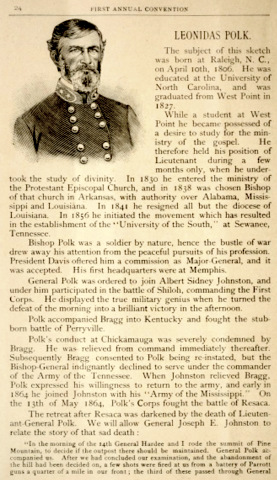
Continued:
Polk's chest, killing him instantly.
The event produced deep sorrow in the army, in every
battle of which he had been distinguished."
There was no braver soldier, more loyal citizen, more
earnest man than Leonidas Polk, Bishop and Lieutenant-General
of the Confederate Army.
---
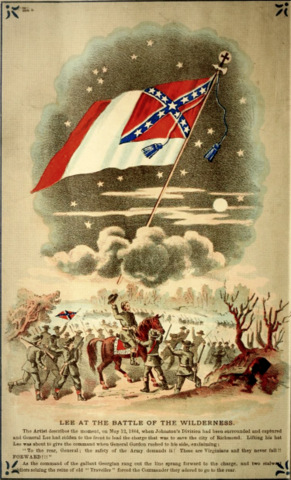
Lee at the Battle of the Wilderness |
-
_____
Jackson, 1891:
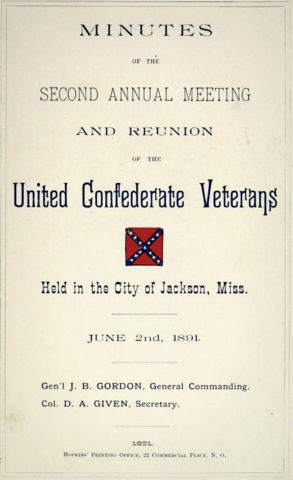
---
Proceedings,
June 2, 1891
---
By Lieut. Gen'l E. Kirby Smith seconded by Lieut. Gen'l W.L.
Cabell:
-
"Resolved,
That a Committee be appointed by the Gen'l Commanding to confer
with Mrs. Davis, in reference to the place to be selected for
the erection of a monument to the Hon. Jefferson Davis, our
late President and Commander-in-Chief."
The Gen'l Commanding to appoint said Committee whenever he thought
best. Reported favorably by Committee on resolutions, and unanimously
approved by the Committee.
---
Col. W.H. Rogers of the Army of Tennessee, nominated Gen'l E.
Kirby Smith for Lieut. Gen'l of the Dept. East of the Mississippi,
and he was unanimously re-elected.
-
_____
New Orleans, 1892:
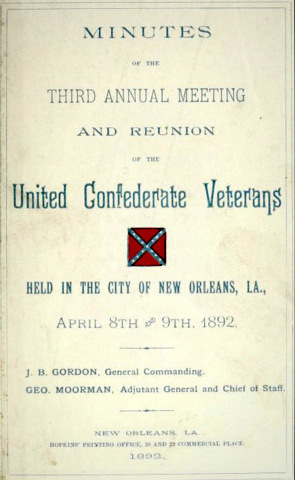
-
_____
-
---
April 8, 1892
---
At 10:45, Gen. Gordon, accompanied by his staff, Lieut. Gen.
W. L. Cabell, and other distinguished gentlemen, walked through
the open ranks of the assembled veterans and took seats on
the platform amidst deafening and prolonged applause. A few
minutes later Lieut. Gen. E. Kirby Smith appeared and was
received with hearty cheers.
Then the band played "Dixie," and the ''rebel yell"
which greeted the first few strains shook the house until
the rafters gave back answering echoes after the cheering
had ceased.
-
---
Chaplain General Thos. R. Markham then offered the following
prayer:
"Oh,
Lord, our Lord, whose name is excellent in all the earth and
who has set thy glory above the heavens. Thou doest thy will
in the armies of heaven and among the inhabitants of earth,
and none can stay thy hand or say unto thee what doest thou
? Thou stillest the noise of the seas, the noise of their waves
and the tumults of the people. And while, as to man, one generation
goeth and another cometh, and there is none abiding, thy dominion
is an everlasting dominion, and thy kingdom from generation
to generation. And while we do fade as a leaf and fall before
the moth, thou art the same and thy years shall not fail.
"And
as, to thee, we give adoration and homage, for to thee belongeth
power. We rejoice and give thanks that to thee also belongeth
mercy, for thou renderest to every man according to his work.
For knowing our frame and remembering that we are dust, thou
considerest the imperfections of our endeavors. Therefore, would
we ever fall into the hand of thy forbearing judgment and not
into the hands of man; for, like as a father pitieth his children,
so thou pitiest them that fear thee, and judgest them by the
Tightness of their aim and trueness of their purpose, whatever
their errors in spirit or act or their sins of omission or commission.
"And
looking back to that time, which, in our reunions, lives again,
having in them its annual resurrections, its re-embodiment and
renewal in our persons, we, thy servants, (and are not all thy
servants the servants of thy will?) who were then constrained
to say Verily thou art a God that hidest thyself, oh, God of
Israel, the Saviour, can now say, It is the glory of God to
conceal a thing. For now, though, here, 'we see through a glass
darkly,' yet; as, of old, thou didst make known thy way to Moses
and thine acts to the Children of Israel, so, to-day, through
us, in thy dealings with us, in that past so dear and so sacred,
in its records, its traditions and its memories, thy way is
made known upon the earth and thy saving health among all nations.
"To
day, recalling that hallowed past, we give thanks that thou
gavest to this Southern land brave men and true women, whose
devotion to duty, country and the right makes the memory of
that country, our Confederacy, so ennobling a legacy. We thank
thee for its principles, its precepts and its examples. We give
thanks that its people came through the fire of trial, as fine
gold purified by the flame.
"May
our tongues cleave to the roofs of our months if we ever forget
to make mention of their testimony to truth and righteousness.
And may our children and our children's children, in all their
generations, revere their names, their virtues and their valor,
and keep green the memories of their high spirit, their brave
words and heroic deeds.
"Make
their lives our inspirations, and make us true scions of such
a stock, so, that, if called upon, as they, to lay life, fortune
and sacred honor on altars of consecration and sacrifice, we
and those who come after us, in their successive generations,
may show that the same fire kindles their souls, the same blood
courses through their veins, the same pulse throbs in their
hearts.
"And
as recollections sweet, tender and sad mingle with memories
inspiring and exalting, and as there come to us 'voices from
the tomb sweeter than song, and a remembrance of the dead to
which we turn even from the charms of the living,' may our love
keep fresh and green, the recollections of comrades, whose forms,
buried on their fields of honor, await the sounding of that
trump, that shall waken them to life in the fields of glory.
''And
grant, now, we beseech thee, thy blessing upon this assembly
of United Confederate Veterans. As we have come together, as
we trust, with one mind and one heart, to honor the past, to
be true to the present to get wisdom for the future, we ask
of thee to give us the spirit of counsel and of understanding.
So endue us with wisdom from on high that, our deliberations
and decisions, overruled by thy providence, may result in good,
not only to our own part of this broad land, but be co-workers
for good to our entire country. May our acts and those of like
re-unions that shall follow, as we trust, to our remotest generations,
prove fellow helpers, in enabling comrades of the North and
comrades of the South and their posterity to dwell together,
as citizens of the same country and descendants of a common
ancestry, in a spirit of amity and unity.
"And
to thy great, name, the God from whom cometh down every good
and perfect gift, to whom we look for the forgiveness of our
sins, the renewing of our hearts, and the implanting of the
hope of eternal life, to the name of God the Father, God the
Son and God the Holy Ghost; be the praise, now and evermore,
Amen."
---
From Senator John W. Daniel's Oration, excerpt:
These are its great possessions. We live in a generation that
is so busy with to-day's pursuits that it thinks but little
of yesterday and its lessons. But the greatest wealth of the
South is not in its material resources, great as they are. It
is in the virtue of its people.
I would not give the memory of Jefferson Davis, Robert E. Lee,
Stonewall Jackson, Albert Sidney Johnston, Joseph E. Johnston,
Bragg, Polk, Ewell. Hardee, Breckinridge, Pat Cleburne, Dick
Taylor, Hood, Price, McCullough, Semmes, D. H. and A. P. Hill,
Stuart, Forrest, Morgan, Ashby. I would not give the memories
of these dead warriors and their compeers for all your mines
and fields.
I would not give the character and fame of the Confederate private
soldier for the wealth of Ormus and of Ind. I would not for
my own part exchange the fact that I, too, was an humble soldier
of my people for all the gold and silver piled up in the treasury
vaults, for the proudest crest in the heraldry of knighthood,
nor for the grandest crown that ever sparkled on a monarch's
brow.
_____
DANIEL, John Warwick, (1842 -
1910)
Senate Years of Service: 1887-1910
Party: Democrat
DANIEL, John Warwick, a Representative and a Senator
from Virginia; born in Lynchburg, Va., September 5,
1842; attended private schools, Lynchburg College, and
Dr. Gessner Harrison’s University School; during
the Civil War served in the Confederate Army 1861-1864,
attaining the rank of major; permanently disabled in
the Battle of the Wilderness in May 1864; studied law
at the University of Virginia at Charlottesville; admitted
to the bar in 1866 and commenced practice at Lynchburg,
Va.; member, State house of delegates 1869-1872; member,
State senate 1875-1881; unsuccessful candidate for Governor
in 1881; elected as a Democrat to the Forty-ninth Congress
(March 4, 1885-March 3, 1887); did not seek renomination
in 1886, having been elected Senator; elected in 1885
as a Democrat to the United States Senate; reelected
in 1891, 1897, 1904, and 1910, and served from March
4, 1887, until his death on June 29, 1910; died before
his credentials for the last election could be presented;
chairman, Committee on Revision of the Laws of the United
States (Fifty-third Congress), Committee on Corporations
Organized in the District of Columbia (Fifty-fifth Congress),
Committee on Public Health and National Quarantine (Sixtieth
Congress), Committee on Private Land Claims (Sixty-first
Congress); died in Lynchburg, Va.; interment in Spring
Hill Cemetery.
(Source: http://bioguide.congress.gov/scripts/biodisplay.pl?index=D000035;
viewed 4/13/2014)
---
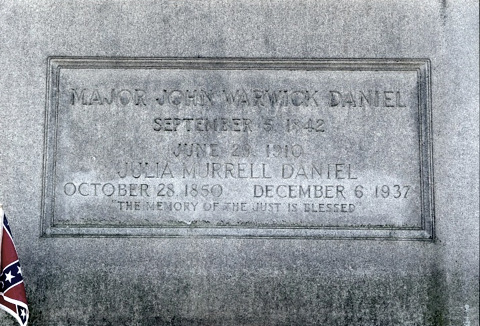
Spring Hill Cemetery, Lynchburg, Virginia
|
_____
Morning Session, April 9, 1892
-
---
Reports to the convention were next in order, and Major-General
John C. Underwood, commanding Division of the Northwest was
called on to read his report.
Gen.
Underwood on rising, said:
"Mr.
President and gentlemen of the convention— I live in Kentucky
and reside in Chicago. I am a member of two camps in Kentucky,
and of one (No. 8) in Chicago. It is a much more difficult thing
to belong to a camp in a city like Chicago, where we have to
meet in individual offices and hold up the enthusiasm by Saturday
night meetings on the enemy's ground.
"I
received the appointment (which I did not expect) from the general
commanding as major-general of the Northwest, including the
division West of the Alleghenies, which is referred to in General
Orders No. 22. Among other things the major-generals commanding
were directed to proceed to gather the names, compile the names
and commands of all the Confederate dead buried in the various
prisons and cemeteries of the North, put their graves in order
and see that that they are kept in proper condition and to monument
their remains.
"I
was never sufficiently high in the Confederacy to know how to
make orders, but I had the privilege of obeying. I did the best
I could, and I have this report to make to Gen. Moorman. I have
the books with me, and have got the graves numbered, the number
of their companies, and am happy to give them to those subscribing
to the monumental fund as a bonus, as a gift. (Cheers.) I have
never charged a Confederate soldier for anything that I could
spare, and I know that you will be interested in the report
which I shall read.
“This
first part is only to show you how the officer obeyed the orders
given. I will now read my report."
Headquarters Division of the Northwest, Chicago, Ills., April
7th, 1892.
Major
General Geo. Moorman,
Adjutant
General and Chief of Staff:
Sir:
I have the honor to make the following report with regard to
the discharge of certain duties, under orders from the Commanding
General:
I.
Pursuant to Paragraph 1 of General Orders No. 26 from general
headquarters, and after receiving commission, I on February
2d, 1892, assumed command of the division of the Northwest and
appointed a provisional staff (see copy of General Orders No.
1, Division Northwest, previously forwarded).
II.
In obedience to Paragraph 2 of General Orders No. 26 from general
headquarters, referring to Paragraph 11 of General Orders No.
22 of the same series, I began the compilation of data relating
to the Confederate dead buried within the territory comprising
my division district; and to date have been so fortunate as
to be able to present herewith, as part and parcel of this report,
two pamphlets containing rosters of deceased Confederate soldiers
— one, embracing 4317 names, etc., of the dead originally
interred at the prison Camp "Douglas," and afterward
removed to and buried in the Confederate quarter of "Oakwoods"
cemetery, Chicago, Ills ; and the other, embracing 2400 names,
etc., of the dead buried in the Confederate cemetery on Johnson's
Island, Lake Erie, and in the Camp Chase prison cemetery and
City cemetery, Columbus, O.
III.
I was unable to obtain sufficient data relating to the dead
buried at other points to justify publication thereof in pamphlet
form, but know that there are the remains of some 1700 Confederates
who died in Camp Morton prison and lie buried in the old cemetery
at Indianapolis, Ind., the graves and grounds there being in
a dilapidated condition.
IV.
The State of Ohio has taken better care of the Confederate graves
within its boundary than the other States reported; and has,
by gubernatorial authority, had compiled complete rosters of
such dead, transcribed and presented herewith in classified
pamphlet form; the dead at "Oakwoods" cemetery, Chicago,
number over 6000, but owing to the loss of some of the registers
the names of about two-thirds of the number, only, could be
ascertained, and their graves are indifferently kept, though
in better condition than those at Indianapolis. Altogether,
the remains of the deceased Confederate heroes referred to,
are neglected and need attention; and, with the view of instituting
a systematic reform, I have undertaken the raising of $25,000,
more or less, with which to place both graves and grounds in
good condition and monument the dust of those who gave life
to the "Lost Cause" and who now lie sleeping beneath
sod foreign to that of their nativity.
V.
Pursuant to the intent and purpose, expressed in the preceding
paragraph, I have already secured a cash subscription of $900,
a guarantee subscription of $1000, a conditional construction
subscription of $2000 — all aggregating $3900, which added
to the money in bank to the credit of the treasurer of the Ex-Confederate
Association of Chicago (the net proceeds of lecture by General
John B. Gordon with interest thereon, etc.), $1489.40, makes
a total available asset for Confederate monumental purposes
at Chicago of $5380.40; and, from promises made me and the natural
expectation of pecuniary realization through personal work done,
I feel assured of the ability to erect a monument over the Confederate
dead in "Oakwoods" cemetery, Chicago, at a cost of
from $5000 to $10,000; and at other points, with different valuations,
as after considerations.
VI.
On March 5th, 1$92, I was directed by the commanding general
to "proceed at once to the State of Kentucky to organize
camps in the United Confederate Veterans;" and pursuant
to such instructions, I communicated with many local ex-Confederate
associations within that State, made several visitations to
its principal cities, and to date have merged into the United
Confederate Veterans the "Confederate Veteran Association
of Kentucky," comprising 281 members organized into seven
camps located at Lexington, Paris, Cynthiana, Georgetown, Versailles,
Harrodsburg and Lawrenceburg; have secured the organization
of forty ex-Confederates at Bowling Green into a camp United
Confederate Veterans and have many more promised and in process
of organization, which I shall hereafter materialize unless
the order of authority is revoked.
VII.
Having, in compliance with your suggestion, recommended a most
active, zealous and worthy ex-Confederate worker, it was my
pleasure to receive from you and present to President John Boyd
of the Confederate Veteran Association of Kentucky, a commission
as Major General United Confederate Veterans; and to muster
and install into office in the presence of over 125 members
of his command, who received the information of the introduction
of the "United" Federation in Kentucky and hailed
the elevation of their comrade to the command of the division
with unanimity and great enthusiasm.
VIII.
As a "Southerner" by birth, education and past service
I am a devotee to the Southern people, of their principles of
virtue and honor, of their chivalrous deeds at arms; and, desiring
to preserve and assist in securing a true history of the past,
I herewith report the statistical data previously enumerated
as the most complete I could obtain; and, the number of camps
formed, as the greatest I could secure — within the month
of operation.
IX.
On the whole I have done the very best I could with the means
and opportunities at hand, and fully appreciating the honor
conferred on me, I remain
Your
comrade and obedient servant,
JNO.
C. UNDERWOOD,
Major General Division Northwest.
Gen.
Underwood was frequently interrupted during the reading of his
report with applause, and at its conclusion the delegates evidenced
their approbation by the wildest cheers.
---
Delegate
Chipley, of Florida, offered the following resolution:
Resolved,
That this report be adopted without reference to the Committee
on Resolutions, viz:
Resolved,
That the thanks of this convention are due and are hereby given
Major General Underwood for his faithful performance of the
laborious duties assigned to him by the general commanding.
Resolved,
That his report and the rosters of our dead, prepared by Gen.
Underwood, be published as an appendix to the proceedings of
this convention.
And
he also suggested that all other commanders emulate his example.
Seconded
and adopted by a rising vote.
Gen.
Underwood then thanked the convention as follows:
"No
officer deserves any thanks for doing his duty, but I thank
you, nevertheless, most sincerely, that you have received my
report with such evidences of appreciation. I would, however,
ask you to strike out one part of the resolution — that
which requires the publication of the rosters of the dead. It
will cost you six hundred dollars to publish anything like the
number I have (6000). They were published at my expense, and
I will give away what I have here with me and gladly send copies
to each individual who will write me at No. 64 Exchange Building,
Chicago, or leave his name and address with Col. John P. Hickman,
who is a member of the Tennessee delegation. I have some of
the books with me. Of the dead buried in Oakwoods Cemetery,
Chicago, Texas has six or seven hundred dead; Tennessee, seven
hundred and forty-seven; Louisiana, I think, one hundred and
thirty-seven, and so on. They are all classified here (touching
the book in his hand) and according to State and regiments.
North Carolina has one regiment that buried there two hundred
and ten men. To think of a regiment being put in that prison
by the Lake, and nearly all of them to die there, for two hundred
and ten men was a large regiment at one period of the war. The
number of books I have with me is between sixty and seventy,
and may be yours for the asking."
An
amendment was offered, as requested by Gen. Underwood, regarding
the publication of the rosters of the dead, and carried.
---
Major
Gen. John C. Underwood:
Mr.
President: I rise for the purpose of painting a word picture
by citing a passage of history, possibly known to others than
myself who are present. During one of the memorable battles
of the late civil war, enriched with charges, counter-charges
and deeds of valor culminating in victory, there was a thin
single line of the "grey" being pressed back by overpowering
numbers of the enemy, yet the onslaught of the "blue"
masses was for a time heroically withstood; and, not until it
was absolutely necessary to retreat, because of the depleted
battalions and no reinforcements, was the command formed in
two lines for the purpose of withdrawing from the field. No
sooner had the retrogade movement begun, than the enemy discovering
the maneuvre pressed forward its columns, made ready for the
charge, and hurled the masses with a forest of bayonets against
the centre of the retreating division. The Confederate line
wavered, but being rapidly supported in the centre from its
flanks, closed gaps from gun shots, withstood and repulsed the
charge. Rejoining the sub-divisions it again commenced the orderly
retreat, first one sub-division and then the other passing through
the intervals made for it and rejoining in the rear of the protecting
sub-division presenting a battle front.
Such tactics prevailed until the two retreating lines neared
the crest of a small hill, when the retreating sub-division
could not be halted, but without restraint passed over the top
of the hill and sought the protecting cover of mother earth.
The sub-division formed in line of battle, discovering that
it was no longer supported and plainly seeing the preparations
for an overwhelmning charge by the enemy with almost certain
capture, turned and in some disorder also sought cover beyond
the crest of the eminence. The efforts of the officers to allay
excitement and stop the too hasty and unguarded retreat were
fruitless; and, disorder, broken lines and capture seemed inevitable.
When the commanding officer came to the front and through his
personal presence and influence endeavored to stay the disorderly
retreat and prevent a possible rout. The men looked at their
General, and though no cowards, as many hard fought battles
could attest, still through temporary panic hastened to the
rear; when, losing patience, the commander ceased his futile
attempt to re-establish the lines of battle and turning faced
the advancing host, sword in hand, head erect and bare, with
the eye of an eagle and an indescribable determination in his
facial expression, seemed to be willing to meet and defy the
enemy with his single arm rather than suffer the disgrace of
ignominious defeat. A tall, thin color-sergeant, reaching the
hill top, looked over his shoulder as he ran and saw the advancing
lines of the enemy; and comprehending the predicament in which
his General was placed, he gave the well known battle cry of
the South, turned and running to the front placed the battle
cross standard beside the commander; the movement and example
was electrical and, before the enemy could take advantage of
the temporary panic, the line was formed dressing to the centre
upon a Major-General and a battle flag; and, with the aid of
opportune reinforcements, the enemy was repulsed. When a few
of the nearest veterans turned to give homage to such a commander,
it was discovered that he had been wounded, and, the trickle
of blood across his cheek, falling upon and staining the clothes,
plainly marked its fountain source; and, the scar that remains
to this day constitutes a decoration, gloriously won on the
field of battle, which far surpasses the most ornate jewel that
could possibly be bestowed upon the military hero graced by
the bullet mark.
There sits the man, Jno. B. Gordon, the hero of this thrilling
and historic scene, the "Marshal Ney of the war",
a civil ruler in the Senate of the now united country, a combined
soldier and statesman whom we in honoring, honor ourselves.
Therefore, I second the nomination of General John B. Gordon
for re-election as Commander of the United Confederate Veterans
and, trust that his election may be unanimous.
This speech was greeted with loud and prolonged applause, and
the name of Gordon, Gordon, Gordon, shouted by every delegate.
---
Comrade W. L. Delaney, of Kentucky, seconded the motion that
the election be made unanimous, and by a rising vote, and amidst
the wildest cheers and with the greatest enthusiasm the motion
was carried by acclamation.
General Gordon
replied as follows: "My beloved comrades, I will not attempt
to imitate the example of the great Marshal of France, who directed
in his last will to his people, that his body should be buried
in Paris, and his heart upon the battle field with his dead
comrades; but I will say, that while I live my heart and my
services are yours [cheers], and when I am dead I trust that
beneath the sunny skies of our loved Southland, to be laid to
rest by the hands of my loving and consecrated brethren."
[Loud and prolonged cheering.]
Gen. J. A. Chalaron, of Louisiana — "I move that
all the present officers of this association be re-elected unanimously,
and by a rising vote." [Carried amidst cheers.]
---
Lieut. Gen. E. Kirby Smith — “I thank you, my comrades,
with a heart swelling with pride, for the great honor you have
conferred upon me. As one of the first to enter the war in Virginia,
and the last to lay down my arms, I can say that none, be he
private or officer, have been more faithfully devoted to the
South than I, and I promise to be worthy of your regard by remaining
as true in the future as I have been in the past.” [Cheers.]
---
Gen. Underwood — I was about to do the same, and now beg
to offer this resolution:
"Whereas,
the ladies of New Orleans, mothers, wives, sisters and daughters
of Confederate soldiers and citizen sympathizers, have through
their personal efforts entertained and dined daily the members
of this convention and attendant associates; therefore, be it
"Resolved,
That the thanks of this convention are hereby tendered to the
ladies of the Crescent City for their hospitality, thorough
home-like courtesies and open-hearted liberality in their daily
administrations toward the inner man, as equaled only by their
lovely characteristics, as beautiful and true women.
"Resolved,
That the foregoing resolutions be adopted by a rising vote."
Adopted.
It
was carried by a rising vote, the delegates waving their hats
and shouting, "Hurrah for the ladies of New Orleans."
---
Appendix
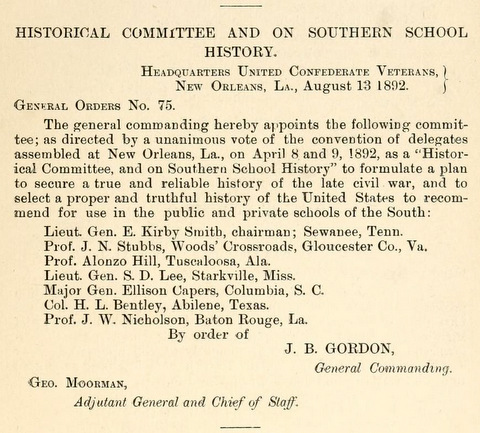
_____
Birmingham, 1894:
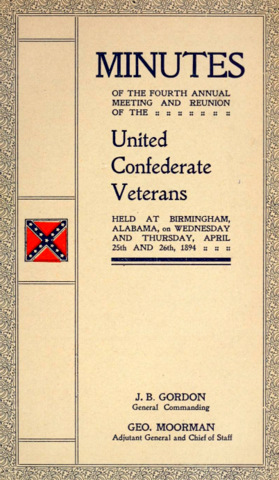
---
First Day's Proceedings, Wednesday, April 25th, 1894
---
A few minutes after nine o'clock, just outside of the wig-wam,
salutes were fired by cannon, and Gramb's Reunion Band played
"Dixie." The moment the first chord of this soul-stirring
air was touched hats went up, flags were waived, handkerchiefs
shaken and yells of joy from enthusiastic Confederates and sympathizers
in a common cause filled the air.
---
Assistant Chaplain-General J. Wm. Jones, D. D., in the absence
of the Chaplain -General, in calling the blessings upon this
meeting, said in a fervent manner :
"Heavenly Father! We ask that Thy blessings be upon us
to-day as we are gathered together in this Reunion. We thank
Thee that Thy blessings were over us in battle, and we thank
Thee that Thy blessings are over us here to-day. We thank Thee
that, while many have fallen out of our ranks, so many of us
remain to bless Thy name to-day. We thank Thee that in the days
that tried men's souls, we had men of courage to fight for our
cause. We thank Thee that there still remain the principles
of justice and truth that we fought for. We thank Thee that
those principles have been preserved, and that the Sons of Veterans
to-day maintain the principles of their fathers. Hear us and
answer us, and be with us in our Reunion, and grant that The
God of Abraham, and of Isaac and of Jacob, and the God of Jackson,
and of Johnston, and of Lee be with us in the days that are
to come. We ask this all in Jesus' name. Amen."
---
General Gordon said:
"My
Confederate Brothers and Confederate Sisters : It is my pleasure
to respond to the hearty welcome just given us by this grand
old State. I wish to assure the Governor of Alabama that the
followers of those immortal men to whom he has referred are
ready to meet with him in his cordial memory of those immortal
dead. Yes; here are the men who followed Lee and Jackson and
Johnston, and all the leaders who have made the pages of American
history what they are.
"In one sense, my brethren, I am not the man to respond
to a welcome from Alabama, for in that sense I am an Alabamian
myself, and feel that it would be more proper for me to stand
with her Governor and extend to the brave men of other States
her welcome rather than to receive it; and, on the other hand,
I am perhaps of all living men the proper one to make this response,
because no living man is more indebted to Alabama than I am.
It was among the mountains of Alabama that I first heard the
voices that called us to battle. It was an Alabama regiment
which I led, or rather which led me, into that bloody fray,
and made principles when it swept over the frowning breastworks
and left death upon the fields. We all have a right to feel
thankful and be proud of all Alabama to-day. We can lay our
tributes at her feet for her welcome. Alabama's name is enough
to endear her to our hearts. In the first place, she is composed
of seven letters, which is a lucky number. Four of the letters
are the first letter of the alphabet. You may look at her from
the front or behind, and she still stands at the head of the
list; and if Alabama should have any trouble in selecting a
governor we will furnish her all the candidates she wants. [Laughter.]
"The iron of her mountains, the rich soil of her black
belt, and the timber of her sunny coast, place her in the front
ranks of our Southland.
"Since our last meeting many of our comrades have fallen
from the ranks into that last sleep of rest. Kirby Smith has
gone, and that sturdy Roman, Jubal Early, has followed him;
Vance and Colquitt, soldiers and statesmen, have joined the
Confederate ranks beyond the grave.
"In conclusion, I wish to return the thanks of all these
brave men to this great State, whose hospitality is as limitless
as the air around us."
---
General Gordon sat down amid loud cheers, and the band played
the Bonnie Blue Flag. He then took the chair as Commander-in-Chief,
and announced that the Fourth Annual Reunion was ready for business.
---
Gen. John C. Underwood, of Chicago, was recognized by the Chair.
General Underwood called attention to the Confederate Monument
erected in Chicago at a cost of $100,000.00, and concerning
which the United States Senate has now under consideration the
dedication of four cannon and balls captured during the late
war.
[At the rear of the wigwam had been placed a cast of the bronze
statue from the original in Chicago. At a signal, Miss A. P.
Hill unveiled the statue, and the band played "Dixie."
Everybody yelled, threw up their hats, rapped canes and waived
handkerchiefs.]
He then explained the situation of this grand monument erected
at a considerable cost to the memory of the Confederate dead
in the cemetery at Chicago. Continuing, he paid General Cabell
and daughter high tribute for the manner in which they had faithfully
worked for this monument.
General Cabell arose, and said he hoped the Camps would contribute
liberally to this monument. He alluded in passionate terms to
a monument more lasting still. " I warrant the Trans-Mississippi
Department will come up all right. I will start the ball rolling
at $10.00 myself. Let the Sons and Daughters of the South help
us in this work."
General Underwood stated that the pedestal of the Chicago statue
was made of old Georgia granite.
Donations to the monument were subscribed at a rapid rate, and
great confusion resulted. "We must have silence,"
said General Gordon; and, on motion, it was decided to discontinue
taking subscriptions.
---
Wednesday Afternoon
---
General A. P. Stewart was introduced, and made an extended talk
upon the proposed Chattanooga and Chickamauga Military Park.
He spoke at length upon the manner in which Congress had dealt
with the matter, and urged the appointment of commissioners
from each State to visit these fields, and mark the places of
battles and commands. He urged these Veterans to go to Chattanooga,
and visit these fields during the present Reunion.
---
Appendix
|
|
| 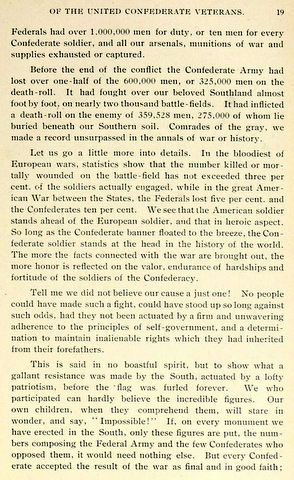
|
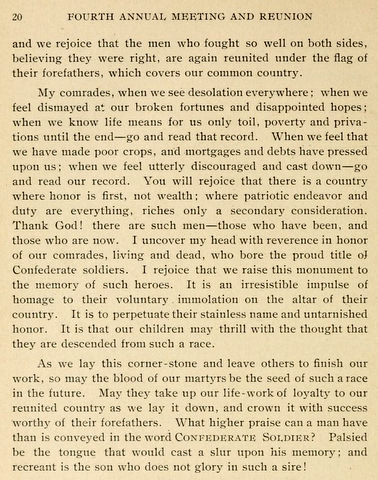
|
_____
Houston, 1895:
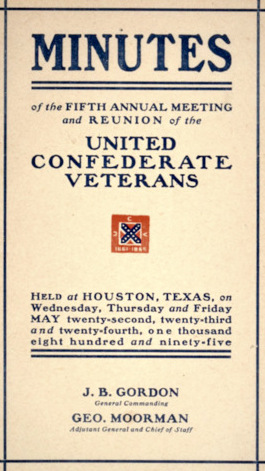
---
Third Day's Proceedings, Friday, May 24, 1895
---
General Gordon said he had a letter from "a Confederate
soldier, a private soldier, a blind private soldier, but one
who saw with his heart, as no man ever saw better with his eyes,
the glory of the past; and who intended to do what he could
to see that memories of them should be preserved."
The letter was as follows:
"New York, May 14
"Gen. John B. Gordon, Commanding United Confederate Veterans,
Houston, Texas.
"General — I have the honor to inform you, and through
you the veterans assembled in Reunion at Houston, that Col.
Robert C. Wood, of Louisiana, is fully empowered to act for
me in all matters connected with the memorial plan which I have
submitted to the veterans for their consideration.
"With great respect,
"Your obedient servant,
"Charles Broadway Rouss."
General Gordon called Colonel Wood to the stand, saying that
he was no niggard when it came to dealing with the Confederate
soldier; that he bore in his veins the blood of old Zack and
Dick Taylor. Colonel Wood had the following communication read
by the reading clerk:
"New York, May 11
"Col. Robert C. Wood, City :
"My Dear Friend and Comrade — As I have been in correspondence
with many Confederate veterans in relation to the establishment
of a National Memorial Association; and as the matter has been
called officially to the attention of the United Confederate
Veterans by the two Department Commanders, I assume that it
will be the subject of discussion at the Houston Reunion. Should
this be the case, I beg that you will furnish the veterans with
fuller particulars than I have been able to convey to them by
circular or letter. The following statement will explain the
reasons that induced me to interest myself in this memorial
movement, and why I feel warranted in calling upon my comrades
for co-operation.
"Shortly after the termination of the war, I became thoroughly
impressed with the importance of the South's taking up the work
of vindication. I saw that Northern writers, imbued with partisan
feelings, stimulated by sectional animosity and posing as historians,
were falsifying history; that they were misrepresenting the
causes that forced the South to take up arms, and the manner
in which she had sustained the conflict ; that they were reviling
our domestic institutions, impugning the courage and devotion
of our soldiers, making our trusted leaders the objects of malignant
abuse; and were utilizing the text-books of the schools to mislead
and debauch the minds of the young. I saw that these misrepresentations
and slanders, propagated over a wide field, and without correction,
were being accepted as facts.
"In view of this, I saw with great satisfaction, and watched
with eager interest, the growth of a movement in the South to
insure the truth of history by means of a truthful record of
the great conflict, and an explanation of the causes that led
to it. I thought that all who wore the gray would work harmoniously
to this end, and in addition, do all in their power to preserve
the memory of their fallen comrades, and to leave to posterity
enduring proofs of their loyalty, courage and devotion to duty.
"When the first Southern Historical Society was organized,
having in view the objects above recited, I hoped and believed
a step had been taken that would secure all the results desired;
that from this nucleus would grow an institution embracing all
the matter and material necessary to the future historian in
making up a truthful record ; that would contain as valuable
object lessons the relics and mementoes of the great struggle
for our rights; that would preserve the features of our great
leaders; that would be a sacred shrine for our veterans, and
a Mecca for their descendants for long ages to come.
"When I saw that our noble women and good and true men
were working zealously and untiringly to secure these results,
and that memorial organizations had been established in Richmond,
New Orleans and elsewhere, I was hopeful for success. It was
only after the lapse of many years that I commenced to entertain
doubts or the perpetuity of the work that had been accomplished.
I saw with concern that a multiplicity of efforts to accomplish
the objects of general desire was endangering success. That,
notwithstanding the evident design to make these memorial institutions
national in character, they were regarded by the veterans as
limited and local, and that they were never so generally and
liberally supported as to obviate the necessity of recurring
appeals for assistance. I saw that the old soldiers were reluctant
to have relics and records removed from their respective States
without an assurance of being made part of a national collection,
to which every Confederate State would contribute. I saw that
a great amount of valuable memorial matter, scattered broadcast
over the country, was in danger of being lost or destroyed;
and that many relics that should form an important part of the
illustrated history of the war were being disposed of to Northern
purchasers for purposes of exhibition and profit.
"Although much valuable time had been wasted, and many
of the veterans had 'crossed to the other shore,' I believed
that it was not too late to rectify the mistakes caused by patriotic
zeal, and that whatever had been lost by not having concentrated
our efforts and means might be regained. I was satisfied that
the desire to perpetuate the memories of our great struggle
for constitutional rights was so strong and universal in the
hearts of our veterans; that their united and harmonious action
could be relied upon in any effort to that end. Though convinced
of this, I did not feel warranted in appealing to any of our
prominent Confederate leaders to inaugurate the work, inasmuch
as it would involve labor and necessitate expense, I preferred
to take the burden upon myself.
"In
November of last year, I addressed the following circular to
the Commanders of the veteran Camps, and to other Confederates
whose addresses I was able to obtain." (Here followed several
circulars, which are familiar to veterans.)
"The responses to this circular were more numerous than
those to the first, and equally, if not more, satisfactory.
From veteran, Camps, from commanding generals to privates, from
those who have succeeded in life's struggles, and from those
upon whom fortune has frowned, assurances of co-operation and
substantial support have been received. It is for the veterans
to mold this universal sentiment into substantial expression.
It would be comparatively easy of accomplishment to secure the
sum that has been estimated as necessary to found the proposed
association. A few rich persons could furnish the amount without
inconvenience, but in so doing they would deprive the Confederate
veterans of the opportunity of furnishing the world and to posterity
proof of their unanimous and loyal devotion to the memory of
the Lost Cause. An institution built out of their poverty would
be infinitely preferable, and would inculcate a loftier lesson
than one created by industrial wealth.
"The question of location has impressed me as one of great
delicacy and importance, and in formulating plans I have given
it careful attention. It has been made more clear that there
will be competition as to the site of the institution. For this
reason I deem it wisest and best to leave the decision to the
Board of Administrators. I can only hope, in view of the great
purpose contemplated, that local preferences and prejudices
may be subordinated to the common good. I think all will agree
that our shrine should be erected in a place easily accessible;
that our Mecca should be erected where it can be reached by
the greatest numbers. In this, as in all other questions connected
with the establishment of the Memorial Association, I shall
acquiesce cheerfully in whatever decision the veterans may reach.
In this connection, I wish you to assure our comrades that from
the inception of this movement there has been no desire or purpose
to interfere with or antagonize in any manner ¦whatever
the memorial organizations that now exist.
"Although the plan submitted for the establishment of a
memorial association has in view the crystallization of a sentiment
dear to all Confederates, yet we should not lose sight of the
fact that zealous activity, intelligent effort and business
methods are essential to success. If it be determined to establish
the association, of which there appears no doubt, the first
and most important work will be a canvass of the veterans. I
am convinced if the Commanders of veteran camps and others interested
themselves it would largely exceed the amount estimated for,
and that the effort would be to stimulate to increased liberality
those who now intend to contribute bountifully. I take it for
granted that the poorer veterans can pay their subscriptions
by installment during the progress of the work.
"While I am confident of the establishment of the memorial
association, and desirous of seeing its completion as soon as
possible, I would advise against commencing work without sufficient
funds in hand to insure its continual prosecution. The effect
of interruption would be injurious, as it would evoke adverse
criticism. It will be recalled, that insufficiency of funds
to complete the Grant tomb so long after its commencement was
made the theme of unpleasant comment throughout the world.
"Other matters relevant to the memorial association will
likely be presented for discussion at the Houston Reunion. Our
frequent conversations have placed you in possession of my views,
to which you can give expression.
"I beg that you will commend me fraternally and kindly
to the veterans assembled, and express my regrets that business
burdens and failing sight will prevent me from being with them.
Assure them that I shall enter heartily into their plans, and
shall esteem it an honor, as it will be a positive pleasure,
to be permitted to share in their good works.
"Very sincerely,
"Charles Broadway Rouss"
The communication was loudly cheered, and when Col. Wood supplemented
it by saying that Comrade Rouss stood ready, if some such plan
should be adopted to start the fund for it with $100,000, the
cheering was redoubled. Gen. Lee paid a high tribute to Comrade
Rouss, and commended his proposition. He thought the plan should
be adopted, and the work begun. Gen. Gordon moved that the communication
be referred to a committee of one from each State in the Association,
who should consider the plan, and set the matter on foot. Col.
Corey, of Virginia, didn't want to oppose the report, 'but called
attention to the fact that the ladies of Richmond had been at
work with the same general view for five years, and in their
poverty, aided by the city of Richmond, had raised $60,000.
He read a statement to show what had been done by them. A Louisiana
member suggested that each camp should give a concert on the
Fourth of July for the benefit of the fund. The motion was adopted.
---
Gen. Gordon read a telegram from Col. John C. Underwood, inviting
the veterans to attend the dedication of the Confederate monument
at Chicago.
_____
Originating Spiritual Inception
of Sword Over the Gown:

Charles Broadway Rouss's
First Circular Letter
New York City, Nov., 1894
Comrade:
More than a quarter of a century has passed away since
the surrender of Appomattox. Of the many who bore arms
in defense of the liberty of the South in the great
civil war, but few remain. In a short time the last
of those who wore the gray will have passed to the other
shore. Upon the few that remain devolves the duty of
perpetuating the memory of our gallant comrades who
sleep beneath the sod.
"Nearly 500 veteran camps," "memorial
associations," "historical societies"
and "old soldiers homes" attest the loving
and loyal remembrance of the Confederate soldier for
the cause he served so well.
This question is forced upon us: What is to become of
these institutions and our records and cherished relics
when the last of our veterans who are their custodians
shall have passed away?
The mementoes of the struggle of the South for civil
liberty and the evidences of her glorious prowess in
the field are scattered broadcast over the country.
Should they not be collected and provision be made for
their preservation as a rich inheritance to our children
and a patriotic object lesson for generations to come?
Is it not feasible for the surviving Confederate veterans
acting in brotherly concert to form an association having
for its object the collection and preservation of these
records and relics and also a gallery of portraits of
the great leaders who added so much lustre to our cause?
---
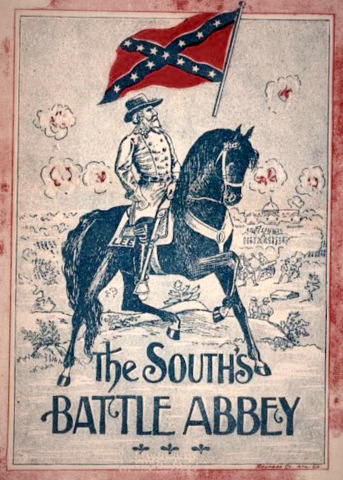
Rouss's Circulars, Etc.
_____
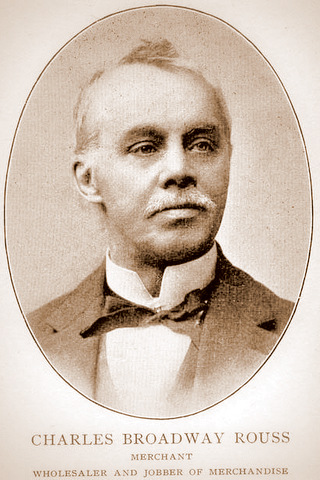
Charles Broadway Rouss
_____
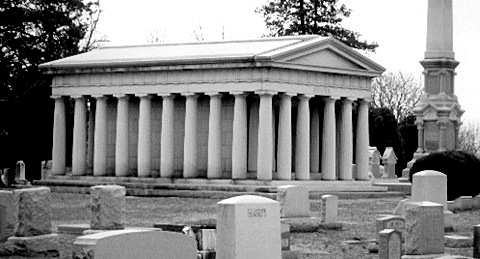
Rouss Mausoleum, Mount Hebron Cemetery,
Winchester, Virginia
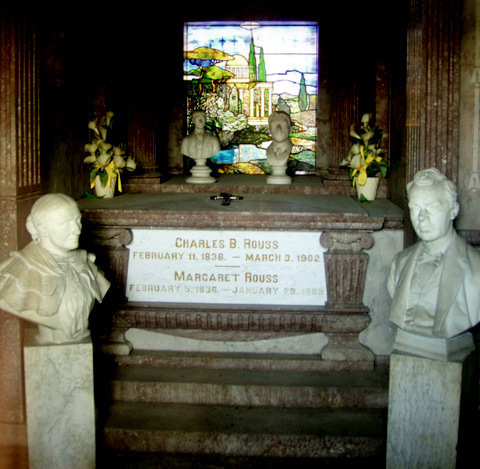
Charles B. Rouss
February 11, 1836 - March 3, 1902 |
_____
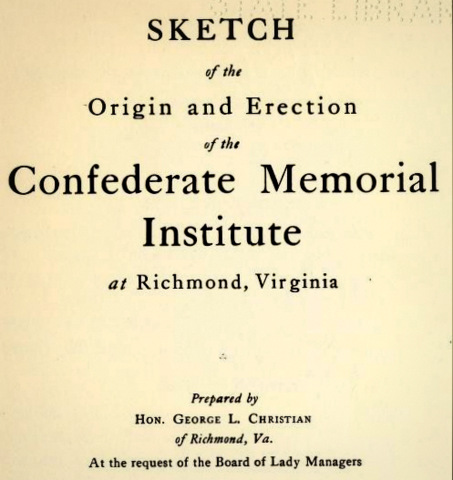
Published 1921
_____

George Llewellyn Christian
_____
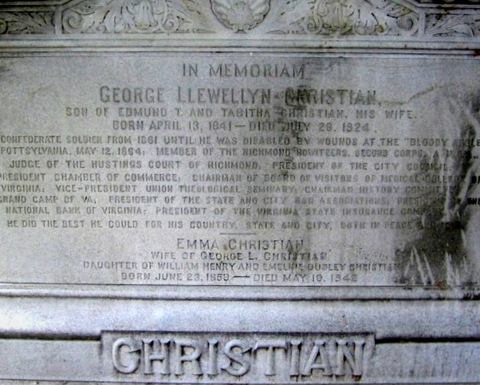
Hollywood Cemetery, Richmond
Son of Edmund T. and Tabitha Christian, his wife.
Born April 13, 1841 - Died July 26, 1924.
A Confederate soldier from 1861 until he was disabled
by wounds at the "Bloody Angle," Spottsylvania,
May 12, 1864; Member of the Richmond Howitzers, Second
Corps, A. N. Va.; Judge of the Hustings Court of Richmond,
President of the City Council, President Chamber of
Commerce; Chairman of Board of Visitors of Medical
College of Virginia; Vice-President Union Theological
Seminary, Chairman History Grand Camp of Va.; President
of the State and City Bar Associations; President
of the National Bank of Virginia; President of the
Virginia State Insurance Company. He did the best
he could for his country, state and city, both in
peace and war.
_____
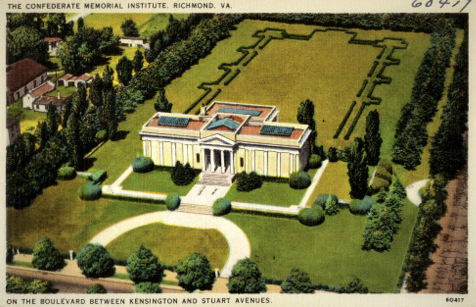
The Confederate Memorial Institute
_____
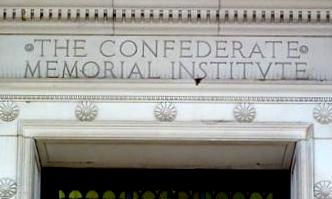
---
The idea of a Confederate Memorial Association was
raised at the Confederate Veterans Reunion in Houston,
Texas, in 1895. Charles Broadway Rouss, a native Virginian
and wealthy New York businessman, offered a large
sum toward the erection of a memorial building to
maintain records and relics of the Confederate cause,
if matching funds could be raised across the South.
In the fall of that year, the designated Board of
Trustees first met and the movement to fund a "Battle
Abbey of the South" began in earnest.
(Source,: http://www.vahistorical.org/collections-and-resources/how-we-can-help-your-research/researcher-resources/finding-aids-2;
viewed 4/5/2014.)
______
History of Battle Abbey
The neoclassical structure that houses the library
and headquarters of the Virginia Historical Society
was built in six stages between 1912 and 2006.
Building Battle Abbey
The first part, completed in 1913, was built by the
Confederate Memorial Association as a shrine to the
Confederate dead and as a repository for the records
of the Lost Cause. The association's driving force,
Charles Broadway Rouss, was a Virginia veteran of
the Confederate army who later made his fortune in
New York. Rouss contributed $100,000, one half of
the sum needed for the construction of the building:
the remainder came in small contributions from veteran's
camps, school children, and ladies' organizations
throughout the South.
One fund raising effort in 1897, a piece of sheet
music entitled The Broadway Rouss Two-Step, "sold
for the benefit of the Battle Abbey of the South,"
so captured the public's imagination that the building
became popularly known as "Battle Abbey"
and has remained so ever since. Officially the building
was designated the Confederate Memorial Institute,
but the name was seldom used even by those closest
to the association.
---
.jpg)
---
Facts about Battle Abbey
Battle Abbey has neoclassical architecture.
Battle Abbey was built in six stages between 1912
and 2006.
Battle Abbey is nearly 200,000 square feet.
Battle Abbey sits on land donated by the Commonwealth
of Virginia.
Battle Abbey was designed by the Philadelphia firm
of Bissell and Sinkler.
Inside Battle Abbey
The first portion of the building, including the marble
entrance hall and two flanking monumental galleries,
was designed by the Philadelphia firm of Bissell and
Sinkler and was constructed on land donated by the
Commonwealth of Virginia. One of its most striking
features is the series of heroic murals, "The
Four Seasons of the Confederacy," by French artist
Charles Hoffbauer. Also of interest are the seals
of the eleven Confederate states, located beneath
the cornice in the front entrance hall, done in bas-relief
with gold-leaf accent.
In 1921 the first addition to Battle Abbey was completed,
a nobly proportioned "Memorial Hall" built
to house the archives and the extensive portrait collection
donated to the Confederate Memorial Institute by its
next-door neighbor, the R. E. Lee Camp, No. I, Confederate
Veterans.
(Source: http://www.vahistorical.org/your-visit/history-battle-abbey;
viewed 4/14/2014)
_____
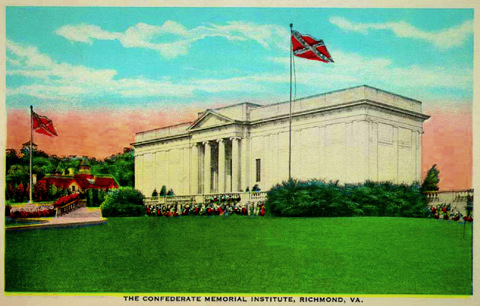
---
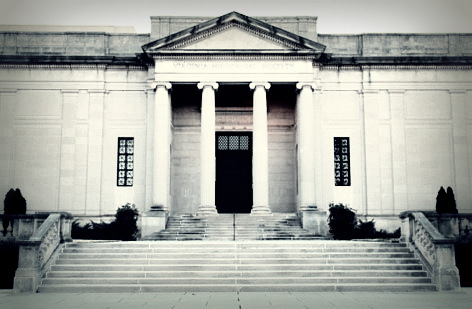
|
_____
_____
Richmond, 1896
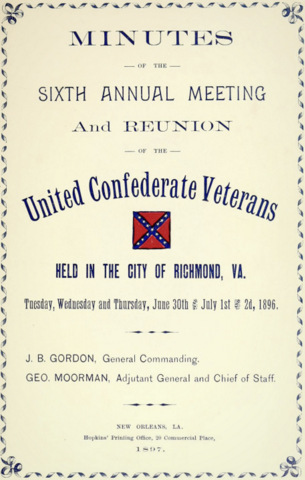
---
First Day's Proceedings
---
Work of the Historical Committee
---
MR. ROUSS'S HANDSOME OFFER
V. It is with particular pleasure that your committee call attention
to a noble instance of co-operation with the plans and purposes
of this Association. Simultaneously with the second report of
your committee, made at Houston, Tex., Comrade Charles Broadway
Rouss, a gallant Confederate soldier of the Army of Northern Virginia,
and now a merchant prince of New York, tendered to the United
Confederate Veterans a generous donation for the purpose of establishing
the Confederate Memorial Association. The gratitude with which
his noble act inspires every Confederate soldier is increased
by the delicacy with which he avoided the ostentation of having
the Memorial Association to bear the appearance of resting solely
on his own munificence. He wished that it should be founded upon
the joint efforts of all his comrades, and that all should feel
in it the pride of ownership.
Comrade Rouss has looked wisely into the future, and has seen
that our Association must end before many years by the successive
passing away of its members. He has provided the means for establishing
an organization to take our place; but he has left it to his comrades
to give the movement, form and shape; so that the Confederate
Memorial Association will come into perpetual life as the offspring
of this Association.
Our children, and our children's children, trained by us to sentiments
of patriotism, will grow up with love and admiration for the institutions
of the United States— those munificent institutions to which
their fathers have contributed so much. Partakers of the prosperity
which the energy and wisdom of their ancestors is bringing to
the South, they may come to ask, "Why did our fathers rebel
against this glorious government?" And they may listen to
the perversions of partisan historians. There should be, at least,
one monument of the Confederacy left to bear witness. That monument
should contain the testimony, and bear it down through all time
. That monument should be guarded by a corporation which will
never die, and be sustained by a perpetual fund.
To found this Confederate Memorial Association, to erect this
Battle Abbey, and to provide it with an endowment fund, the annual
interest of which will be sufficient to keep it in repair, and
to sustain the expenses of a perpetual exhibit, Comrade Rouss
offered his generous donation. For this purpose the committee
appointed by this Association has canvassed the Southern States
in order to offer to every Southern sympathizer the opportunity
to contribute to this patriotic enterprise.
Your committee look forward with deep interest to its completion,
and commend it to the Association as the most important subject
which will claim their attention.
A CHAIR IN EACH STATE
The results above enumerated, some of which were brought about
by the recommendations of your committee, and all of which tend
to co-operate with our efforts, encourage us to offer the following
additional recommendations:
I. We recommend that this Association take steps to urge upon
the several Legislatures, universities and colleges of the Southern
States to adopt the policy suggested in the two previous reports
of this committee relative to establishing a chair of American
history in, at least, one university or college in each State.
To this end, we recommend that this Association make proper orders
for appointing in each State or division, a suitable committee,
to present the matter to their respective Legislatures, universities
and colleges, and invite the co-operation of the respective historical,
educational and literary societies, and to invoke the aid of the
press, and of every Confederate camp or organization.
---
Second Day's Proceedings
---
General H. Kyd Douglas, of Maryland, then
offered the following resolution:
THE CHICAGO MONUMENT
The United Confederate Veterans assembled in annual reunion
at Richmond, ever mindful of their dead comrades wherever they
may lie, and holding in grateful memory all those who do them
honor, desire to express to the city of Chicago their most grateful
acknowledgments of the broad-minded liberality of its people in
the erection and consecration of the lofty monument over the 6000
of our dead who rest within its protection, and the boundless
hospitality with which it received all Confederate soldiers who
attended that dedication. Our thanks are given without stint to
every army veteran, soldier and citizen of that great city who
participated in that memorable scene. May the monument there lifted
up stand through the ages as a perpetual reminder that its dedication
was the final triumphal scene of a great war, commemorative alike
of the heroic dead it honors and of reunited peace and friendship
between North and South."
In seconding the resolution offered by General H. Kyd Douglas,
of Baltimore, General Stephen D. Lee said:
GENERAL LEE's REMARKS.
"I desire to second the motion. I was at Chicago at the unveiling
of that monument and I never in my life saw a greater and more
cheerful welcome than that accorded to the representatives of
the Confederate army who were present. Three-fourths of the money
necessary to erect that monument was subscribed by the citizens
of Chicago, and when the Confederate delegation was in Chicago
they passed two or three miles through 150,000 spectators, and
every honor was given them. (Applause.) The was not one word,
one look, one motion that did not carry with it love and friendship
to your comrades who were there, and my comrades, I want to say
that only until that visit I never believed that the war was entirely
over, and its prejudices gone. (Applause) I felt then that every
Confederate soldier could go in and make a display of his loyalty
to the honor of our common country. ( Loud applause.)
GENERAL CABELL's REMARKS
General W. L. Cabell, of Texas, arose and said:
"Comrades, I have the honor of seconding that resolution.
Although I was not present, I sent my representative — my
daughter. (Loud applause.) She was there. (Continued applause.)
From what she said, and from what my friend, General Lee, has
said no people extended hospitality in a more lavish way than
the city of Chicago did to the representatives of the Southern
people (Renewed applause.) Representing 225 camps in the State
of Texas, and 340 in the Trans-Mississippi Department, I have
the honor to second the resolution in behalf of those noble men
whom I had the honor to command. (Cheers.) Every man in the Trans-
Mississippi Department, from Montana down to the Commonwealth
of Mexico, bids me second that resolution. I do it in behalf of
as brave a set of men as the sun ever shone upon. (Loud applause.)
I second that resolution in behalf of the men of the Trans-Mississippi
Department, who were brave in war,
and at the same time they have no apologies to make to anybody
under any circumstances. (Renewed applause ) I second that resolution
in behalf of the Sons and Daughters of the Confederacy. I do it
in behalf of the men who were not afraid to acknowledge what they
doing during the war. (Cheers.)
In conclusion he said: "I would not take a lump of gold as
big as Texas, and a diamond in it as big as Arkansas, for the
part I
took in this war." (Loud applause.)
General (Red) Jackson, of Tennessee, next arose and said:
GENERAL W. H. JACKSON'S REMARKS
Mr. Chairman and Comrades — It is with a very great pleasure
I second that resolution, representing the grand old volunteer
State of Tennessee. (Cheers). Let me tell you that was the first
olive branch extended to the Southern people, when General Underwood
applied to the colonel commanding the First Illinois regiment
to fire a salute over the dead there, he said it would give him
pleasure to furnish the whole battalion. Subsequently, when the
Grand Army of the Republic commenced criticizing, General Underwood
went to that colonel and said: ' Lest it embarrass you, you can
recall that order.' He said: ' I was in the war from the start,
and can stand such criticisms, and I will furnish my entire regiment
to fire that salute.
"In recognition of that fact, I held a mass meeting in Nashville,
and appointed a committee of ten on Invitation and three hundred
on "Reception, and invited those people to Nashville. They
came, and we gave them a grand old barbecue, and there were 1,500
of them present. Therefore, it is with great pleasure that I second
that resolution." (Applause).
Kentucky also warmly seconded the resolution. Col. H. A. Newman,
of Missouri, also spoke eloquently in support of the resolution.
General Douglas next arose and said: " I offered this resolution
because I considered that the scene enacted at Chicago on the
30th of May, 1885, has fired the last shot of our civil war and
inaugurated the greatest triumph of modern times. (Loud cheers).
There was no other country on the face of this earth in which
such a thing could have been done; there was no other city in
this Union that would have done it as magnificently as Chicago
did." (Applause).
The resolution was also seconded by several other speakers on
the floor of the convention, and it was unanimously adopted by
a rising vote amidst the wildest cheering.
After the vote on the adoption of the resolution was taken, General
Gordon said:
"Now let the wires flash, that this part of the Union is
ready to back the great powers necessary to carry us forward to
our destiny." (Tremendous applause).
There was a simultaneous and united call for Underwood. "Underwood,"
"Underwood," which continued to grow and swell until
the building fairly shook with the cry, but the distinguished
comrade who had done more than all else together in rescuing from
oblivion the names and caring for the graves and memory of the
Southern dead upon Northern soil, was not present to receive the
ovation which he so justly and richly merited.
---
ADJUTANT GENERAL'S REPORT.
Adjutant General Geo. Moorman here submitted his annual report,
which was read and unanimously adopted. It is as follows: Headquarters
United Confederate Veterans, Richmond, Va., June 30, 1896
General John B. Gordon, Commanding U. C. Vs.:
General — I have the honor to make a report of the
growth of the organization of the United Confederate Veterans,
which cannot but be gratifying to you and to our comrades.
---
FITTING TRIBUTE
The great good accomplished by Major General John C. Underwood,
in furnishing to these headquarters the names and location of
the graves of our comrades buried at the places named above, and
through his wonderful ability, high order of patriotism and great
pecuniary loss to him, as well as an expenditure of time and labor
of such magnitude that it can scarcely be arrived at, in building
the beautiful monument at Oakwood Cemetery, at Chicago, to the
" Confederate dead," is an eloquent reason why this
department should be revived, and the philanthropic purpose of
the United Confederate Veterans, so worthily and grandly carried
out during General Underwood's administration be continued.
---
It is our sacred duty, and the dictates of honor require that
we, the living, shall keep green the memory and the graves of
those of our heroes whose arms are nerveless, and whose families
many of them are helpless, who are sleeping so far away from homes
and kindred, and I respectfully recommend that a Department of
the North be created at once, a suitable commander be selected,
and the grand work so ably and patriotically started by General
Underwood be actively continued.
No formal report has been made to this body of the completion
of that grand Confederate monument in Oakwood Cemetery, at Chicago,
111., which "sentinels the bivouac of the dead," —
"Our Dead'' — who will sleep forever upon the shores
of the great lake, within the hospitable gates of the peerless
city of the Northwest. Nor has any greeting been sent by this
body to that magnanimous city, which shelters "our dead"
upon her bosom, and which, with so much grace and hospitality,
welcomed the Confederate survivors to witness the consecration
of this historical memorial; nor has any action been taken to
express the appreciation of the Veterans for the great ability,
unselfish labor and high order of patriotism, worthy of emulation,
shown by Major General Underwood in his noble work.
_____
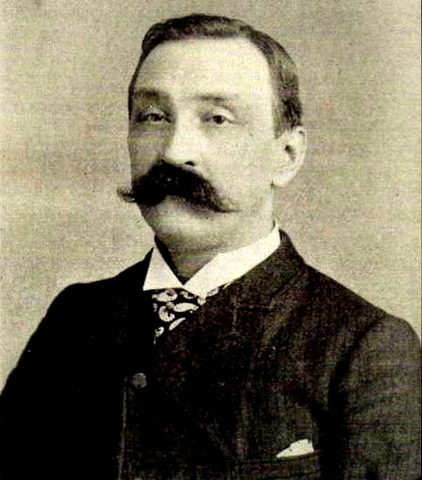
Adjutant-General George Moorman
_____
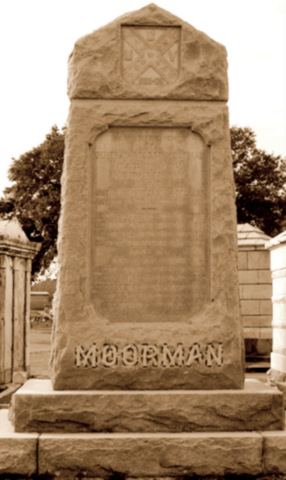
Metaire Cemetery, New Orleans, Louisiana
SACRED TO THE MEMORY OF GENERAL GEORGE MOORMAN, ADJUTANT
GENERAL AND CHIEF OF STAFF OF THE UNITED CONFEDERATE VETERANS
JULY 2ND 1891 TO DECEMBER 16TH 1902.
HE DIED SUDDENLY IN THE MIDST OF THE GREAT WORK TO WHICH
SO LARGE A PART OF HIS LIFE HAD BEEN DEVOTED. WHEN SCARCELY
24 YEARS OF AGE, HE HELD THE RANK OF COLONEL AND WAS IN
COMMAND OF A REGIMENT OF CAVALRY AT THE CLOSE OF THE CIVIL
WAR.
ERECTED BY HIS COMRADES AND FRIENDS 1908 |
_____
GENERAL UNDERWOOD
General Lee here also moved that the rules be suspended in order
that the constitution be so amended as to re-establish the Department
of the Northwest, heretofore so ably managed by General John C.
Underwood, and which had been abolished by the new Constitution.
The motion was seconded. The Chair said, is the convention ready
for the question; when the motion was put and unanimously carried.
The Chair then said, there being no objection the ayes have it
and the Department is restored .
---
The Chair. The Constitution provides that a notice be sent out
three months in advance of a Reunion to every camp of the United
Confederate Veterans. If the comrade wishes now to recognize the
distinguished services of General Underwood, it is always in order
to offer a resolution of thanks
. General Chalaron, Mr. President — The great value of the
magnificent labors performed by General Underwood, is known to
us all, and I move that he be invited to the stand.
The Chair: I hereby request Adjutant General Moorman and General
Chaloron to escort General Underwood to the stand.
"While waiting for General Underwood to reach the platform,
General Peyton Wise advanced to the front of the stage and said:
Mr. President and my Comrades, I desire to move that the Chair,
our beloved General Gordon, appoint a committee to wait upon Mrs.
Jefferson Davis, the widow of our dead President, and her daughter,
Mrs. Hayes, and invite them to a seat upon the stage, in order
that this Convention might give them the honor due, which was
carried by acclamation.
The Chair appointed General Peyton Wise and Comrade Taylor Ellyeon
for this distinguished service.
By this time General Underwood had reached the stage, and the
Chair in introducing him, said:
''I now introduce to you a man who has rescued from oblivion more
graves of Confederate soldiers buried on Northern soil than any
other Southern man."
General Underwood was greeted with loud applause as he advanced
to the front of the platform. He began by saying:
"Mr. President and Comrades, Ladies and Gentlemen —
To say that I am not glad to be here would be the veriest falsehood
that could be uttered from any breast. The first service I did,
little or great, was in the city of Richmond. The first vote I
ever cast was in the city of Richmond. I had to run away from
home, so to speak, being the only man of my name from Kentucky
who was in the Southern Army. (Cheers).
Continuing, he said: "It was my misfortune to have been captured
about the middle of the war, and to have served in four Northern
prisons over a year, and the rest of the time as prisoner on parole,
as Mr. Stanton would not meet the overtures made by Mr. Ould,
of Virginia, for my exchange."
General Underwood here explained the manner in which he had obtained
government recognition to secure the four cannon captured from
Confederates, also the cannon balls which were placed at the base
of the grand Confederate monument, at Oakwoods, in Chicago, built
mainly through his patriotic labors.
General Underwood then explained the work he had done in connection
with the Confederate monument in Chicago, and the noble work he
had performed in caring for the graves of our dead Comrades all
over the North, and he was frequently interrupted by applause.
He then unfurled a flag that had been handed to him by a young
lady (Miss Grigsby) a short while before he came upon the platform.
The flag was of historic interest, having figured in the war.
General Underwood's allusion to the flag and his tribute to the
valor of the Southern soldier elicited hearty applause.
---

GENERAL UNDERWOOD'S FINAL REPORT OF
HIS ADMINISTRATION AND DEDICATION
OF CONFEDERATE MONUMENT
AT CHICAGO.
United Confederate Veterans,
Division and Provisional Department Headquarters.
Chicago, January 20th, 1896.
General John B. Gordon,
Commanding United Confederate Veterans.
Sir and Comrade:
I have the honor to make final report of the condition of the
Division and Department under my command, give a synopsis of the
statistics of Confederate soldiers who died in military prisons
and are buried in Northern soil, and especially herald the procedures
incidental to the erection and dedication of the monument to 6000
Southern soldiers whose remains are trenched in Oakwoods Cemetery,
Chicago.
Pursuant with powers originally granted by the ex-Confederate
Association of Chicago, Camp No. 8, United Confederate Veterans,
afterwards approved by yourself, as per orders and other official
documents issued from the office of your Adjutant-General, and
by authority delegated through subsequent election by the United
Confederate Veteran federation itself, I recruited and organized
into Camps a large number of Confederate Veterans living east
of the Mississippi river within the limits of my Provisional Department,
collected and reported rosters of the Confederate dead buried
in various Northern cemeteries.
The general conditions of my Divisions, so widely separated, are
good, and have been referred to in detail in my biennial report
under date of April 20th, 1894, and the mortuary lists, cemetery
charts and other data relating to deceased soldiers buried within
the territorial bounds of my command, which were given in part
in said biennial report and subsequently compiled more fully and
published in supplement thereto, are now revised and presented
in final tabulation, as follows:
WAR PRISON CEMETERIESREVISED NUMERICAL ROSTER OF CONFEDERATE
SOLDIERS WHO DIED IN MILITARY PRISONS AND ARE BURIED IN NORTHERN
SOIL
---
(See original at: https://archive.org/stream/proceedingsseria01unit#page/n448/mode/1up)
---
Total number of interments deceased prisoners reported 23,552
(Official Note). Record and Pension Office, War Department,
Washington, January 17, 1896
General John C. Underwood, Chicago, Ill.
Many of the Confederate prisoners who died in confinement at Fort
Delaware were buried at Finn's Point, N. J., but no roster of
those buried there is known to be in existence. No record has
been found of any prison at Finn's Point, N. J., nor has anything
been found to show that any Confederate prisoners were ever confined
at that place.
By authority of the Secretary of War: F. C. AINSWORTH, Colonel
U. S. Army, Chief of Office.
There are possibly 100 Confederate soldiers buried in the Soldiers'
Home National Cemetery at Washington, D. C , and doubtless an
aggregate of a few hundred more at other points, but the total
of such interments throughout the Department, recorded and unknown,
will not vary materially from the number reported above which
will approximate 24,000 (unless there were many more deaths at
Fort Delaware than reported.).
The mortuary rosters heretofore reported and filed with the Adjutant-General
embrace the list of Confederate soldiers who died in military
prisons, and, besides recording their names, give dates of deaths
in all cases and, with few exceptions, the companies, regiments,
and States from whence the deceased hailed, so that it will be
an easy matter to ascertain desired information covered by such
records.
The foregoing tabulated statements have been compiled from data
mainly furnished by the U. S. War Department, and, in no instance,
has the battlefield dead been considered.
Special reference is hereby made to the good condition of the
Confederate Cemetery at the Government arsenal near Rock Island,
and much praise and sincerest thanks are due to General D. W.
Flagler, Chief of Ordnance, U. S. A., for accomplishing such work.
MONUMENT TO CONFEDERATE DEAD AT CHICAGO
In this connection I make synoptical reference to the construction
and dedication of the monument erected over the Southern dead
buried in Oakwoods Cemetery, Chicago, and demonstrations incidental
thereto, giving below a classified account of receipts and expenditures,
balanced, aggregating on both credit and debit sheets nearly $25,000
(which would have amounted to a much larger sum, had my four years'
services and the value of the floral contributions from the South
been estimated), as follows:
FINANCIAL STATEMENT
(See original at: https://archive.org/stream/proceedingsseria01unit#page/n451/mode/1up)
By deducting the cash in the hands of the Secretary of
the Citizens' Committee from the aggregate ($24,647.52 —
$75.92), the remainder of $24,571.60 will represent and cover
the total outlay.
Note: A detailed statement of bills receivable and payable, under
final audit, with copies of the certificates of their correctness
and approval are to be found in the addendum of my book.
The descriptive references to the ceremonial of the dedication,
reception of the Confederate Generals, and other Southern guests,
their entertainment by the good citizens of Chicago, Cincinnati,
U. S. Army officers at Fort Thomas, Ky., are made in the special
work following, which is also replete with orations, poems, speeches
and prayers and embellished with engravings and etchings of the
prominent actors, other distinguished personages, the monument
and its accessories.
The preface hereto constitutes a historic outline of my individual
and public actions prior to and under commission from you and
the Veteran Federation, relating to things pertinent to the United
Confederate Veterans, the Confederate dead buried in the Northern
States and the general Northern-Southern movement toward establishing
harmonious social and business relations between the two great
sections of the United States. This, together with the body of
the book and addendum, containing various documents for reference,
to prevent repetition, are referred to and hereby made part of
this report as to matters applicable through the discharge of
duties assigned, and otherwise considered admissible, because
of conveying information given in channels interesting to the
South and its people.
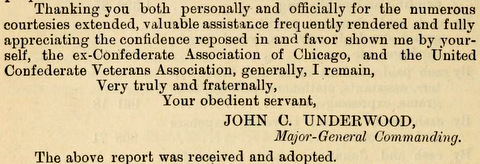
Thanking you both personally and officially for the numerous courtesies
extended, valuable assistance frequently rendered and fully appreciating
the confidence reposed in and favor shown me by yourself, the
ex-Confederate Association of Chicago, and the United Confederate
Veterans Association, generally, I remain,
Very truly and fraternally,
Your obedient servant,
JOHN C. UNDERWOOD,
Major-General Commanding.
The above report was received and adopted.
_____
_____
General Gordon announced that the next order of business was to
hear from the committee in regard to the matter of the Battle
Abbey and receive their report.
The
following resolutions constitute the report of the committee to
the United Confederate Veterans:
Resolved,
That the general committee be authorized to report progress to
the United Confederate Veterans and ask that this committee be
discharged, and immediately succeeded by a trustee, to be selected
by the representatives of each division of the United Confederate
Veterans here assembled, who shall be authorized and directed
to obtain a charter for the incorporation, which trustees so appointed
shall be named as incorporators in said charter.
Resolved,
That this committee recommend to the United Confederate Veterans
the adoption of the form of the charter presented by the executive
committee.
Further
resolutions were passed suggesting that the general commanding
should call a meeting of the trustees without delay, and also
that the report of the committee be presented at 11 o'clock this
morning and that Colonel Dickinson present his proposal from Mr.
Rouss to the gathering.
The
report of the Executive Committee, as presented by Colonel Mcintosh,
recommended that the purposes of the memorial hall should be vigorously
pushed, but that it was the belief of the committee that the cause
could be greatly forwarded by the abandonment of the work by a
committee, and the adoption of a charter by the United Confederate
Veterans for this expressed purpose.
In connection
with such representations the Executive Committee presented a
proposed charter, which had been carefully drafted by Colonel
Mcintosh, and especially designed to meet the requirements of
the case.
The
charter provides for the naming of a board of incorporators under
the corporate name of Confederate Memorial Association, who shall
be trustees, to be named by the commanders of each of the divisions
of the veterans, and discards the name of "Battle Abbey,"
and adopts the building of the "Confederate Memorial Institute,"
as the object of its incorporation.
THE
PROPOSED BATTLE ABBEY CHARTER
The
charter offered by the committee, and which was adopted, and will
be presented to the general body, is as follows:
Petition
for charter.
To __________,
The
petition of __________ shows:
First,
that they desire for themselves and their associates and successors,
to be incorporated under the name of "The Confederate Memorial
Association" for the period of years, with the privilege
of renewal, and with the right under that name to exercise all
the rights incident to corporations under the law of the State
of ___________, and such other powers as are herein asked.
Second.
The purpose of this incorporation is to erect at some place to
be hereafter selected, as herein provided for, a building to be
known and designated as "The Confederate Memorial Institute"
and to collect, arrange, and preserve therein, statues, portraits,
photographs and other pictures of the soldiers and sailors of
the Confederate States Army and Navy, of every rank from that
of private to that of general commanding, who served faithfully
the Confederate cause, and also of the civilians, especially of
our noble women who were devoted to the South; also, such archives,
relics, mementoes, records, histories, papers, books, orations,
poems, paintings, pictures, and literature of every kind, and
everything else illustrative of the self-sacrifice and denial
of Confederate soldiers and Sailors, and the Southern people,
their courage and heroism during said war, and their constancy
and devotion to the cause for which they fought, together with
the official acts of each of the States of the Southern Confederacy
by their legislatures and constitutional conventions, and all
debates therein, and proclamations of their Governors just before,
during, and after the war, and also other matters illustrative
of the character, life, spirit and motives of the South and her
people, including the period anterior, during, and subsequent
to the war, calculated to enable future historians to obtain such
reliable facts and data as will assist them in writing fair, accurate
and impartial history of said war and of the South, the said association
being educational, patriotic and historical for all time. And
this corporation shall have the right to compile and publish and
to have compiled and published, books, plans, charts; and other
papers and documents relating to the purposes for which it is
organized and to apply for and hold copyrights and patents necessary
for its protection, and to sell and dispose of the same.
Third.
The domicile and principal place of business of said association
shall be where said Memorial Institute is erected.
Fourth.
Said association is not to have any capital stock, and is not
organized for pecuniary gain; "but shall have the right and
power to accept, from time to time any and all donations, devises
bequests and gifts of real estate necessary for the location and
erection of its buildings and such other grounds as may be needful
for its purposes and that of "the United Confederate Veterans;"
and may also accept all donations, devises and bequests of real
estate, money, or other property that may from time to time be
made to it.
Said
association may from time to time appoint such agents or agencies
as it may deem proper to solicit subscriptions, donations, or
gifts, and receive and receipt for all money or gifts of value
whenever and wherever the same may have been made for the benefit
of the association prior to its incorporation, or that may hereafter
be made to it, and shall cause to be issued and delivered to each
and every person who has contributed or may hereafter contribute
to the association as much as one dollar — if such contributor
so desire — a certificate with the impression of its seal
thereon, certifying that the person named therein has given the
sum named to "the Confederate Memorial Association,"
and said certificate shall be of such paper, with such devices
or engravings thereon as will make it suitable and capable of
being preserved and transmitted by the holder as an heirloom to
his or her posterity.
THE
MANAGEMENT
Fifth.
The management of the said association shall consist of one trustee
for each division of "the United Confederate Veterans,"
to be selected; or who may have been selected, by each of such
divisions and their successors, whose term of office shall be
four years. That any person who was a Confederate soldier, or
a descendant of one, who may contribute as much as $100,000 to
the said association shall have the right to appoint one trustee
for the same as his or her representative for each $100,000 or
fraction thereof over $50,000 so contributed, which trustee or
trustees shall hold said office during the pleasure of such donor,
and after the death of such donor said trustee or trustees shall
hold office for life, and their successor or successors shall
be appointed by the surviving members of said board.
Immediately
after the board of trustees herein provided for shall be first
assembled, they shall be divided as equally as may be into two
classes. The terms of the first class shall be vacated at the
expiration of the second year, and those of the second-class at
the expiration of the fourth year; so that one-half of the board
shall be chosen every second year, said terms to be determined
by lot by said trustees, all of whom shall serve without salary
or compensation save and except their expenses incurred in and
about the business of said association. Said trustees shall elect
a suitable and competent person superintendent of said institute,
and a treasurer, and such other officers, agents and employees
may be necessary, whose duties shall be defined and compensation
fixed by said trustees. Said trustees may from time to time, as
to them may seem proper, sell any or all real estate, the title
to which may be acquired, except* so much as may be needed for
said institute, and shall invest the proceeds thereof together
with other money of said association, bearing interest, as an
endowment fund, and with such interest payable at such time as
may seem proper to said trustees, so as to provide a fund to defray
all current expenses necessary for the perpetual preservation
and maintenance of said Memorial Institute, its relics, archives,
etc.
The
treasurer of said association shall be required to enter into
bond, payable to said association, in such sum as may be fixed
by said trustees and approved by them, conditioned for the faithful
accounting and keeping of all funds of said association that may
go into his hands as such treasurer.
Sixth.
That whenever as much as two hundred thousand dollars shall have
been given in money or other valuable things and real estate,
the cash market value of which, with the money so given, will
make a sum equal to two hundred thousand dollars, independent
of so much real estate as may be needed for a site for said institute,
the said trustees shall proceed to select a place or location
for said institute and acquire title thereto and erect thereon,
under the supervision and according to the plans and specifications
of a competent architect, a fire proof building of suitable and
proper dimensions for the purposes for which it is designed as
hereinbefore stated.
Seventh.
Until said association shall come into possession of as much as
$200,000 for its use and benefit, exclusive of the real estate
necessary for the building and curtilege, the management of its
affairs in soliciting subscriptions, gifts and donations, etc.,
shall be in the hands of a superintendent to be elected by said
trustees, whose compensation and the expenses of whose office
shall be fixed by them, to be paid monthly by the treasurer of
said association, upon the warrant of said superintendent. And
in order to raise a fund to defray the necessary expenses of the
association, until the said sum of two hundred thousand dollars
shall have been raised, the treasurer of the said association
shall be and is hereto authorized to collect any and all moneys
that have been deposited for the use of this association whenever
the same may be, and that which may hereafter be deposited, and
deposit the same in a bank to be designated by said trustees to
the credit of the "Confederate Memorial Association,"
to be drawn out alone upon the check of the treasurer of said
association, and said trustees shall invest said money by loaning
it at interest for a time not more than twelve months, secured
by a first mortgage upon unencumbered real estate at not exceeding
seventy-five per cent, of its assessed valuation at the best rate
of interest obtainable, payable monthly; said loans to be made
at the expense of the borrowers.
Eighth.
Whenever a vacancy occurs in the Board of Trustees by death, resignation,
removal or otherwise, the division wherein the same has occurred
shall, at its next reunion or convention, fill such vacancy by
the selection of another trustee, within one year after such vacancy
occurs, or, whenever, there ceases to be an organization of divisions
of the United Confederate Veterans as vacancies occur in said
Board of Trustees, the survivors thereof shall appoint such successors.
Such appointments to be made of Confederate Veterans or the descendants
of Confederate Veterans. It being the object and purpose that
this association shall be forever under the management and control
of Confederate Veterans and their descendants.
Ninth.
That the Confederate Memorial Association shall be under the auspices
of the United Confederate Veterans, so long as such organization
shall exist, and once in each year, so long as reunions are held.
At the general reunion of said United Confederate Veterans, said
Memorial Association, through its Board of Trustees shall make
detailed and full report of the condition and affairs of said
association.
Tenth.
The Board of Trustees herein provided for may adopt a common seal
and alter the same at pleasure, and may adopt by-laws for their
government, not inconsistent with the provisions of this charter,
and may appoint an executive committee composed of three of their
members with power to act for it in the management and details
of its business.
General W. H. Jackson of Tennessee made a motion that the report
be received, and that the States shall now proceed to name the
Board of Trustees, with the accompanying recommendation in regard
to the charter, and the charter itself to be also referred to
the Board of Trustees now to be selected, one member from each
of the States, and that the delegates will now select that member
to represent their respective States upon that Board of Trustees.
On motion
of General Jackson, of Tennessee, the report was received adopted
and referred to the Board of Trustees.
Colonel
Mcintosh, of Mississippi, offered an amendment to the proposed
charter of the Battle Abbey, providing- that Mr. Charles Broadway
Rouss on account of his well- known liberality ia donating $100,000.00
without condition, or reference to location, be permitted to name
one representative for himself on the Board of Trustees, which
was seconded and carried.
Upon
inquiry by one of the delegates, the Chair stated that not only
each State should have one representative on the Board of Trustees,
but also each division outside of the States, thereby making provision
for an equal representation on that Board of the Indian Territory,
Oklahoma Territory and the District of Columbia.
Comrade
F. A. Monroe, of Louisiana, said: It should be clearly understood
in the interest of the movement what Mr. Rouss' proposition is.
A great deal of confusion and doubt exists as to whether the original
proposition holds good; whether in that Charter the original condition
is observed, because if changes have been made, in any respect,
it will alter the original proposition.
"Question,
question, question," and great confusion.
General
Gordon: As far as I understand the question, I will attempt to
clear the apprehension of every member of this convention. Changes
have been made in the conditions, but no change has been made
in Mr. Rouss' proposition, except to increase, to enlarge, to
magnify that great memorial until it shall be worthy of the grand
cause which it is to commemorate. That great-hearted comrade not
only multiplied his subscription by five, making his proposition
for $500,000, but I will undertake to say here to-day that whenever
the foundations are laid that if a million, or two million are
needed his heart and purse will respond to the need.
I ask
not only in my capacity as chairman, but as your brother, placing
myself upon the same plane, and upon even a lower plane in order
that I may make myself understood clearly in this matter, I suggest,
I beg, in the name of that memorial which is to indicate to posterity
a fact, that in all these ages has never before been commemorated
in stone, or marble, or brass; that memorial which will carry
down to the remotest generations the glory which you men won from
'61 to '65; I would beg in the name of that cause that .you, My
comrades, rise to the magnitude and glory of that proposition
and let us meet our comrade, meet him with as much generosity
as he has displayed to us, and let us adopt the motion offered
by General Jackson, as amended already, and leave this entire
question of locality and amounts to your Committee or Board of
Trustees.
Why,
my comrades, it is impossible that any man representing the body
of delegates who would name him as a trustee, should be tray that
trust. None of these men here at present could prove unworthy,
they stood by you in the terrible time which tried your souls,
these men are your comrades, and are true to your memories and
to any act which they may do in the body of trustees. We can trust
these men, and it is impossible to submit to a convention of this
magnitude lengthy matters like these and to discuss all these
details.
Mr.
Rouss, our comrade, having originated the plan and being intimately
acquainted with all these matters, and vitally interested, submitted
his proposition and conditions to the committee appointed by the
United Confederate Veterans, who have clearly, thoughtfully, impartially
and bravely made the Constitution of the Confederate Memorial
Association, to which cause we will lend our labors freely and
cheerfully, and with your patriotic assistance I feel assured
that those labors will culminate in a grand success at last.
---
After
a good deal of further discussion by various comrades, and an
explanation from Lieutenant-General Cabell, General Gordon said
as follows :
The
reading of Comrade Rouss’s proposition will possibly clear
the atmosphere, and I shall therefore, ask Colonel Dickinson of
New York to read the letter from Mr. Rouss.
Colonel
A. G. Dickinson, Mr. Rouss’s representative here read the
[two] letters giving his new proposition:
No. 549 Broadway, New York
June 11, 1896.
Colonel
A G. Dickinson, 945 Broadway, City;
My
Dear Colonel: Your esteemed favor of June 1st,
is before me. It is remarkable with what wonderful accuracy you
have interpreted my dream of a great memorial hall and Battle-Abbey,
dedicated to the great men and women of the South, and to the
advancement of civilization and science.
I have
never been more impressed than by the seeming inspiration of your
brilliant conceptions, and I thank you from the bottom of my
heart for your kindly assistance in the development of my plans,
you have not exceeded my wishes or my intentions, but you have
divined my purpose, and you have laid out before me a great work,
that has become in its purpose the realization of my desires.
It is no longer a dream the reality is within our grasp, and the
attainment of this object, with the co-operation of my countrymen,
can be fulfilled.
Possessing,
as you do, my entire confidence, and feeling the strength of your
sustaining influence, I hope we shall be able to accomplish, with
my means and your instrumentality on the one hand, and the combined
liberality of our people upon the other, a work that will be a
great pleasure to all who have taken or may take an interest in
it. Your thoughts, feelings and tastes are in unison with my own,
and it must be your province to represent me in doing my part
in planning and arranging the memorial hall and Battle-Abbey,
as a tribute of devotion of Southern men and women to a nation's
pride and glory. Nothing narrow or contracted has intruded itself
upon the plans which you have formulated and presented to me;
they met with my entire approval and you have my entire approval,
and you have my authority, accompanied by my best wishes, to carry
them out.
A nation
will endorse our plans, and visitors from foreign countries can
be edified by the lights of knowledge of things past and present,
which will be created as much for them as for ourselves. Although
a large factor myself, I am but an humble instrument in the hands
of my comrades and friends, to assist them in perpetuating the
glorious deeds of our heroes, I am proud to feel that I am to
be an assistant in developing the true history of our great country.
The pages that will be written from the archives will be collected
by the Battle-Abbey Association, and which has remained so long
unwritten, will be sacred to truth and justice, and I hope that
my countrymen, both North and South, will do my personal memory
the justice to believe that in offering to devote a half million
of dollars to the great objects that we wish to obtain, that I
have done it with a singleness of purpose of devotion to my fellow-man,
and an unselfish desire to honor the good and great of our country.
Your
long continued and disinterested devotion to the same object has
won for you my affection and esteem, and I trust you implicitly
to stand with me, by me, and for me in carrying out with promptness
and energy our part of the purpose of our mission. All money necessary
to carry out these plans will be placed at your disposal, and
a fund of money to the extent of $500,000 will be so arranged
that you and the rest of our associates who will constitute the
Board of Governors, can make proper disposition of it, as may
be required. To this you can consider me pledged, as well as my
heirs and assigns, and I have further the honor to state for your
information that my great pleasure will be to see the work begun
as soon as my partners, my beloved countrymen, of every State
and Territory in the South, are ready, and pushed forward to completion
with all the rapidity commensurate with prudence and good workmanship,
for some of us are getting along in years, and we must hurry up
a little if we are to be permitted to see the result of our patriotic
enterprise.
"The
Temple to the Lost Cause" must be founded upon the Rock of
Ages, its importance will develop with time, and whatever exalted
estimate may be placed upon it to-day I trust will be intensified
by coming generations of men, so that it will always stand as
a part of the history of our great Republican Government.
Your
letter describes the situation exactly, the condensed history
you have given of the proposed Memorial Hall, and all that led
up to it, my plans and agreements, I find correctly stated, and
without going into details I authorize you to fulfil my promises
by meeting the views and decisions of the convention that will
be appointed at Richmond, and who will represent the wishes of
the United Confederate Veterans as to the location of the building,
etc.
I sincerely
trust the matter will meet with no delay, but be definitely settled
at the Reunion. I am ready at any time to meet my engagements
as to this work, and wherever it is decided to build the Battle
Abbey I will be in accord with the United Confederate Veterans,
and hereby authorize you to act about the money I have advanced
as working capital as you think proper, as it is best I think
that you should be governed by surrounding circumstances. In your
letter to me you have seemingly "covered the whole ground"
in your anticipations as to what may occur if the $100,000 has
not been raised in the South. I must leave all that to you, I
know that you join me in the hope that everything will be ready
to proceed to definite and final arrangements provided "the
Temple" is to be located in one of the Southern States or
Territories. If, however, my idea is accepted, and Washington
is selected as the location, which proposition I request my countrymen
to consider dispassionately and seriously before making a final
decision, then you will proceed to make such arrangements with
the representatives of the United Confederate Veterans as you
may think necessary, and the then existing circumstances may require,
all of which actions upon your part I hereby confirm in advance.
C. B. ROUSS
Colonel A. G. Dickinson, No. 945 Broadway, City
My Dear Colonel: You have again kindly consented
to represent me in matters connected with the memorial hall and
Battle-Abbey.
All
your actions at Atlanta not only received my approval, but my
sincere thanks, and it is a great pleasure for me to know that
at the reunion of the U. C. V.'s at Richmond, you will again represent
my interests. You have my full authority to act in the premises
as you may deem expedient and right touching my promises and agreements
to co-operate with the U. C. V.'s and the people of the South
in the construction of a memorial hall, to be located as may be
agreed upon by those who have had or may have this power and privilege
conferred upon them. I request of the committee that the same
courtesies and privileges may be extended to you at Richmond as
you received at their hands at Atlanta, and I trust that the same
harmony will prevail, and a result accomplished fully realizing
our best expectations.
With
many thanks for the services you have rendered me, I am, my dear
Colonel, most sincerely and truly, your friend and comrade.
C. B. ROUSS
The Chair stated that the letters would be referred to the Trustees
for their consideration:
Colonel Dickinson's Speech
The
privilege of the floor was then extended to Colonel A. GL Dickinson
of New York, as the representative of Mr. Charles Broadway Rouss,
who was to explain the situation in regard to the Battle- Abbey
to the convention. Colonel Dickinson spoke as follows:
Mr.
Chairman, we all thoroughly understand that the question of the
location of the memorial hall is not before this convention, and
it is as well understood, I presume, that it is not the intention
of Mr. Rouss, or of his representative, to interfere in any manner
whatever with the location of that institution. It is thoroughly
understood also that $100,000 was appropriated by Mr. Rouss to
build this memorial hall, provided an equal amount was appropriated
by the people of the South. I came here as Mr. Rouss' representative
on this occasion to meet your views in regard to that matter and
to abide by the decision that might be made, whatever that decision
might be.
It was
thought that in all probability the question of location would
come up at this time, and probably be settled. It was Mr. Rouss'
desire that it should be settled by this convention, now assembled
in Richmond. I came, however, prepared for any emergency.
It was
not an emergency that you might call upon Mr. Rouss for his $100,000,
but I came prepared to give you a check for that if you should
call for it, after stating that you had raised an equal amount.
It was, however, a possibility that, in view of the cyclones that
have passed over and devastated the country, and other causes
affecting your prosperity, my comrades might have been unable
to raise the required amount; so I came prepared also to state
that Mr. Rouss is willing to delay this matter as long as you
wish — one year, or two years, or as long as it took to
raise the Washington monument, is at your disposal.
Feeling
that some emergency of this kind might arise, I addressed a letter
to Mr. Rouss upon the subject, and brought to his notice the fact
that there might possibly be a failure on your part to raise the
$100,000, and under those circumstances I desired to know if it
was his intention to build the Battle-Abbey at any rate, whether
the money was all raised or not. This generous man, this philanthropist,
is not governed by any narrow rules in regard to his charities;
they are widespread, and they are universal. This is but one item
in the great amount of charity he is doing. I wrote him a letter,
which I will read to you:
Continuing,
Mr. Dickinson read his letter to Mr. Rouss, and the reply to same.
Continuing,
he said:
I will
state that I did not think a grand Battle- Abbey could be built
for $200,000, and I stated to him what I thought, and had plans
drawn by an architect and estimates made thereon, and I placed
before him a design for a memorial abbey that would cost $750,000.
I went further and stated that the city that got this sum, would
add it to the property upon which it was built, and furthermore,
that $250,000 additional should be furnished to endow this great
institution. It is upon that basis that he writes me this letter.
Amidst
much confusion cries of Question, Question, Question.
Chaplain
J. William Jones: Mr. Chairman, I make point of order that the
whole matter has been left to a Board of Trustees.
A delegate
raised the point of order that the proposition was simply to let
one man from each division, serve in the Board of Trustees, and
not one man from each State, as stated by General Jackson in his
resolution.
Amidst great confusion and cries of Question.
The
Chair said the vote is now upon the amendment, by Colonel Mcintosh
of Mississippi.
All
in favor of the motion will say aye; contrary, no.
The
ayes have it.
Is the
convention ready to vote upon General Jackson's resolution as
amended ?
All
in favor will say aye; those opposed, no.
The
ayes seem to have it.
The
Chair: A division is asked for, and the Secretary will proceed
to call the roll of Divisions, which resulted as follows:
---
The
Chair announced the motion carried, and that the State should
now proceed to name the members for the Board of Trustees.
On motion
of General Jackson, the thanks of the convention were expressed
to the executive committee and to the officers of the Rouss memorial
for the work done by that body, for the great labor that they
have bestowed upon this work, and the good judgment displayed,
and the results achieved.
A delegate
from Texas stated that Texas had five sub-divisions, and asked
how many trustees they were entitled to.
The
Chair: Only one member from each State.
General
Jackson moved that the General Commanding be made ex-officio a
member of the Board of Trustees of the Battle Abbey.
The
Chair: It is moved and seconded, what forbids me to state, that
the General Commanding whoever he may be at any time, shall be
ex-officio member of the Board of Trustees.
The
motion is practically unanimous, only one dissenting voice.
After
much discussion, amidst the greatest confusion, regarding the
members eligible as Trustees.
General
Chalaron said, Mr. Chairman, it should be finally settled by this
Convention that no member of this Board should be selected outside
of the Confederate States.
The
Chair: Is compelled to rule all of this matter and discussion
out of order, and states that the resolution already adopted comprehends
the entire question, and informs the comrades who have participated
in this discussion that the only way of getting at the proposition
is to reconsider the vote by which the original resolution was
adopted.
A delegation
from Alabama made the point of order that all this matter was
irrelevant, and that the order of business, the selection of the
names of the Trustees be proceeded with, which was sustained by
the chair.
TRUSTEES
ELECTED
According
to the resolution previously adopted the body went into the election
of the members of the Board of Trustees of the Battle-Abbey. This
procedure took up considerable time, but it finally resulted in
the election of the following members:
Alabama
— George D. Johnston of Tuscaloosa.
Arkansas
— Major Wm. P. Campbell of Little Rock.
District
of Columbia — Win. A. Gordon,
Florida—
General W. D. Chipley.
Georgia
— General Clement A. Evans.
Indian
Territory — Brigadier-General D. M. Hailey.
Kentucky
— General J. B. Briggs.
Louisiana
— General J. A. Chalaron.
Maryland
— General John Gill.
Mississippi
— Colonel J. R. Mcintosh.
Missouri
— A. E. Asbury.
North
Carolina — Thomas S. Keenan of Raleigh.
Oklahoma
— John O. Casler.
South
Carolina — Dr. B. H. Teague.
Tennessee
— General W. H. Jackson.
Texas
— General L. S. Ross.
Virginia
— Colonel John B. Cary.
West
Virginia — Colonel Robert White of Wheeling.
Comrade
Allen Barksdale moved that the Commander-in-Chief be made ex-officio
President and member of that Board, which was seconded. Carried.
---
The Chair will embrace this opportunity of announcing that when
this Board of Trustees has been appointed, its first meeting will
be at the rooms of General W. H. Jackson, No. 212, at the Jefferson
Hotel, to-morrow morning at 9 o'clock.
Colonel
Jno. B. Cary was appointed on the Board of Trustees as Virginia's
representative, Vice General Fitzhugh Lee, absent from the country.
Comrade
S. A. Cunningham, editor of the Confederate Veteran was recognized
and made a brief statement in reference to his paper.
---
Appendix
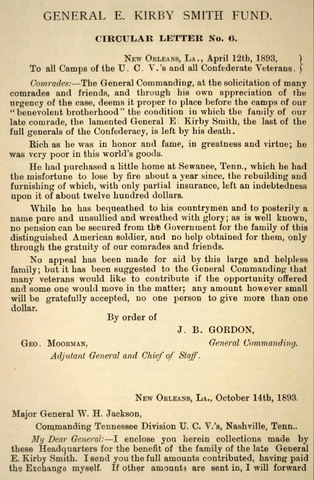
General E. Kirby Smith Fund
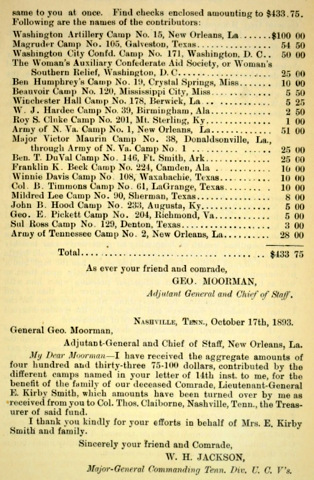
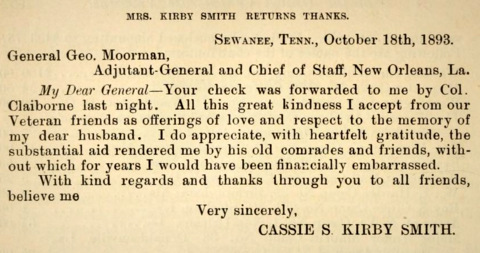
_____
Nashville 1897:
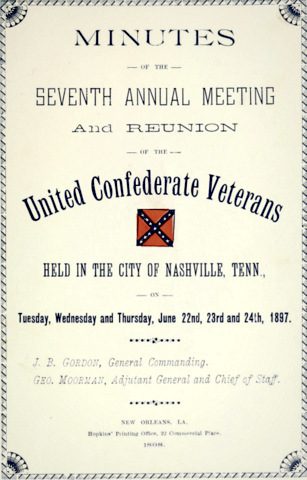
---
First Day's Proceedings
---
DIXIE
WAKES 'EM UP
The
first real outbreak was created when the First Regiment Band began
playing "Dixie."
The
dear old tune raised the people from their seats and their hats
from their beads. Cheer after cheer shook the building. It lasted
as long as the music did, rising and falling like the waves of
a mighty ocean. Other tunes were played, but few elicited such
enthusiasm
The second volcanic eruption, as it were, occurred when General
Joe "Wheeler arrived and was escorted to the platform. With
him were his four daughters, Misses Lucy, Annie, Julia and Carrie,
accompanied by Mrs. Micajah Clark, of Clarksville. General Wheeler
bowed his thanks as he took his seat, while the band played "The
Bonnie Blue Flag."
---
Second Day's Proceedings
---
PRAYER BY REV. DR. D. C. KELLEY.
At the
conclusion of the singing Rev. Dr. D. C. Kelley who had served
throughout the entire war with Forrest as Major, Lieutenant, Colonel
and Colonel of Forrest's old Regiment, led in a prayer the words
of which went straight to the hearts of all present in burning
and eloquent words he prayed that God's blessings might rest upon
the convention, upon the old Confederates, upon their families
and loved ones; he prayed for the President of the United States,
for the glory of the nation, and thanked God that he had given
to the nation such men as the Confederate soldiers. He prayed
for Queen Victoria and thanked God for her wise and prosperous
reign over the mother country. Dr. Kelley concluded by asking
all present to join him in the Lord's prayer and the lips of thousands
again moved in audible supplication to him who watches over all
alike.
_____
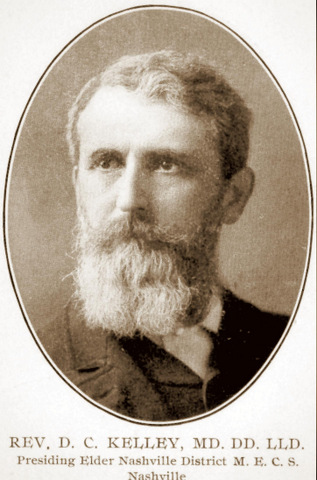
---
Rev. D.C. KELLEY, D.D., was born in Leesville, Wilson
County, Tenn., in 1833; and died in Nashville in 1909.
He was sent as a missionary to China by the M.E. Church,
South and for years did very noble work. On his return
to America he organized a company of cavalry which was
called Kelley's Troop and which served under Gen. N.B.
Forrest and was with that gallant commander during the
war. D.C. Kelley so distinguished himself for coolness
in action and bravery in face of danger that he was rapidly
promoted, being made major of battalion. He was elected
lieutenant colonel of Forrest's Regiment the day before
the battle of Shiloh and took the duty in the battle of
Murfreesboro. He was on Forrest's staff as chaplain and
aid. Afterwards he commanded a regiment, then a brigade
till the end of the war, winning a brilliant reputation
as "Forrest's fighting preacher."
At the end of the war he was made pastor of several of
the largest Methodist Churches in Tennessee. Here his
influence for good was widely felt, as in his upright
life and true Christianity, he was an example of what
a noble man should be.
(Source: Confederate Veteran, August, 1909)
---
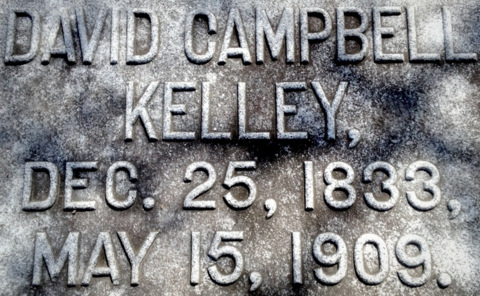
Mount Olivet Cemetery, Nashville |
_____
The Chair announced that the reading of the report
of the President of the Confederate Memorial Association was next
in order. Gen. W. D. Cbipley of Florida,
the President, was recognized and read as follows:
Nashville,
Tenn., June 22, 1897
To
the United Confederate Veterans, in Seventh Annual Reunion
Assembled:
Comrades:
It becomes my duty as President of the Board to submit the first
annual report of the Board of Trustees of the Confederate Memorial
Association. In pursuance of the authority delegated by your body
at the Richmond Reunion, a charter was obtained and the Confederate
Memorial Association was organized at Lookout Mountain, Tenn.,
September 2, of last year. At that meeting I was elected President
and Gen. Clement A. Evans, Vice President, and the Fourth National
Bank of Nashville, Treasurer. An Executive Committee was appointed,
as provided by the charter, consisting of Gen. W. H. Jackson of
Tennessee, Chairman; Gen. L. S. Ross of Texas, Gen. Robert White
of West Virginia, Gen. Jos. B. Briggs of Kentucky; the President
of the Board of Trustees being ex-officio a member of the Executive
Committee. The Executive Committee met and organized at Nashville,
Tenn., on October 10, 1896, and elected John C. Underwood, of
Kentucky, Superintendent and Secretary of the Association. Superintendent
Underwood entered upon his duties with enthusiasm and energy,
but was confronted with many difficulties directly connected with
the affairs of the Association and his new work was seriously
handicapped by the all-absorbing political situation.
Superintendent
Underwood has succeeded in placing in the hands of the Fourth
National Bank as Treasurer of the Association from old subscriptions
the sum of $9,410.57. He has secured new contributions of $10,500,
and has organized plans approved by the Executive Committee from
which success is confidently expected.
The former administration of the affairs of the Association variously
estimated the subscriptions at from $15,000 to $16,000, but an
effort to cash the subscriptions and place the money in bank developed
several duplications of the reported contributions, amounting
to about $1,000. Contributions amounting to about $4,000 are withheld,
and I would recommend that your body adopt a resolution, requesting
that all moneys held for the Confederate Memorial Association
be paid on drafts of the Superintendent and Secretary, countersigned
by the Chairman of the Executive Committee, the same being made
payable to the Fourth National Bank of Nashville, Tenn., the bonded
Treasurer of the Association.
The thanks of your body are due the Tennessee Centennial Association
for the liberal and unconditional contribution of one-third of
the net proceeds of revenue to be derived from admissions on June
22, 23, 24, and to Superintendent Underwood for having provided
a display of fireworks on the nights of the same days for the
benefit of the C. M. A. All of these several occasions, the Exposition
in the day and the fireworks at night, should be generally and
liberally patronized by the Veterans and their friends in the
interest of the cause.
I desire
to assure my comrades that much and very valuable preliminary
work has been accomplished, and while it would not be beneficial
to the work now in hand or interesting to your body to enter upon
the details, I feel warranted in repeating the assurance that
your next Reunion will witness the consummation of the work entrusted
to the Board of Trustees of your Memorial Association; and I desire
to say further that this assurance is made after a full and frank
conference with other members of the Executive Committee and Superintendent
Underwood who have had direct charge of the work and who endorse
my assurance.
The
expenses of the work conducted under the present organization,
like that of our predecessors, have been borne by Comrade C. B.
Rouss, whose liberality has rendered it, unnecessary for the Board
to use any contributions, a policy that will continue to govern
the Executive Committee.
It is
the avowed purpose and agreement of Mr. Rouss not to take the
amount advanced for expenses from the $100,000 which he has agreed
to turn over to the Association, whenever the Association has
raised a similar amount.
To set
at rest many reports in relation to the location of the fire-proof
Memorial Building which it is designed to erect, I will state
that the Board of Trustees have this matter entirely in their
charge, as provided in the charter, comrade Rouss assuring the
Board that it will be left entirely to their judgment and decision.
It is the understanding of the Board that until the full amount
has been provided that no decision will be made, and up to this
time no discussion relative to the location has been had by the
Board. It is well known to every Veteran and to every sympathizer
that valuable relics, literature and illustrations of the Southern
Cause are scattered throughout the South. Many of these are in
insecure buildings, and while it is true that many of them are
under the charge of the women of the South, who by their devotion
to their care, but continue to illustrate and emphasize their
patriotism during the war, yet, when the generation now passing
away shall have been removed by the inevitable operation of time,
it is but a reasonable apprehension that many of these things
which we should preserve in the interest of true history will
be ultimately lost. The importance, therefore, of preserving in
a fire proof building with proper endowment the things which will
tend to perpetuate the history of the Southern Cause must necessarily
impress every Veteran and every sympathizer.
I would respectfully suggest that the United Confederate Veterans
in their Seventh Annual Reunion call upon every Camp of thirty
members and less, to pledge not less than $5; all Camps of more
than thirty and less than fifty members $10; all Camps with more
than fifty and less than one hundred members $15; and all Camps
of more than one hundred members $25. With this assistance from
the Camps and the realization of the plans now in operation, your
next Reunion will witness the consummation of the important work
entrusted to your Board of Trustees, and we believe that at your
next Reunion you will be called upon to fix a time for the laying
of the corner stone of a Memorial Building, in which will be gathered
and preserved the archives of our Southern Cause, an established
center to which patriotic thought will turn long after our personal
reunions have ceased.
The
Board of Trustees under the present incorporation were:
*W.
D. Chipley, President, Pensacola, Fla.
C. A.
Evans, Vice President, Atlanta, Ga.
W. H.
Jackson, Chairman Executive Committee, Nashville, Tenn.
J. B.
Briggs, Russellville, Ky.
*J.
A. Chalaron, New Orleans, La.
*Robt.
White, Wheeling, W. Va.
*D.
M. Hailey, Krebs, I. T.
John
M. Hickey, Washington City, D. C.
*A.
G. Dickinson, Hotel Marlbrough, New York City, N. Y.
Wm.
P. Campbell, Little Rock, Ark.
*A.
E. Asbury, Higginsville, Mo.
*L. S. Ross, Waco, Texas.
John
B. Carey, Richmond, Va.
Geo.
D. Johnston, Tuscaloosa, Ala.
*J.
R. Mcintosh, Meridian, Miss.
J. A.
Casler, Oklahoma, Okla.
*B.
M. Teague, Aiken, S. C.
*Thos.
S. Kenan, Raleigh, N. C.
John
Gill, Baltimore, Md.
Terms
of those whose names are marked with star expire in 1900, others
expire in 1898.
The
death of Col. Wm. P. Campbell, of Arkansas, is announced, and
the resignations of Col. A. E. Asbury, of Missouri, Col. J. R.
Mcintosh, of Mississippi, and Gen. John Gill, of Maryland, have
been received. Under the charter the Divisions of the respective
States are required to fill these vacancies within one year at
their next Reunion or Convention.
Respectfully
submitted by order of the Board,
W. D.
CHIPLEY, President
_____
From
San Francisco Call, Volume 80, Number 97, 5 September
1896:

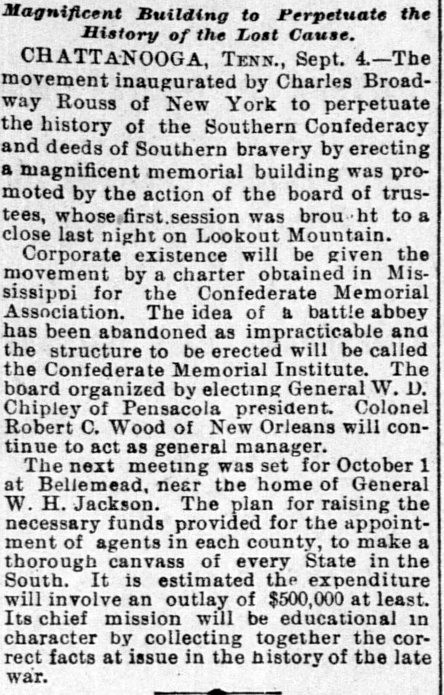
_____
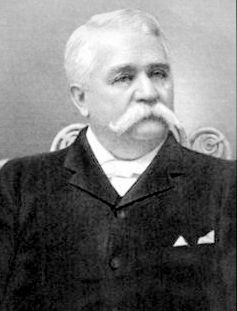
William Dudley Chipley
Buried in Linwood Cemetery, Columbus, Georgia
---
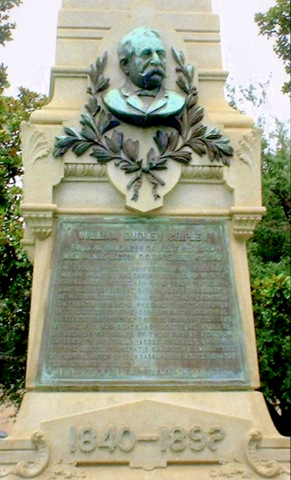
Chipley Monument, Plaza Ferdinand VII, Pensacola
Soldier - Statesman - Public
Benefactor
On the battle field he was without fear, and
without reproach. In the councils of the state,
he was wise and sagacious, and in his pubic
public and private benefactions, he was ever
alert and tireless. The history of his life
is the history of the up-building of West Florida,
and its every material advancement for two decades,
bears the impression of his genius and his labor.
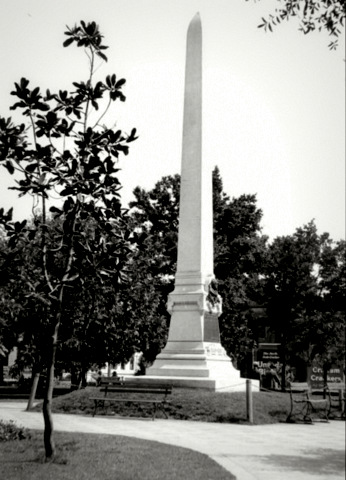
|
|
_____
.jpg)
_____
Atlanta, 1898:
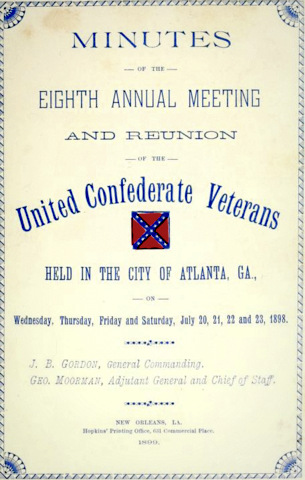
---
FIRST DAY'S PROCEEDINGS
Wednesday,
July 20th, 1898
The
Eighth Annual Reunion of the United Confederate Veterans assembled
at the Auditorium in Piedmont Park, at Atlanta, Ga., on, Wednesday,
the 20th day of July 1898, at 11 a.m. with one thousand one hundred
and fifty-five Camps represented.
---
General Gordon took the gavel and said :
It is
my pleasant duty to promise you now the treat of the occasion.
I have the honor to present to you a one-armed Confederate Soldier,
a silver-tongued orator, and a golden-hearted brother. We shall
now hear from General Charles E. Hooker, of Mississippi, the orator
of the day.
General Hooker was greeted with deafening applause, and received
a splendid ovation, his fame as the Chrysostom of the South having
preceded him, and the old Veterans were anxiously waiting to catch
the golden words as they fell from his lips.
He spoke as follows :
"Comrades
! Soldiers of the Army and Navy of the Confederacy, Daughters
of the Confederacy, Sons of Confederates, Ladies and Gentlemen:
"Standing on the soil of a State which gave to the Confederacy
so many intrepid soldiers, from the gallant Colonel Bartow, who
fell at the first battle of Manassas, shot through the heart,
down to the last charge of Lee's army, led by another Georgian,
your own illustrious commander, General John B. Gordon; standing
here, in the gateway city to the gulf, in hearing of the guns
of Peachtree battle ground, and almost in sight of the line of
Kennesaw mountain, so gallantly defended by General Johnston,
and which he regretted he had ever given up, close to the battlefields,
dyed with the blood of your heroic comrades, — I greet you
as the survivors of the greatest war waged in all the annals of
time.
"It
was a war, my comrades, waged not for conquest; not for pelf ;
not for ambition, but in maintenance of the great cardinal principle
of home rule and community independence, which lies at the foundation
of the government which our fathers builded, after the trials
and tribulations and bloodshed of the seven years' war of the
Revolution.
---
"The| Confederate flag gathered around it a galaxy of great
military leaders — Robert E. Lee, Albert Sydney Johnston,
Joseph E. Johnston, Beauregard, Longstreet, Bragg, Polk, Ewell,
Hardee, Breckenridge, Pat Cleburne, Dick Taylor, Hood, Price,
McCullough, Semmes, D. H. and A. P. Hill, Pickett, Stuart, Bedford
For rest, Morgan, Ashby, Edward C. Walthall, Benjamin Humphries,
Wade Hampton, Mathew Butler, Stephen D. Lee and Joe Wheeler."
---
"General Bedford Forrest was a natural warrior, bred in no
school that taught the art of war, he taught war to his followers
by his sublime courage and utter disregard of danger. Seriously
wounded in one of his numerous battles, he received an order to
hold his command in readiness to meet an expected raid from Memphis.
Though not able to sit his horse, his answer was, 'with one foot
in the stirrup, I go to execute your order.' "
_____
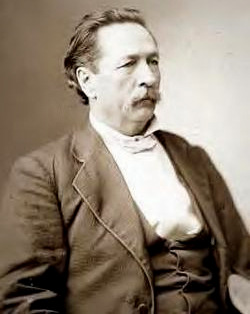
_____
HOOKER, Charles Edward, a Representative from Mississippi;
born in Union, Union County, S.C., in 1825; raised in
Laurens District, S.C.; attended the common schools, and
was graduated from the Harvard Law School in 1846; was
admitted to the bar in 1848 and commenced practice in
Jackson, Miss.; district attorney of the river district
1850-1854; member of the State house of representatives
in 1859; resigned to enter the Confederate Army as a private
during the Civil War; became lieutenant and later captain
in the First Regiment of Mississippi Light Artillery;
promoted to the rank of colonel of Cavalry; elected attorney
general of Mississippi in 1865 and the same year was removed
with the other officers of the State by the military authorities;
again elected in 1868; resumed the practice of law in
Jackson, Miss.; elected as a Democrat to the Forty-fourth
and to the three succeeding Congresses (March 4, 1875-March
3, 1883); delegate to the Democratic National Convention
in 1884; elected to the Fiftieth and to the three succeeding
Congresses (March 4, 1887-March 3, 1895); again elected
to the Fifty-seventh Congress (March 4, 1901-March 3,
1903); continued the practice of law in Jackson, Miss.,
where he died January 8, 1914; interment in Greenwood
Cemetery.
(Source:
http://bioguide.congress.gov/scripts/biodisplay.pl?index=H000758;
viewed 4/15/2014)
____
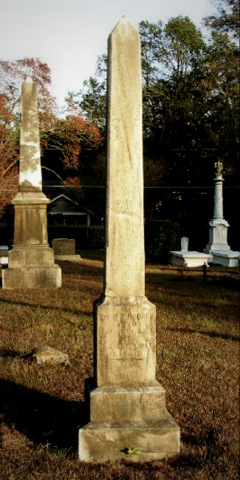
Greenwood Cemetery, Jackson, Mississippi |
_____
Second Day's Proceedings, Thursday, July 21, 1898
---
THE BATTLE ABBEY
General
Clement A. Evans, chairman of the Memorial Association, which
has in charge the erection of the new Battle Abbey, rendered the
following report of that organization, giving the Con federate
Museum to Richmond:
"To
the United Confederate Veterans in Convention Assembled:
The Board of Trustees of the Confederate Memorial Association
respectfully report that at their meeting held in Atlanta on Wednesday,
July 20, 1898. they adopted a resolution selecting the city of
Richmond, in the State of Virginia, as the logical and appropriate
place to locate the proposed Confederate Memorial building, and
they have charged the Executive Committee of said Trustees with
the duty of arranging the necessary details to carry the same
into effect. And to that end the said committee has been authorized
to open and conclude negotiations with the people of Richmond
through appropriate Confederate organization, or in any other
way they may deem best to accomplish the object desired.
" The Trustees take pleasure in conveying to the Convention
the information that the management of the present Confederate
Museum, in Richmond, have indicated their wish to actively co-operate
with said committee in securing a site for the proposed building,
and their willingness to convey, in fee simple, the title of its
property to this Board of Trustees, to effectuate the general
purposes of the Confederate Veterans in preserving their records,
relics, etc.
" Offers of a substantial character were also made by other
cities, whose claims were strongly presented by their representatives.
" We believe that the selection of the place for the building
will stimulate and quicken the efforts of comrades everywhere
to assist us, upon whom they have placed the responsibility in
carrying out to a successful termination the noble work in hand.
No one unacquainted with the business affairs of the Trustees
knows how much anxiety exists nor how personal sacrifices in time
and money, on the part of each of us, have been made during the
period of our service as the representatives of the divisions
of the different States. We earnestly solicit your hearty co-operation
in our future efforts."
As soon as General Evans had finished reading the report of the
Battle Abbey Committee, there was a great shout of applause from
every part of the Auditorium.
General Gordon: "The Convention has heard the report of the
Chairman stating that Virginia has been selected by unanimous
vote for the location of our Southern Battle Abbey, and the Chair
feels authorized in saying, whatever claims might be set up by
other cities, or other States, he knows he reflects the sentiment
of every noble heart in saying to Richmond and Virginia, 'Our
hearts and hands are with you.'
---
MRS. JOHNSON, NEE SANSON [Sansom]
Mrs.
Johnson, nee Sanson [Sansom], who is known in history as a Confederate
scout and who at the age of fourteen years rode behind General
N. B. Forrest on one of his most noted raids, was then introduced
to the Convention, and was greeted by the Veterans with cheers
and applause. On motion of J. R. Crow, of Sheffield, Ala., she
was made an honorary member of the Association.
When 3400 Federal troops had made their way to the rear of the
Confederate army and were headed for a cannon manufactory with
the intention of destroying it. General Forrest went against them
with 1200 men.
General Forrest's strategic movements are well known and the capture
of this superior force of Federal troops occupies a prominent
place on the pages of history. Mrs. Johnson at that time rode
behind General Forrest and guided him, and in this way materially
aided him in the capture of the foe.
---
Third Day's Proceedings, Friday, July 22, 1898
---
Hon.
Charles W. Bacot, who represented the interests of Charleston,
spoke as follows:
"It is
a high honor as well as a personal privilege, combined with profound
pleasure, to be the spokesman of the 'Old City by the Sea' to
you. Confederate comrades, in this the 'Gate City of the South,'
for the purpose of inviting you to hold your next annual convention
at Charleston.
"The City Council of the municipality of Charleston and the
greater municipality of the whole people of Charleston, have commissioned
me and my committee to bid you come to Charleston in 1899, and
in so doing the freedom of the city is granted to you and the
hospitality of all her citizens is extended. Let me tell you why
you should come to Charleston. In the first place, your conventions
have heretofore been held in the Northeast, the Northwest, the
Southwest and the central sections of the Confederate territory,
but never before in the Southeast section and on the sea coast.
"In the second place you will have an auditorium capable
of accommodating comfortably and easily 10,000 guests, if need
be, facing broadside to the broad Atlantic, with splendid beaches
in front miles in length, and standing against a background of
South Carolina's armorial trees and other foliage, the blue billows
and the buoyant breezes of the sea to bathe the aching feet and
to fan the sun-bronzed brows of Veterans, and to rejoice the hearts
of their daughters and sons.
"Forts Sumter and Moultrie, the sites of the Stevens Battery
and Battery Wagner, on Morris' Island, and other sacred memorials
of the dead past, all in your view to inspire you and awaken glorious
memories, and perhaps the mighty American navy, recently immortalized
by Dewey, Schley, Ilobson and Bagley, dancing on the surface of
the waters as living witnesses to a reunited country on which
territory it may be said, the sun now never sets.
"But the most especial reason is that it is fitting that
your convention should give expression of farewell in this closing
century, of our once high hopes in that spot which first gave
them birth. Your refusal of our invitation to the birth place
of the Confederacy, remember, may be construed by some into a
condemnation of, or at least an apology, or a regret, for the
'lost cause.' Were our renowned chieftain and hero here, General
Wade Hampton, as we all hoped he might be, he would join with
me in urging upon you the higher claims of Charleston.
"By the shades of Lee and Jackson, Albert Sidney and Joseph
E. Johnston, Beauregard and Bragg, and those other immortals whose
names with theirs were not born to die, we invoke your coming
to Charleston and receiving our royal welcome.
"Confidently waving the banner of welcome, we make a Confederate
assault upon the citadel of your votes, and carrying them with
the irresistible Confederate 'yell,' we lead you all captive at
our will.
"Dearly beloved brethren, sisters and daughters, as well
as brothers and sons of the Confederacy, can you say us nay?"
General George W. Gordon, of Memphis, representing the Tennessee
delegation, seconded the nomination of Charleston.
---
Mr. George S. Legare, of Charleston, was the last speaker. He
made a telling speech, impressing it upon the delegates that Charleston
was the proper place for the next reunion.
---
The Chairman announced the result of the vote and the Charleston
supporters greeted their victory with prolonged cheers.
_____
Charleston, 1899:
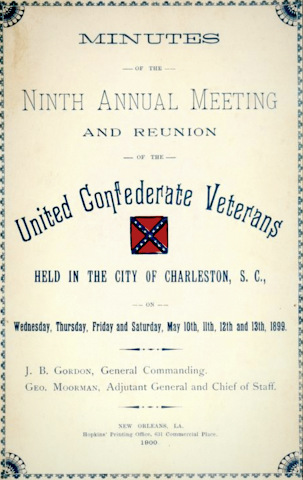
---
When the Convention was formally called to order by Gen. C. I.
Walker, on behalf of South Carolina, at.haif past 10 o'clock,
the orchestra played "Dixie," and the business was start
ed with such a throb of feeling as goes through every Southern
audience at the playing of this air.
---
When Gen. Walker, with the historic Secession gavel, called the
Convention to order, the Auditorium was well filled and an immense
crowd outside the Auditorium trying to get in, the crowd inside
and out numbering from twelve to fifteen thousand. Gen. Walker
was received with applause, and spoke as follows:
"As
the commander of the home division it is my duty to call to
order this distinguished gathering. Charleston asked you at
your last Convention to meet here, at the birthplace of secession.
She welcomes you with some of the most sacred emblems of that
historic past. To the St. Andrews's Society, in whose hall the
Secession Convention of South Carolina held its sessions, we
are indebted for the use of the valued historic relics to which
I now refer.
“The
gavel which I hold in my hand and with which I have called you
to order, was that which called to order that grand body of
patriots which, on December 20, 1860, passed the Secession Ordinance.
“Your
commander and the department commanders are now sitting in the
very chairs used by the officers of the Secession Convention.
“I
rap on the table on which lay the Ordinance of Secession, which
was fraught with such terrible consequences to South Carolina
and the South.
“Will
our chaplain general, the Rev. Dr. J. William Jones, now invoke
the divine blessing on you, the men who so nobly vindicated
the principles which were born in the shadow of these precious
relics."
When
Gen. Walker presented the historic gavel and rapped on the table
on which the Ordinance was signed there was an outburst of applause.
An Earnest Prayer
The
U. C. V. Chaplain General, Rev. Dr. J. Wm. Jones, a soldier
of the Army of Va., an eminent divine, delivered an earnest
prayer, in which he said :
''Oh,
God ! our help in ages past. Our hope for years to come. God
of Israel. God of the Centuries. Lord of Hosts and God of Battles.
God of our Southland, and God of our common country; we bring
Thee the adoration and praise of grateful hearts as we gather
in our Reunion to-day.
"We
humbly thank Thee for all of the circumstances of mercy and
of grace which surround us. We thank Thee that while during
the past year the grim reaper has been busy, and so many of
our comrades have stepped out of ranks and crossed over the
river, yet so many of us have been spared, and are here to-day
to meet and greet each other once more, to breathe this balmy
air, and to receive the hearty welcome of this battle-scarred,
historic, patriotic city.
"And
now. Oh, Lord! we ask that Heaven's richest blessing may come
down upon and abide with this meeting.
"Bless,
we beseech Thee, our commander, that his life and his health
may be precious in Thy sight, and that he may be long spared
to lead his people; and bless all of our officers, and all of
our delegates. We ask that Thou wilt graciously preside over
this great assembly, and that nothing may be done or said which
Thou wilt not approve. And we beseech Thee, Oh Lord! that Thou
wilt bless all of our Confederate Veterans wherever they may
be to-day; that Thou wilt make them true to the duty of the
hour, and the interests of our common country, but that Thou
wilt forbid that they should ever forget, or fail to teach their
children the great principles of constitutional freedom, which
our fathers established, and for which we fought in the brave
old days of 1861-65.
''May
our Loving Father provide for our needy comrades, their widows
and orphans, and so smile upon and prosper our Southland that
we may have the sweet privilege of taking care of them.
"And
now, Oh ! Lord, we beseech Thee, to bless thy servant, the President
of the United States, and all in authority under him, that we
may have wise laws and good government. Bless every section
of our common country, that we may have fruitful seasons, plenteous
harvests and returning business prosperity, but, above all,
grant that ours may be in reality, and not merely in name, a
Christian land, and that great problems that are before us may
be properly solved by the great solvent of the ages —
the Gospel of our Lord, Jesus Christ.
"Hear,
O ! God, we beseech Thee, this, our opening prayer, and grant
these, our humble petitions; pardon for Jesus' sake, our many
sins, sanctify and save us, since we ask and offer all in the
name and for the sake of Christ, our dear Redeemer. Amen !"
This
beautiful and appropriate prayer was listened to with profound
attention, the entire assemblage rising to their feet, and as
soon as the chaplain general concluded, the band played "Nearer
My God to Thee," and as soon as the strains of the sacred
music died away, the ceremonies attending the welcome commenced.
---
GEN. MOORMAN'S ADDRESS
Gen. George Moorman, of Louisiana, was then presented by General
Gordon and delivered the "Memorial Address" of the
day.
He said: Mr. President, Ladies of the Memorial Association of
Charleston, Comrades, Ladies and Gentlemen:
In one of the most beautiful legends of antiquity, a story is
related that one of the mightiest kings in history, when ready
to start upon his warlike expeditions repaired to the tombs
of his ancestors, there to receive inspiration and courage.
Upon one of these visits to the abodes of the dead, he met in
those sacred precincts, a delegation of his warriors and leading
subjects from his provinces, who to his salutation: " What
doest thou here?” Replied, ''We seek justice, O
King, at thy hands."
---
Certain it is that no such combination of the heroic, the pious
and the gentle, has ever been seen upon earth, and history has
placed his name amongst the Immortals,
"Though his earthly sun has set,
Its light shall linger round us yet,
Bright — radiant — Blest."
Next, passes in review the figure of one who, if his labors
had ceased here on the 12th day of April, 1861, would have been
classed with those whose names can never die, as his fame is
inseparably interwoven with the gloom and glory of this great
city and people, as well as of the whole South,
"There is a page in the book of fame —
On it is written a single name,
In letters of gold, in spotless white,
Encircled with stars of quenchless light ;
Never a blot that page has marred,
And the star wreathed name is Beauregard."
---
"While the troops in old Virginia were eating their scanty
rations, or were resting upon their arms upon some bloody field,
the left wing, under Kirby Smith, Dick Taylor, Price, Cabell,
Marmaduke, Shelby and others, were moving forward to battle,
and as the sounds of their muskets would cease firing, the center
under Bragg, the Johnstons, Hood, Polk, Cleburne, S. D. Lee,
Forrest, Wheeler, Morgan, Wm. H. Jackson, Cheatham, Buckner,
Breckenridge, Stewart, and others would move forward to the
harvest of death; and as the smoke of battle was clearing away
from the left and center, the bugles of Hampton, Stuart, Fitzhugh
Lee and Ashbv would sound for the charge upon the right wing,
and the mighty guns of Lee, Beauregard, Jackson, Gordon, the
Hills, Pickett, Heth, Ewell and Earlv would echo over the hills
and in the smiling valleys of the old Dominion.
---
Second Day's Proceedings, Thursday, May 12, 1899
---
During the day the orchestra rendered delightful music for the
entertainment of the old soldiers.
The Convention then adjourned until to-morrow at 10 A.M. The
band played "Dixie," and the veterans shouted themselves
hoarse as they filed out of the building
---
Third Day's Proceedings, Friday, May 13, 1899
---
Dr. J.L.M. Curry's Address:
---
"I have made that reference for a purpose; those men and
those glorious women who periled all in the defense of States'
rights were not governed by mere sentimentality, nor by prejudice,
nor by hatred, nor did they act in haste, but they acted properly
Aden those men who fell and those who survived in that great
struggle, had behind them purposes as pure and right as those
of he Eternal God.
---
"I affirm it with some knowledge of history, and not being
unfamiliar altogether with what has been written about women
in other ages and other countries, and I affirm Mr. President,
that the future of the South and our families rests upon the
women of the South. Prior to the war, their loveliness,
refinement, purity of character and should, their great and
never-ending sacrifices in the hours of peril and danger has
never been approached in any other country."
---
THE CONFEDERATE MEMORIAL ASSOCIATION
Gen. Clement A. Evans [President], of Georgia, then presented
the Confederate Memorial Association report, which reads as
follows:
Charleston May 11, 1899
The board of trustees of the Confederate Memorial Association
submitted to the Convention the report of the of the executive
committee as their own report, which was adopted after full
consideration. The trustees are highly gratified by the result
of the year's faithful work which has been done by the executive
committee, whose members have assiduously, faithfully and intelligently,
at no little personal sacrifices, given their attention to the
very important interests committed to their care. They are happy
in being able to report the favorable progress which this report
exhibits, and their convictions that the end of the long struggle
to establish our great memorial institution is near at hand
and that we will see with pride the fulfillment of our patriotic
Confederate hope.
The following is the report of the executive committee which
was adopted, as above stated, as the report of the board of
trustees: ''To the Board of Trustees, C. M. A., Your executive
committee respectfully submit the following report:
" We have held five meetings of the committee during the
year; one in Atlanta, two in Richmond, one in New York, and
one in Washington.
"The conferences held with the Confederate Memorial Literary
Society of Richmond, Va., having in charge the Confederate Museum,
in that city, have been entirely satisfactory, and the Society
has by formal resolution signified its readiness to promptly
co-operate with us in every way possible to insure the successful
completion of the work contemplated by this organization.
"The
superintendent and secretary has submitted a detailed report
from which it appears that:
"There is on deposit in the Fourth National Bank in Nashville,
Tennessee, the sum of $7,292.53; that he has obtained subscriptions
available when the full amount of one hundred thousand dollars
has been secured, $42,025; that he has further contributions
promised amounting to $4,500. The subscription of Charles Broadway
Rouss, on which he has authorized us to draw at sight, $20,000,
$100,000. Total is $153,817.53.
"So that we have only $46,182.47 to raise in order to secure
the whole amount to meet Mr. Rouss' munificent donation, and
when this is obtained we shall have the sum of two hundred thousand
dollars.
"And in this estimate we do not include the value of the
Confederate Museum property at Richmond, nor do we include the
sum of $6,026.96, reported to be in the hands of the Tennessee
Centennial Exposition Company, but which as we understand will
be paid over to our Association whenever needed for actual use.
"It will thus be seen that the work of the Association
is in a most satisfactory condition, and there is every reason
to hope and to believe that before our next annual meeting the
whole sum needed to begin the erection of our memorial building
will have been secured.
"The trustees have for several years devoted their time
and expended their personal funds in the prosecution of this
work, and the executive committee has borne and especially heavy
part of this burden.
"The superintendent reports that there was a balance due
him on May 1, 1899, on account of salary and expenses of $7,715.50.
"We have
been much pleased to know that the selection of Richmond as
the city in which the memorial building is to be located meets
with general approval, and we were especially gratified to learn
from Mr. Rouss that it meets with his most cordial approbation."
Respectfully submitted by the executive committee: Robert White,
chairman; Thomas S. Kenan, J. Taylor Ellyson, J.B. Briggs.
Clement A. Evans, ex-officio .Respectfully submitted as the
report of the board.
CLEMENT A. EVANS, President
---
After the adoption
of the report of the board of trustees of the Confederate Memorial
Association presented by its president, General Clement A. Evans,
of Georgia, General Jno. B. Gordon introduced to the Convention
Gen. Jno. C. Underwood of Kentucky, the Superintendent and Secretary
of the Confederate Memorial Association.
General Gordon said:
"Allow me to present to you Gen. Jno. C. Underwood of Kentucky,
the man who raised the money and erected the noble monument
over the Confederate dead at Chicago, and who is now doing so
much to secure the funds with which to build
the memorial edifice at Richmond. He should receive thanks of
all Confederates, and will have the gratitude of all Southern
people."
_____
_____
General Underwood then said:
"Mr. President and Comrades, Ladies and Gentlemen: It is
greatly embarrassing to be presented to you so flatteringly,
when I can but feel it is undeserved, but, sir, (turning to
the president), I sincerely thank you for the kind words you
have spoken, and I hope my future acts may enable me to deserve
some of them."
And again facing the audience he spoke to the
Veterans as follows:
"It is true that many years ago I raised the money and
builded a monument over the Confederate dead at Chicago, and
have, in a manner, given my life to the service of the Lost
Cause and have the purpose of perpetuating a true history of
the Southern people during the civil war so strongly engrafted
on me that it is considered by many my hobby. I reckon it is.
However, it is the purpose of the man from his heart, without
exception of other than legitimate reward, being willing to
give credit to all and no desiring to rob anyone of the smallest
right.
"Having met with such considerable success in my endeavors
toward raising funds to erect the proposed memorial buildings
at Richmond, as have been indicated by the report just read,
I determined to try an secure a collection of magnificent portraits
of the most distinguished Confederate generals with which to
embellish it at the time of dedication.
"Therefore, independent of my undertaking to raise the
money to construct the memorial building, I began securing a
fund with which to secure the paintings I desired. Not having
all the money necessary myself, but feeling confident of being
able to raise it, I contracted with Prof. E. F. Andrews, the
director of the Corcoran School of Art, at Washington, D.C.,
for the paintings in oil of said portraits, every one of which
should be companion pieces in excellence of portraits of Martha
Washington, Thomas Jefferson and others by the same artist,
now hanging in the east room of the White House, and for which
the Government paid from $2,500 to $3,000 each, and received
the portrait of Dolly Madison, so long on an easel in the White
House blue room parlor, (the best of all of them), as a specimen
sample of the work to be done on each of the portraits of generals
to be painted. There, next to the right upper box facing the
stage, is the picture of the most noted and beautiful mistress
of the nation's Capital palace, and the artistic work on the
dress alone has give fame to Prof. Andrews. The portrait next
to the left upper box is the best and most characteristic likeness
of the world's great natural soldier, Forrest, as he came out
of Fort [Donelson] on the snow covered ground, bespattered with
mud and dust, a realism of art, portraying a hero at the start.
On the right next the lower box is your own beloved Hampton,
taken from an early picture, when he first donned his spurs,
wherein the superb man is made manifest from brow to heels,
with canvas back of tapestry and displaying the sword he wore,
which was captured by his grandfather from Col. Tarleton, the
British dragoon, during the 'Revolution,'
and afterwards he had mounted with gold and tortoise shell,
and on the left next the lower box is the portrait of your peerless
president, the renowned Gordon, a fearless leader, who was at
the forefront at the finish, the picture representing the General
in regular Confederate uniform, and the head considered by the
artist painter as one of his best works of art. Again, on the
right next the stage is the best representation in existence
of the Napoleon of the war, "Stonewall" Jackson, with
landscape surroundings of the Shenandoah Valley, where his great
generalship was first displayed; wearing his old colonel's coat
with wreath and stars sewed on the collar, and the only cap
of its pattern in the army, with hair and whisker painted from
locks of the same furnished me by his wife, the face considered
the best and that in the book of Col. Henderson, of the English
army. Last, on the left next stage, is the portrait of the incomparable
Gen. Robert E. Lee, the Christian gentleman, the great commander,
placed first by foreign nations; possessing the confidence and
affection of his men, and the greatest respect and fear by his
opposing army. He stands with old field uniform, with the sword
of A.P. Hill, borrowed for the occasion of taking the photograph,
with his grand, noble face, that needs no encomium other than
the expression it conveys.
"The portrait of Lee belongs to the Association, those
of the other generals belong to me, and will be given to the
South at the proper time, when there shall be a place to put
them. I propose to donate twenty such portraits, all equal in
excellence with the others, but I do not desire to thrust myself
upon the Convention of the South, and I desire to know whether
my proposal meets with approval, and if my people will accept
the service proffered. I thank you for the courtesy of attention
and for the great applause, because of purpose."
At the conclusion of Gen. Underwood's speech General Gordon
came to the front as said:
"The South owes Gen. Underwood a lasting debt of gratitude
for his continued, unswerving services in its behalf, not only
for the care of its dead in Chicago, but for the grand work
he has in hand, and is so successfully advancing; and I ask
that this Convention shall express its unbounded gratitude to
him, and say to our friends and the people everywhere that if
fully endorses his action and approves of the good work he is
doing."
Whereupon he put the question and by unanimous vote the Convention
complimented Gen. Underwood as suggested by the Chair amidst
enthusiastic applause.
-
_____
Relics from Charleston Reunion:
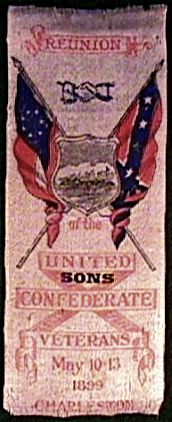
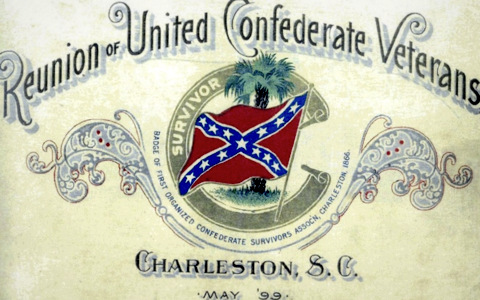
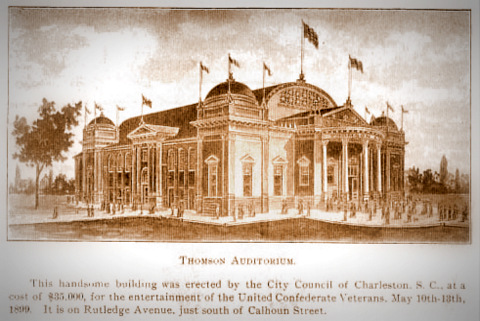
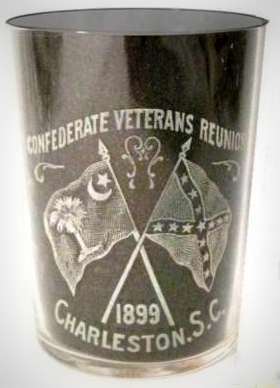
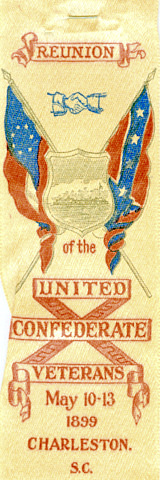
_____
Louisville, 1900:
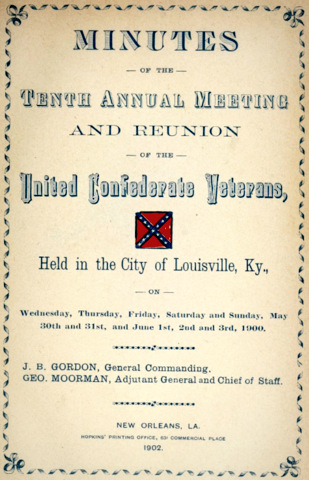
---
First Day’s Proceedings
Wednesday,
May 30, 1900
---
DR. JONES' PRAYER.
The
U. C. V. Chaplain General, Rev. Dr. J. Wm. Jones, a soldier of
the Army of Northern Virginia, an intimate friend both of General
Robt. E. Lee and Stonewall Jackson, delivered an earnest prayer
in which he said:
"We
thank Thee, oh God for thy mercy and grace under which we gather
in this annual Reunion. We thank Thee that so many of our comrades
are left, and permitted to assemble here in this great city, giving
thanks for Thy blessings, and praising Thee forever.
"We
pray that richest blessings be showered on all Confederate Veterans
everywhere, and also that Thy richest spiritual blessings may
be their portion. We thank God for the large number of Christian
soldiers still in the ranks. We thank Thee for the Daughters of
the Confederacy, who are doing such a noble and self-sacrificing
work all over our fair Southland. We also give Thee gracious thanks
for the Sons of Confederate Veterans, they also are devoting their
best talents to the upbuilding of our beloved cause, that cause
for which their fathers suffered and died on the battlefield.
"And
now Oh Lord we pray thy blessings upon this Reunion, be with us
in our work, guide us in the way we should go, and after we have
disbanded for another year go with us to our homes, and have us
in Thy keeping, and we shall praise Thee forever and forever.
Amen !"
---
Music by the Band — " My Old Kentucky Home."
Address
of welcome on behalf of the Board of Trade, by Colonel Thomas
W. Bullitt.
Colonel
Thomas W. Bullitt spoke for the Louisville Board of Trade. He
said:
---
Your
leaders in war have continued to be leaders, because they were
worthy. But side by side with them, equal in dignity, equal in
intellect and in energy in every state and in every walk of life,
stand those whom they led as privates in in the ranks.
If,
in this city, you shall inquire for the leading merchants and
business men, among them will certainly be named Capt. George
C. Norton, enlisted as a private in the Eighth Georgia Infantry;
Hairy Weisfinger, a private in Morgan's cavalry, and Gen. John
B. Castleman enlisted as Captain in John H. Morgan's squadron,
all active and distinguished members of the Board which I have
the honor to represent.
Ask
who for thirty years have stood as leaders among professional
men, and you cannot fail to hear the names of Dr. David W. Yandell,
Rev. John A. Broaddus and Prof. Whitsitt, the latter a private
in Forrest's cavalry.
Ask
whom you will for the leading citizens of this State, and you
will surely hear named among them Simon Bolivar Buckner and Basil
W. Duke.
And
what exists here exists throughout the South. And not alone in
our Southland have the energy and power of the old Confederate
Soldier been shown. Wherever the fates have landed him he has
stood a man among men, the peer of the greatest and the best.
Judah
P. Benjamin accomplished at a single bound what no other foreigner
ever achieved — a place at the head of the English Bench.
Mr. Lamar, Cabinet Officer and Justice of the United States Supreme
Court, stood the equal of the ablest among his associates.
To-day
no surgeon in New York outranks Dr. Wyeth, enlisted as a soldier
in Forrest's command.
And
John Inman, cotton factor and banker, holding his own among the
giants of finance, as the man who first directed attention and
guided foreign capital to the South; to whose knowledge of her
resources and whose energy in action and in advice are due Birmingham
and that great system now developed into the Southern railway
— the source owes to him an untold debt of gratitude.
SOUTH'S
DEBT OF GRATITUDE.
Doubtless
the common federate Soldier would ultimately have led him into
the true course of duty. But for the promptness and thoroughness
with which this result was achieved, the South stands indebted,
beyond all other influences, to the wisdom, the advice and the
example of the great leader who then and always held their confidence,
their esteem and the boundless love of their hearts.
Fellow
soldiers of the Confederacy, I have seen the tomb of Napoleon
Bonaparte, the most splendid monument ever erected in honor of
a world hero; I have seen the mausoleum, on the banks of the Hudson,
in which lies the body of Gen. Grant, a magnificent tribute of
a great people to a great man; I have seen the monuments erected
by the English people to their national heroes. Lord Nelson and
Lord Wellington; but I have never seen — I believe the world
does not contain — a monument which so uplifts the soul,
which so arouses the affection, the pride, the love of glory and
the love of duty, which so touches the heart of an entire people
— as does the recumbent statue of Robert E Lee in the Chapel
of Washington and Lee University.
Veterans
of the Confederate army, in the name of the Board of Trade, in
the name of all our people whom it so worthily represents, welcome
to Louisville and to Kentucky.
---
GENERAL BENNETT
H. YOUNG.
Presentation
of the Building to the Commanding General by General Bennett H.
Young, Chairman of Reunion Committee:
After
the song Gen. Bennett H. Young was introduced by Commander Poyntz,
and the greeting he received was second only to that accorded
the Commander-in-Chief of the Veterans. Gen. Young made a grand,
impassioned speech, which kept the Veterans cheering at the end
of almost every sentence.
IMPERISHABLE
GLORY FOR THE SOLDIERS OF THE SOUTH.
Gen.
Bennett H. Young Pays An Eloquent Tribute To the Gray Old Veterans.
Gen.
Bennett H. Young spoke as follows:
Mr.
Commander and Comrades: This hour witnesses the realization of
long cherished plans and the fulfillment of years of hope. The
Confederates of Kentucky, with great desire, have longed for a
meeting of the survivors of the "Lost Clause" within
the limits of this Commonwealth, and now, that you have come,
in so far as they control or command the happenings of this occasion,
there is no good thing they would withhold from you.
---
From defeat we
won imperishable renown. Losing, we have crowned our dead nation,
its heroes and its living people with a glorious immortality.
Wonderfully illustrious record ! There are no stains on the Southern
shield. Confederate men and women did all they could do. They
were defeated, not because they were wrong or unfaithful in any
respect whatever, but because an overruling Providence decreed
their downfall in the solution of a divine policy for the government
of the world, into which human ken cannot pierce or venture. But
this does not dim the splendor of their heroism, the glory of
their patriotism, or the grandeur of their sacrifices.
As you
entered the city of Louisville from the south two objects must
have attracted your attention. The first of these was the hospital
erected by the people of Louisville for the care of the yellow
fever sufferers of the South. When the " destruction that
wasteth at noon-day and the pestilence that walketh in darkness"
hovered with death- dealing touch over the Southland, -all the
cities save Louisville shut out her refugees. Her women and her
children fleeing from this unknown, stealthy enemy, met a hearty
reception here. Hospitals were built, nurses were provided, and
these sufferers were treated with tenderest and truest care. Hundreds
of them went down in death before this horrible plague and have
found a resting place beneath the soil of Kentucky. These acts
on the part of the city of Louisville speak in truer tones than
all the eulogies I could pronounce of the love of the people of
Louisville and Kentucky for the men and women of the South.
At the
head of one of the great thoroughfares of the city of Louisville,
as you enter its limits, you behold a splendid monument. It was
erected by the Confederacy. It has upon it only three words, and
these are " Our Confederate Dead." Mark you, comrades,
these words, " Our Confederate Dead." Sleeping on our
hillsides, down along the valleys, in solitary graves or in its
cemeteries, beneath the sod of our Commonwealth, rest at least
6,000 of your immortal dead; all the States of the Confederacy
are represented there, and we regard as the richest of our treasures
the ashes of your brave, which the disasters and calamities of
war have left in our keeping. We have not only cared for our dead,
but we have cared for yours, and at Danville, Cynthiana, Lexington,
Louisville, Paris, Frankfort, at Georgetown, Nicholasville and
Richmond are monuments — the evidences of our faithfulness
and our devotion to the memory of our Confederates who found the
end while battling in our State.
These
dead came from homes in Florida, where the roses never fade and
the flowers never cease to bloom, and where men are valiant and
intrepid; from the mountains and the hills of the great Empire
State, Georgia, always patriotic, always true; from the valleys
and plantations of South Carolina, where mingle in such richness
the blood of the Huguenots and Anglo-Saxon creating a knightly
manhood worthy of every call which duty makes; from North Carolina,
that wonderful Commonwealth, whose soldiers, in all our great
battle fields, exhibited a courage and heroism, and suffered a
decimation that stands unparalleled; from Virginia, whose soil
drank so much blood of our precious dead and whose sons portrayed
a valor and chivalry worthy of the cavaliers from whom they sprang,
and worthy of her who has given to our country countless wealth
in military and civil patriots; from Tennessee, that great volunteer
State, the spirit of whose people no calamity could break, and
whose love of country shone with a lustre that no misfortune could
dim. They came from the plains of Alabama, whose offering of more
than 40,000 gallant sons attested the zeal and loyalty of the
Commonwealth within which was organized the Confederacy; from
the Deltas of the Mississippi, whose soldiers by their impetuous
heroism on all the great battle fields, from the Father of Waters
to the Atlantic, have made a glorious memorial which will abide
forever; from the prairies of Texas, whose children breathe freedom's
air and who catch noblest courage from the chainless winds which
sweep her boundless plains; from Arkansas, whose soldiers at home
and abroad filled out the highest measure of manliest devotion
and unfaltering bravery in defense of Southern rights. There are
heroes here, too, from Louisiana who, with the fire and dash of
the French, possessed the dogged determination and unfailing patience
of the Anglo-Saxon, who won renown and glory upon every field
on which they fought; from Missouri, whose men, expatriated and
exiled, never ceased to love that holy cause to which they had
consecrated their splendid manhood and whose sufferings on a hundred
battle fields showed costliest sacrifice men could make for liberty
and right. And Maryland, chivalrous Maryland, whose horsemen and
footmen always ought the head of the column, who gloried in marching
where dangers were thickest and in whose Confederate soldiers
the world has an example of intrepidity, constancy and fearlessness,
which will forever shine on the escutcheon of their native Commonwealth
with a brilliancy and glory which no future can pale and no heroism
surpass .
---
THE ORATION OF THE DAY.
Rev.
Dr. B. M. Palmer, of New Orleans, La., the orator of the day.
[Note
— This matchless oration is inserted here in the proceedings
in the order in which it was delivered as it should be in the
possession of every camp, and of every Veteran of the South, and
will be preserved as one of the most beautiful gems of Confederate
literature .
Dr.
Palmer was known to most all of the Veterans present, and is one
of the most beloved Divines in the South, and stands easily primus
inter pares.
This
oration and the masterly and eloquent style in which it way delivered,
is considered by all who heard, and have read it, as the orator's
greatest effort, and takes rank as one of the greatest orations
of the century.
Adjutant
General.]
When General Gordon introduced the Rev. B. M. Palmer, D. D., of
New Orleans, who are the orator of the day, there was another
remarkable demonstration, men rose from their seats, threw their
hats into the air and ladies waved their handkerchiefs, and enthusiasm
was at its highest pitch.
General
Gordon introduced Rev. Dr. B. M. Palmer, as follows:
General
Gordon said: And now my hearers, I have the pleasure, does that
sound strong enough, I have the great privilege of presenting
to you, as the orator of the day, our beloved brother and friend
of the Confederate Veterans everywhere, the friend of humanity,
a soldier of that great array represented here and above, an almighty
champion of right and of truth, our beloved brother Dr. Palmer.
And
now, my comrades, and especially those good people upon the stage
and in the galleries, let me appeal to you to keep silence while
Dr. Palmer will speak words of great eloquence and power. Let
him have your attention.
The Rev. Dr. B. M. Palmer, spoke as follows:
Confederate
Veterans and Fellow Citizens:
Accustomed through sixty years to address public assembles, I
am nevertheless subdued with awe in your presence to-day, for
we stand together under the shadow of the past. It is the solemn
reverence one might feel in the gloom of Westminster Abbey, surrounded
by England's illustrious dead. Indeed, we are here, the living
representatives of countless comrades, who sleep in lonely cemeteries
throughout the land; where perchance a single monumental shaft
is the ghostly sentinel keeping watch over the bivouac of the
dead.
---
Shall I point
you to the Communists of modern France? The fatal song of the
Syrens, luring the unwary mariner upon the rock of Scylla, breathed
no more seducing accents than those of " Liberty, Equality,
Fraternity," which roused the passions of the wild enthusiasts
dancing around the Tri-color of the French revolution. But,the
true import of those insane ravings was soon read amid the horrors
of the Bastille and the Guillotine until the world stood aghast
at the frightful spectacle of crime and blood. And burning Paris,
spared by the conquering Prussian only to smoulder beneath the
torch of her own incendiaries, tells the bitter fruit of that
radicalism sweeping like a whirlwind over Europe and America;
and which, unless checked by the power of God, will yet sack the
world and lay the earth in ashes at His feet.
___
Sword
Over the Gown’s Historic and
Prophetic First Unveiling
From The Atlanta Constitution,
May 31, 1900:
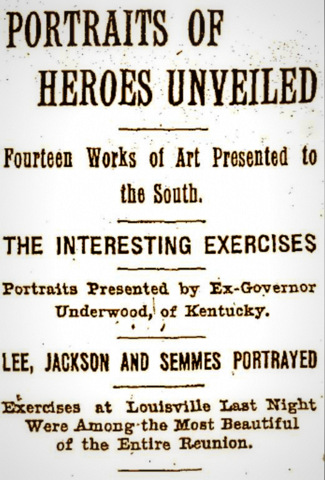
PORTRAITS OF HEROES UNVEILED
Fourteen Works of Art Presented to the South
The Interesting Exercises
Portraits Presented by Ex- [Lt.] Governor Underwood,
of Kentucky.
Lee, Jackson and Semmes Portrayed
Exercises at Louisville Last Night
Were Among the Most Beautiful of the Entire Reunion.
---
Louisville, Ky., May 30. – [Lt.]Governor John C.
Underwood, of Bowling Green, Ky., tonight at reunion hall,
unveiled and presented to the South fourteen life size
portraits of military, naval and civil leaders of the
Confederacy.
General Underwood had these portraits painted by E. F.
Andrews, director of the Corcoran Art Gallery School of
Art, Washington.
He chose this artist because Professor Andrews painted
the portraits of Martha Washington, Thomas Jefferson,
and Dolly Madison, that hang in the White House. The fourteen
portraits, which are insured for $30,000, will be returned
to the Corcoran Art Gallery after the reunion is over,
to remain until the Confederate Memorial Building is finished
at Richmond, Va. On thousand people were present to view
the exercises, notwithstanding the rainy weather.
Semmes as He Stood on Deck.
The portrait of Admiral Semmes was unveiled by Miss Georgia
Beckley, a niece of the Admiral. He is represented standing
on the deck of the Alabama just before the fight with
the Kearsarge.
General Wade Hampton’s portrait was unveiled by
Miss Elizabeth de Hart Smith, a daughter of Colonel Calhoun
Smith. General Hampton wears the tortoise shell sword
scabbard captured by his grandfather from Colonel Tarleton
during the Revolutionary War.
Miss Ethel Humphrey, cousin of General Thomas Churchill,
unveiled the portrait of General James Longstreet. It
has been accepted by General Longstreet and Mrs. Longstreet
as and accurate likeness.
“Stonewall” Jackson’s portrait was unveiled
by Miss Annie May Woolsridge, granddaughter of Colonel
Charles F. Johnson of the staff of General Buckner. Mrs.
Jackson sent to the artist some of her husband’s
hair for the sake of accuracy. The cap which General Jackson
holds in his hand was worn b him at the college in Virginia
and also during the war.
Portrait of Lee Unveiled.
Miss Ida Edwards, granddaughter of Rev. E. T. Perkins,
chaplain at large for Lee’s army, unveiled the portrait
of General Robert E. Lee. The portrait was made from a
photograph taken in Richmond about the middle of the war.
The sword General Lee wears was borrowed for the occasion
from General A. P. Hill.
General Albert Sydney Johnston’s portrait was unveiled
by Miss Louise Taylor, granddaughter of General Thomas
Hart Taylor.
Joseph E. Johnston’s portrait was unveiled by Miss
Elizabeth Reynolds, a granddaughter of Eli M. Bruce, a
member of the Confederate State Congress. This portrait
is an especially good one because the artist was personally
acquainted with General Johnston.
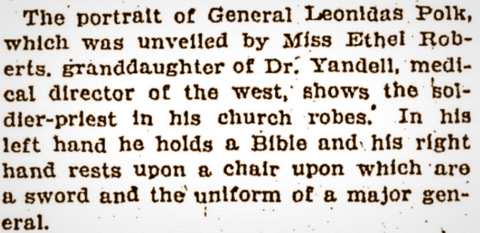
The portrait of Leonidas Polk, which was unveiled by Miss
Ethel Roberts, granddaughter of Dr. Yandell, Medical Director
of the West, shows the soldier-priest in his church robes.
In his left hand he holds a Bible and his right hand rests
upon a chair upon which are a sword and the uniform of
a Major-General.
Miss Margaret Weissinger, daughter of Captain Harry Weissinger,
unveiled the portrait of General Stephen D. Lee. General
Lee is shown leaning on a cannon, he having started in
the service of the Confederacy as a captain of artillery.
Miss Francis Breckinridge Stelle, of Kentucky, unveiled
the portrait of her grandfather, General John C. Breckinridge.
General Breckinridge is shown seated in the Office of
the War Department receiving his commission.
Likeness of Harris.
The portrait of Isham G. Harris, War Governor of Tennessee,
which so far is the only portrait in the collection of
a man from civil life, was unveiled by Miss Alice Underwood
Montford, of Nashville, a niece of [Lt.] Governor Underwood.
Governor Harris is shown standing at his desk in the Capitol
of Tennessee. Miss Roberta Buchanan, niece of the late
Colonel R. H. Thompson, unveiled the picture of General
Nathan B. Forrest. General Forrest is shown in the uniform
of a Lieutenant-Colonel of cavalry as he made his escape
through the lines around Fort Donelson. Miss Francis K.
Duke, daughter of General Basil Duke and niece of General
John H. Morgan, unveiled General Morgan’s portrait.
General Morgan stands by the side of his horse in the
snow. The portrait of General John B. Gordon was unveiled
by Miss Jessie Norton, daughter of Captain George C. Norton
of Georgia.
The state societies of the Ladies Confederate Memorial
Association today formed the Confederate Southern Memorial
Association. The state societies represented were from
Virginia, Louisiana and Arkansas.
The officers elected were: President, Mrs. W. J. Behan,
New Orleans; First Vice-President, Mrs. L. Graham, New
Orleans; Recording Secretary, Miss Daisy M. L. Hodgson,
New Orleans; Corresponding Secretary, Mrs. Julia A Garside,
of Fayetteville, Ark.
|
____
First Heroine-Saint of Grand Memory
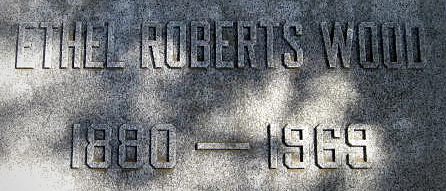
Ethel Roberts Wood
1880 - 1969
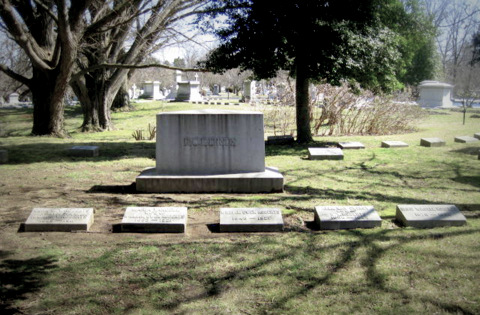
Cave Hill Cemetery, Louisville, Kentucky
|
---
SECOND DAY'S PRCEEDINGS
Thursday
Morning, May 31, 1900
---
The
meeting was called to order by General Jno. B. Gordon at 10:20
A. M. He asked that the Veterans all stand and sing that glorious
old hymn:
All hail the power of Jesus' name!
Let angels prostrate fall;
Bring forth the royal diadem.
And crown Him Lord of all !
Crown
Him., ye martyrs of our God,
Who from His altar call:
Extol the stem of Jesse's rod,
And crown Him Lord of all !
Hail
Him, the Heir of David's line,
Whom David Lord did call;
The God incarnate ! Man divine !
And crown Him Lord of all !
Ye seed
of Israel's chosen race,
Ye ransomed of the fall,
Hail Him who saves you by His grace,
And crown Him Lord of all!
Sinners,
whose love can ne'er forget
The wormwood and the gall,
Go spread your trophies at His feet.
And crown Him Lord of all !
Let
every kindred, every tribe,
Before Him prostrate fall!
To Him all majesty ascribe.
And crown Him Lord of all!
General Gordon sang with great fervor, and with his whole heart
and soul. The vast gathering rose as one man. and the thousands
of voices in accord seemed to shake the big Hall.
Prayer
by Bishop T. M. Dudley, Episcopal Bishop of Kentucky.
Almighty
God in whom we live, move and have our being, we give Thee most
hearty thanks that thou of Thy tender mercy hath permitted us
to gather once more together in this most blessed Reunion. We
thank Thee for Thy great goodness to us and all mankind through
the year that has just passed, and we do now pray that Thou will
be with us during this meeting. Guide us in our deliberations,
be with us each day, and grant that all that we do will be done
for Thy honor and glory .
Bless
our beloved Commander, bless our dear comrades wherever they are,
and after this life gather them into Thy fold, and into that great
army where all our great heroes are gathered, and there shall
be "One Shepherd and one Fold." We place ourselves in
Thy keeping, and give Thee thanks forever and forever. Amen.
---
THIRD DAY'S PROCEEDINGS.
FRIDAY,
JUNE 1st, 1900, 10 A. M.
---
REPORT OF CONFEDERATE
MEMORIAL ASSOCIATION.
Louisville,
Ky., May 31, 1900.
United
Confederate Veterans :
The
Board of Trustees of the Confederate Memorial Association take
very great pleasure in submitting for your information a statement
concerning the work of the Association during the past year. Our
success has been far beyond our expectations and we are grateful
to be able to report that on the 26th day of May, 1900, we had
cash in bank $65,210.20, and in good and reliable subscriptions
$.59,227.15, making $124,437.35. In addition to the above amount
we now have the donation of Mr. Charles Broadway Rouss of $100,000.00,
making a total amount of cash and subscriptions $224,437.3.5.
It will
be seen by the following letter of Mr. Rouss that he is thoroughly
satisfied that all the conditions made by him for the payment
of the sum above mentioned have been fully met and he has authorized
drafts to be made on him for the full amount of his donation of
$100,000.00 :
Charles Broadway Rouss,
549-553 Broadway,
New York City, May 9th, 1900
To the Confederate Memorial Association :
General
John C. Underwood, Superintendent and Secretary of the Association,
having exhibited to me evidence in the form of subscriptions to
the Confederate Memorial Association aggregating over $123,000.00,
and having produced certificates of deposit in bank and with corporations,
and displayed exchange otherwise held by him for deposit, embracing
funds collected from such sources, together with a cash guarantee
on account of unpaid subscriptions, all amounting to ninety-nine
thousand five hundred and eighty-seven dollars and sixteen cents
($99,587.16) without including various small collections deposited
locally of nearly $5000, or even depending upon the large residue
of uncollected subscriptions not guaranteed and desiring from
me a statement agreeing to pay $40,000 in two equal installments,
in addition to the $20,000, for which authority was given to make
sight draft on May 3d, 1899, and the $40,000 for which authority
was given to make two sight drafts of $20,000 each on March 20th,
1900; all in compliance with my promised contribution of $100,000
to the said C. M. A. as my duplicate of the money now in hand
and secured.
Therefore,
relying on the strict impartiality and business methods of the
Secretary and reposing entire confidence in the said Association,
I do hereby authorize the Confederate Memorial Association, through
authorized representative or representatives, to draw two additional
drafts on me at sight for twenty thousand ($20,000) dollars each,
thereby making the full $100,000 authorized to be drawn at intervals
whenever the said Association shall think proper to do so; and
it may even divide the money specified for drafts, and draw them
in ten thousand-dollar amounts, if the Association should so prefer,
always making the aggregate $100,000 by summation of all drafts
to be drawn.
And
I further wish the greatest success to the Memorial undertaking
in hand.
[signed] C. B. ROUSS
Attest
: W. ROUSS, Attorney
Augustine
Smith,
John
Underwood,
James
T. White
We cannot too cordially express our grateful appreciation for
this generous action on the part of Mr. Rouss. His intelligent
and liberal interest in the work of the Confederate Memorial Association
has enabled us to announce that we have no longer any doubt as
to the complete success of the work committed to our hands. The
name of Charles Broadway Rouss will always be held in grateful
remembrance by the people of the South.
It will
doubtless be a matter of interest to the Convention to know that
we have elected as Treasurer of our Association Judge Geo. L.
Christian, of Richmond, Va. He will give bond in the penalty of
$50,000 for the faithful performance of his duty. We will say
for those who may not happen to know Judge Christian that no comrade
in all the commonwealth of Virginia enjoys in larger measure the
confidence and esteem of his people.
We have
had a request from the subscribers to our fund at Vicksburg, Miss.,
made through D. A. Campbell, Esq., for the return of $400, and
a similar request from Hope, Ark., for the return of $50, together
with a petition from the Association of the Army of Tennessee,
Louisiana Division, for the return of a certificate of deposit
of $175.25, with which requests we have the pleasure to comply
and we have ordered the Treasurer to return the remittances and
drafts asked for.
We cannot
close this report without an expression of our hearty appreciation
of the invaluable services of Gen. J. C. Underwood, our Superintendent
and Secretary, to whose untiring energy and devotion to this cause
we owe the success that has crowned our work during the year just
closed. General Underwood through all the discouragements and
difficulties incident to so great an undertaking has been unfaltering
in his confidence of ultimate success and he has demonstrated
with singleness of purpose and consecrated aim can finally accomplish.
We feel that he deserves the hearty commendation and unstinted
appreciation of all who have taken any interest in the erection
of the Confederate Memorial Institute, for the construction of
which this Association was organized.
The
following letter from Mr. Augustine J. Smith, Secretary to Mr
Chas. Broadway Rouss, will show how heartily he, as well Mr. Rouss,
appreciates the work done by Gen. Underwood:
New YorK City, May 9, 1900
To
General John C. Underwood, Major General, Manager Confederate
Memorial
The
Lotus Club, New York City:
Dear
General: I wish to congratulate you upon your splendid, achievement
in finally raising the two hundred thousand dollars for the Memorial
fund, which culminated today in the payment by Mr. Rouss of the
balance due on his subscription of one hundred thousand dollars.
You
have had a hard fight and under difficulties which would have
meant failure with the vast, majority of men. But you have won,
and you will doubtless receive, what you eminently deserve, the
praise of all honorable and fair-minded men, among whom it is
due to you to say, will be found the sincere commendation of both
Mr. Rouss and myself.
Very truly yours,
Augustine
J. Smith,
Secretary
to Mr. C. P. Rouss
Respectfully submitted.
CLEMENT
A. EVANS, President
W. R
GARRETT, Vice President
ROBT.
WHITE,
J. TAYLOR
ELLYSON,
J. B.
BRIGGS,
B. H.
TEAGUE,
D. M.
HAILEY,
JOHN
O. CASLER,
T. S.
KENAN, (by R. White, proxy)
J. M.
HICKEY, (by C. Evans, proxy)
After reading the report. General Gordon asked that the Veterans
rise, to show their appreciation of this great gift from their
blind comrade; the entire audience rose and cheered again and
again.
General
Evans: I can but thank you, my comrades, as the President of this
Association, for this demonstration of your great respect and
admiration and gratitude to this Comrade, Chas. Broadway Rouss,
a private in our ranks, but as brave a soldier as ever shouldered
a musket.
---
Afternoon Session
---
MEMORIAL SERVICES
Anniversary
of Jefferson Davis' Ninety-Second Birthday, Sunday, June 3, 1900.
[From
Courier Journal, June 4th, 1900]
The
reunion of the Confederate veterans came to a close yesterday
afternoon with a memorial service in Reunion Hall, Sixth street
and the river. Yesterday was the ninety-second anniversary of
the birth of Jefferson Davis, President of the Confederate States,
and the services were in commemoration of him, of Winnie Davis
“the daughter of the Confederacy," and of the thousands
of peerless soldiers and illustrious commanders who lost their
lives on the field of battle.
---
DR. JONES' MASTERFUL SERMON
Gen.
Lee then introduced the Rev. Dr. J. William Jones, of Virginia,
the Chaplain General of the United Confederate Veterans, who preached
the memorial sermon He spoke from Hebrews xii., 1-2.
Dr.
Jones' sermon was as follows:
MEMORIAL SERMON OF CHAPLAIN GENERAL J. WM, JONES, D. D.
After
the reading of the Scriptures by Rev. Carter Helm Jones, D. D.D.
of Louisville, (son of the preacher), Gen. Lee introduced Chaplain
General Jones, who announced as his text Hebrews xii., "Therefore
seeing we, also, are compassed about with so great a cloud of
witnesses, let us lay aside every weight, and the sin, which doth
so easily beset us, and let us run with patience the race that
is set before us, looking into Jesus the author and finisher of
our faith."
After
alluding to the connection of the text — that grand array
of illustrious names given in the previous chapter which has been
so appropriately denominated "the roll call of the chivalry
of faith," and the apostle's figure representing these as
"a cloud of witnesses." Dr. Jones said :
In coming before my comrades on this "Memorial Day,"
which our Christian commander has ordered us to observe, and seeking
to discharge the duty that has been assigned me, I can think of
no more appropriate text than this, and no more appropriate line
of thought than the one it suggests.
In recalling
the memories which the day revives, and thinking of our noble
leaders and beloved comrades who fell on the field of glory, or
have since stepped out of our ranks, may we not appropriately
remember that we, too, are compassed about by a great cloud of
witnesses, and be exhorted to imitate their virtues as we run
with patience the race set before us ?
---


We were blessed in the Confederate armies with a large number
of Christians among our higher officers, our field and staff,
and our company officers, such men as Jefferson Davis, Robert
E. Lee, Stonewall Jackson, D. H. Hill, Leonidas Polk, J. E. B.
Stuart, T. R. Cobb, Kirby Smith, John B. Gordon, S. D. Lee, W.
H. F. Lee, John Echols, M. P. Lowery, W.N. Pendleton, A.H. Colquitt,
C. A. Evans, A. M. Scales, "Willie" Pegram, Lewis Minor
Coleman, Charles S. Venable, Thos. H. Carter, Carter Braxton,
and many others were, from the first, pronounced Christians, and
during the war such men as R, S. Ewell, Pender, Hood, R. H. Anderson,
Rodes, Paxton, W. H. S. Baylor, Lamar and many others came out
on the Lord's side.
And these men were not merely nominal Christians, but active workers
for Christ.
_____
"The Confederate Reunion at Louisville,"
in The American Monthly Review of Reviews, Vol. XXII,
July - December 1900:
"In the course of the reunion it was announced that the sum
of $223,000 had been raised for the erection of a Confederate
Memorial Building at Richmond, Va. The plans for this structure
have already been executed and accepted. They show a classic building
of fine simplicity and tremendous mass- a great dome approached
through heavy doric columns. In the edifice will be gathered the
archives and historical treasures of the South, with the portraits
and statues of her famous soldiers."
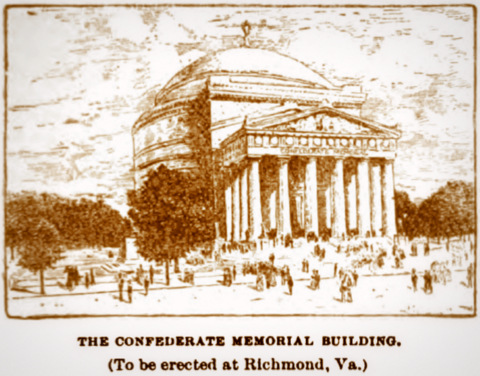
____
Relics of the Louisville Reunion:
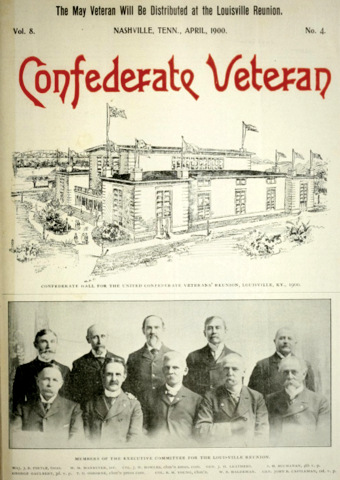
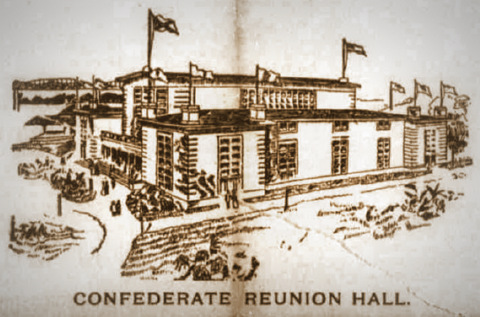
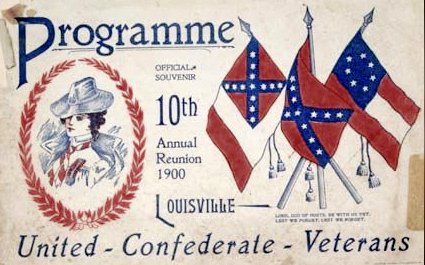
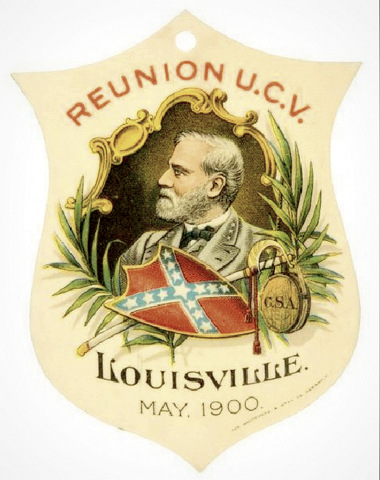
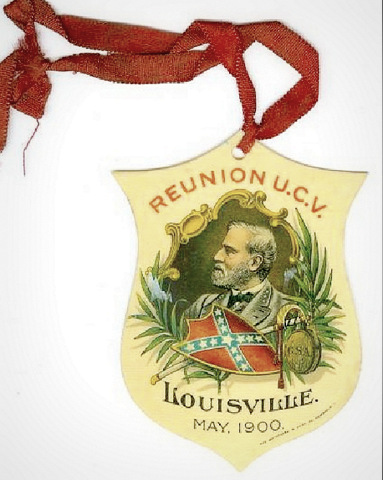
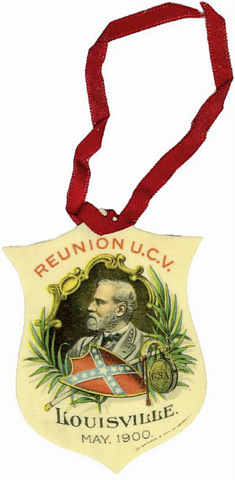
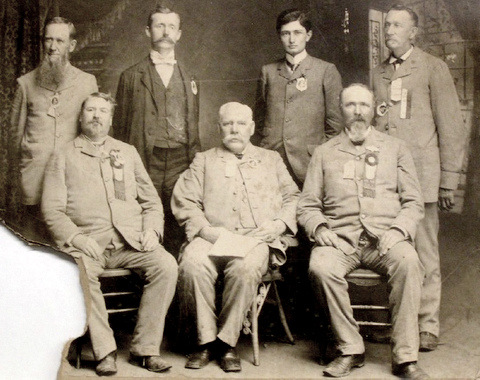
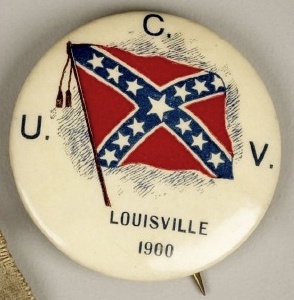
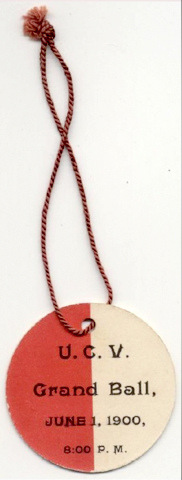
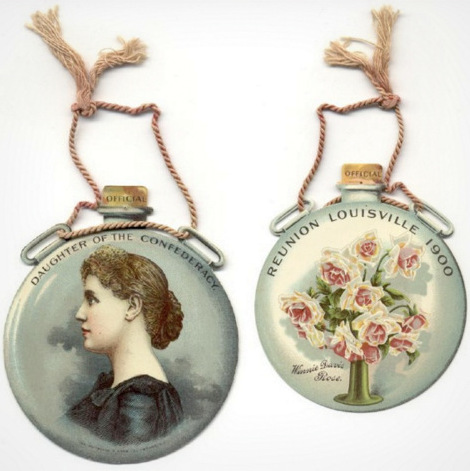
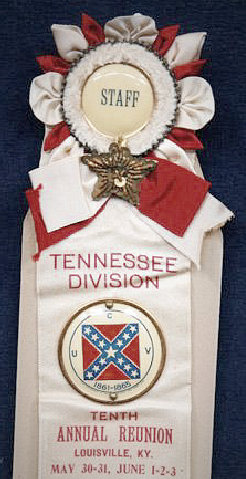

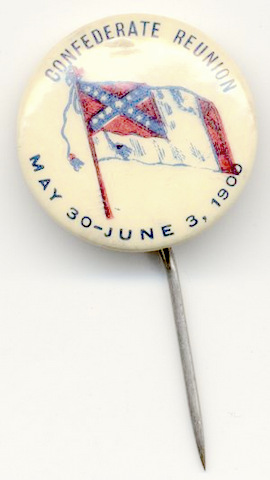
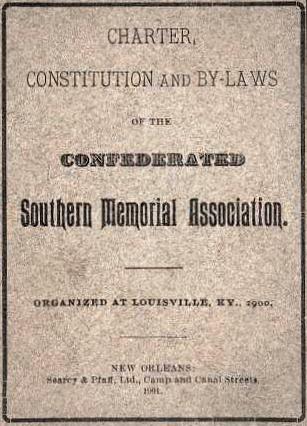
_____
"The
people about it, belonging largely to the class whom Mr.
Lincoln used to call 'the plain people,' have the stuff
in them which, when called forth, has made the Anglo-Saxon
race and given it its history. They have the good old
English names — Stanley, Halloway, Askew, Lowry,
West, etc. — and are pure Anglo-Saxon, with old
English traits; speaking quaint old English. And fine
features, and straight, clean-cut figures are not uncommon,
for they are of good old stock. On the outbreak of war,
they flocked into the army and made excellent soldiers,
and many a small household to-day counts its sons who
died on the battlefield, or in the hospital."
-Thomas Nelson Page, THE OLD DOMINION:
Her Making and Her Manners, 1908
---
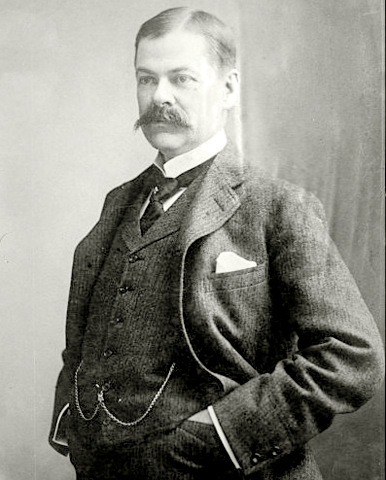
Thomas Nelson Page
_____
"Abide with Me"
Henry F. Lyte, 1793-1847
Music: W.H. Monk, 1823-1889
Key: Eb
Tune: EVENTIDE, Meter: Meter: 10.10.10.10
1. Abide with me; fast falls the eventide;
the darkness deepens; Lord, with me abide.
When other helpers fail and comforts flee,
Help of the helpless, O abide with me.
2. Swift to its close ebbs out life's little day;
earth's joys grow dim; its glories pass away;
change and decay in all around I see;
O thou who changest not, abide with me.
3. I need thy presence every passing hour.
What but thy grace can foil the tempter's power?
Who, like thyself, my guide and stay can be?
Through cloud and sunshine, Lord, abide with me.
4. I fear no foe, with thee at hand to bless;
ills have no weight, and tears not bitterness.
Where is death's sting? Where, grave, thy victory?
I triumph still, if thou abide with me.
5. Hold thou thy cross before my closing eyes;
shine through the gloom and point me to the skies.
Heaven's morning breaks, and earth's vain shadows flee;
in life, in death, O Lord, abide with me.
---
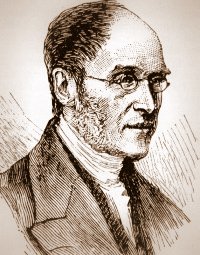
Henry Francis Lyte
|
__________

In the New York Times, October 27, 1913:
Gen. John Cox Underwood, a prominent Confederate veteran, a former
Lieutenant Governor of Kentucky, and an uncle of Congressman Underwood,
died yesterday morning at the Hahnemann Hospital from hardening
of the arteries after an illness of six weeks. He was 73 years
old.
Gen. Underwood by birth and marriage was connected with many of
the best known Southern families. His father was United States
Senator Underwood of Kentucky. Soon after his graduation from
college in 1861, Gen. Underwood enlisted in the Confederate Army,
and before the civil war was over he had attained the rank of
Lieutenant Colonel. We was severely wounded in the fighting in
Tennessee, and for the last year of the war he was a captive in
the Federal prisons at Louisville, Cincinnati, and Fort Warren,
Mass. Several years after the war he was made Major General of
the United Confederate Veterans.
Miss Drue A. Duncan of Bowling Green, Ky., became Gen. Underwood's
wife in 1867, and the two lived in Bowling Green for many years,
during which time Gen. Underwood became Mayor of Bowling Green
in 1870 and Lieutenant Governor of Kentucky in 1875. Practicing
his profession of a civil engineer and architect he became wealthy,
and spent a great part of his fortune in erecting monuments to
the Confederate dead. His most notable achievement in this work
was the erection in Chicago in 1891 of a monument over the 6,000
Southern soldiers who were buried there during the war.
Gen. Underwood came to New York for treatment and to be with his
only children, Miss Helen Underwood of 934 West End Avenue, and
Mrs. J.P. Grant of Montclair, N.J. The daughters left yesterday
afternoon with the body, which will be buried in Bowling Green
by the grave of the General's wife.
_____
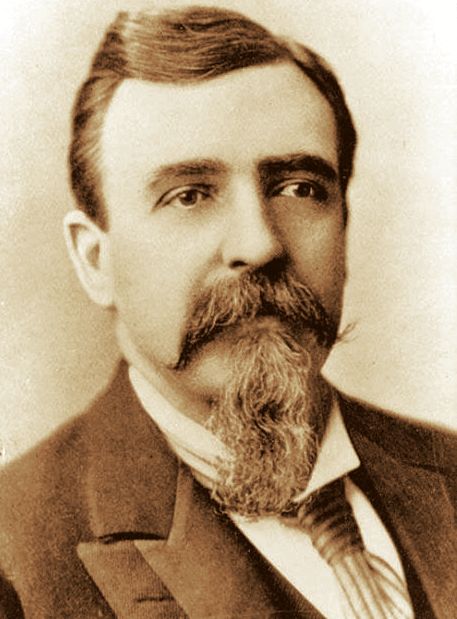
_____
Fairview Cemetery, Bowling Green:
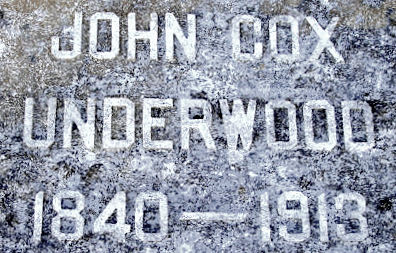 |
|
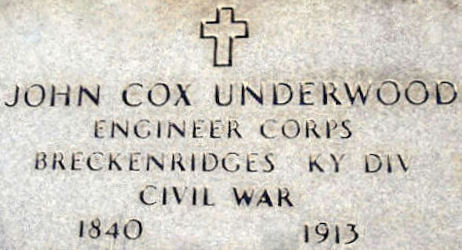
|
_____
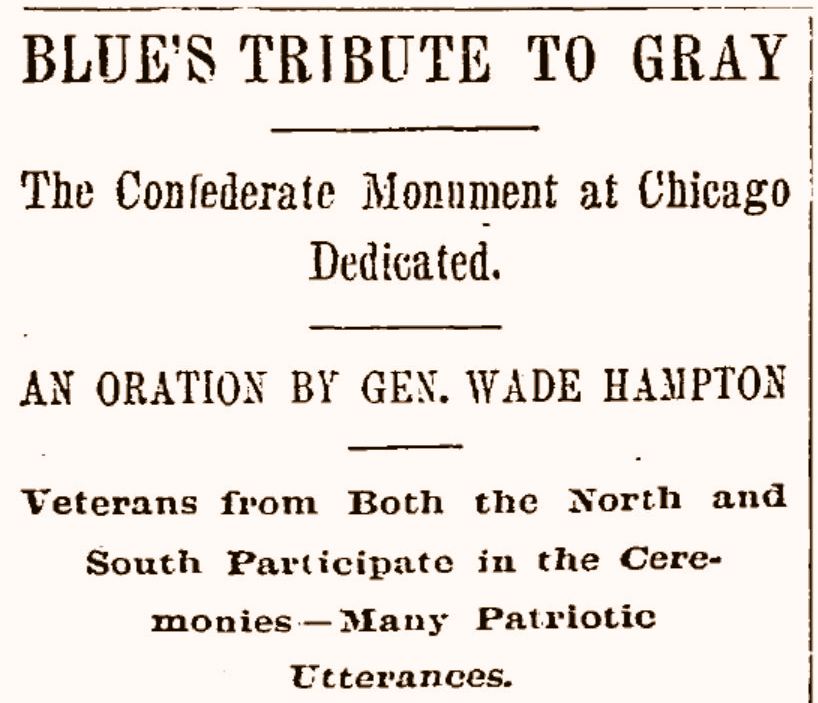
_____
Confederate Monument Erected by John Cox Underwood,
Confederate Mound at Oak Woods Cemetery, Chicago:

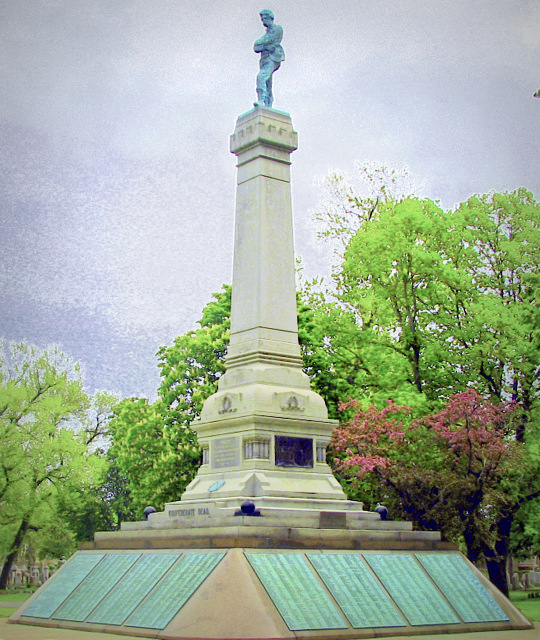
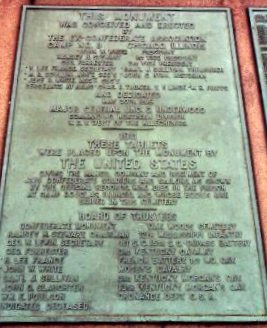
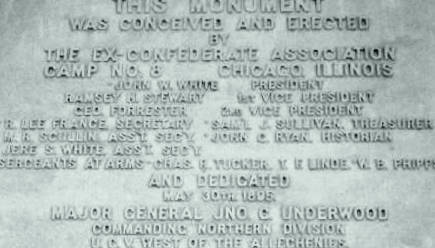
This Monument
Was Conceived and Erected
by
The Ex-Confederate Association
Camp No. 8, Chicago, Illinois.
John W. White- President
Ramsey H. Stewart- 1st Vice President
Geo. Forrester- 2nd Vice President
R. Lee France, Secretary Sam'l J Sullivan, Treasurer
M.R Schulin, Ass't. Sec'y. John C. Ryan, Historian
Jere S. White, Asst. Sec'y
Sargeants at Arms, Chas. R. Tucker, T.F LInde, W.B. Phipps
And Dedicated
May 30th 1895.
Major General Jno. C. Underwood
Commanding Northern Division
U.C.V. West of the Alleghenies.
_____
From http://www.nps.gov/history/nr/travel/national_cemeteries/Illinois/Confederate_Mound_Oak_Woods_Cemetery.html;
viewed 3/24/2014:
Confederate Mound at Oak Woods Cemetery
Chicago, Illinois
Near the southwest corner of Oak Woods Cemetery in Chicago’s
Hyde Park neighborhood stands a 30-foot granite monument dedicated
to the thousands of Confederate soldiers who died as prisoners
of war at Camp Douglas. The monument marks a mass grave containing
the remains of more than 4,000 Confederate prisoners, reinterred
here from the grounds of the prison camp and the old Chicago
City Cemetery.
Camp Douglas, located on land owned by politician Stephen A.
Douglas— Abraham Lincoln’s opponent in the 1860
presidential election— originally served as a Union recruitment
and training center. However, after the Union victory at Fort
Donelson, Tennessee in December 1862, the camp became a major
detention facility for Confederate prisoners of war. It had
a maximum capacity of 10,000 prisoners, and over the course
of the war, more than 26,000 Confederate prisoners passed through
its gates. Disease, particularly smallpox, and exposure to the
elements claimed the lives of more than 4,000 prisoners. The
camp established two small cemeteries on its grounds, but most
of the casualties were buried in Chicago’s old City Cemetery
along the shores of Lake Michigan, in what is now Lincoln Park.
The lease for Camp Douglas required the removal of the entire
camp, including the cemeteries, at the end of the Civil War.
In 1866, Chicago closed the old City Cemetery due to its constant
flooding, forcing the Federal Government to find a permanent
burial ground for the remains of the Confederate prisoners.
A lot within the Oak Woods Cemetery was selected, and approximately
4,200 remains were reinterred here between 1865 to 1867. Landscape
architect Adolph Strauch designed the cemetery, envisioning
it as a park-like setting, rather than a naturalistic garden,
using curving pathways and slightly elevated burial plots. Many
notable local residents, including several mayors, governors,
and congressmen are buried throughout Oak Woods Cemetery.
Confederate Mound is an elliptical plot, approximately 475 feet
by 275 feet, located between Divisions 1 and 2 of Section K.
The most prominent feature of the plot is the Confederate Monument,
a 30-foot granite column topped with a bronze statue of a Confederate
soldier, a figure based on the painting “Appomattox”
by John A. Elder. At the base of the tapered square shaft are
three bas-relief images: “The Call to Arms” showing
a group rallying for the cause, “A Soldier’s Death
Dream” depicting a fallen soldier and his horse on the
battlefield, and “A Veteran’s Return Home”
showing a soldier arriving at a ruined cabin. General John C.
Underwood, a regional head of the United Confederate Veterans,
designed the monument and was at its dedication on May 30, 1895,
along with President Grover Cleveland and an estimated 100,000
on-lookers. In 1911, the Commission for Marking the Graves of
Confederate Dead paid to have the monument lifted up and set
upon a base of red granite; affixed to the four sides of the
base were bronze plaques inscribed with the names of Confederate
soldiers known to be buried in the mass grave.
Four cannons surround the monument, forming a square 100 feet
on each side. Between the monument and the northern cannon,
12 marble headstones laid in an arc mark the graves of unknown
Union guards at the Camp Douglas prison camp. Also near the
monument are the plot’s flagpole and a large cannonball
pyramid.
_____
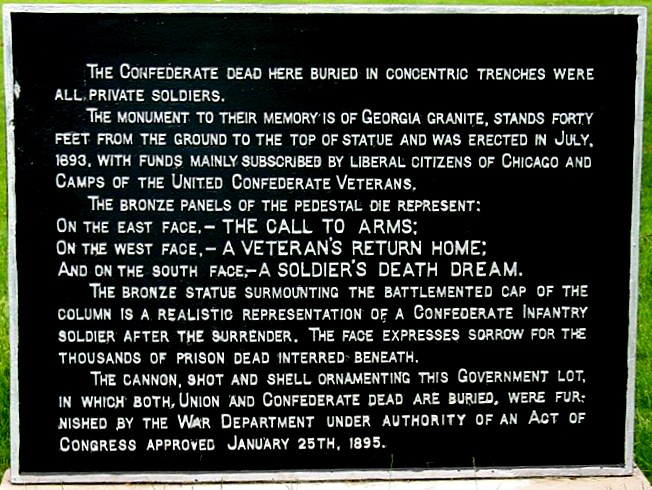
The Confederate Here buried in concentric trenches were all
Private soldiers.
The monument to their memory is of Georgia Granite, stands forty
feet from the ground to the top of statue and was erected in
July, 1893, with funds mainly subscribed by liberal citizens
of Chicago and Camps of the United Confederate Veterans.
The Bronze panels of the pedestal die represent:
On the East Face, - The Call to Arms;
On the West Face, - A Veteran's Return Home;
And on the South Face, - A Soldier's Death Dream.
The bronze statue surmounting the battlemented cap of the column
is a realistic representation of a Confederate infantry solider
after the Surrender. The face expresses sorrow for the thousands
of prison dead interred beneath.
The cannon, shot and shell ornamenting this Government lot,
in which both Union and Confederate Dead are buried, were furnished
by the War Department under authority of an Act of Congress
approved January 25th, 1895.
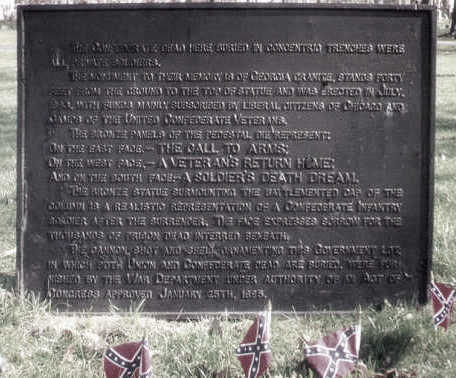
_____
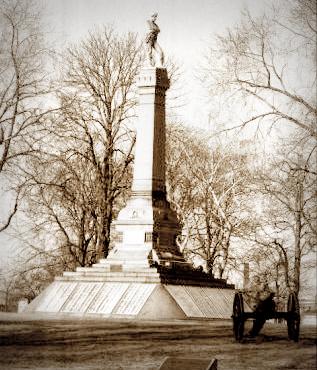
___________
"Bishop's Portrait
Once on Barroom Wall Now Here," author unattributed, The
Sewanee Purple, May 11, 1927:
It is the "face on the bar-room wall"
this time, and after considerable juggling by the knees of Chance,
it now adorns the walls of St. Luke's Common Room. The likeness
is that of Bishop Leonidas Polk, crusader in the Episcopal Church,
general in the army of the Confederate States and one of the
founders* of the University of the South.
Immediately after the Civil War* the curator of the [Corcoran]
Galleries was commissioned to paint portraits of the Confederate
generals for the Battle Abbey, Richmond. Bishop Polk was one
of the few who had lived to have the work completed.* The finished
portrait was purchased by a syndicate of Southern men, and after
the death of the last of these, it reverted to his estate and
was sold at auction.
At Covington, Kentucky, an old bar-room with the finer sensibilities
of pre-Volstead days snapped it up as a mural decoration. Amidst
bubbling steins and a cascade of pretzels, ham, and eggs, the
likeness of the great man of the Confederacy looked sternly
down on the humanity reeling by below. When the national drink
became soda-pop, the portrait still withstood the barrage of
flying bottle caps and continued to adorn the land of fast horses,
beautiful women, and what used to be good whiskey. There a representative
of the University found it and bought it for a song. Or maybe
it was two songs. It now lends atmosphere and inspiration to
the theological students of the University as they plod over
their tomes, or whatever it is that theological students plod
over, if anything.
The picture in itself is interesting. It portrays the
noble figure of Sewanee's founder in the vestments of a
bishop of the Church. It was the last time that Bishop Polk
wore the tokens of his episcopal authority. On a chair nearby
lies the uniform of a general of the Confederate States Army.
The calm dignity, the tremendous power, the broad vision of
the man is well expressed on canvas. Noncommercialized on the
basis of its intrinsic value, the picture has become one more
addition to the possessions of the University which bear on
Southern history.
(*Errors- Polk
was the leading founder; killed in 1864, but the portrait
was painted in 1900. Other records indicate it was purchased
not from a saloon, but from a storage warehouse.)
_____
|
THE
BISHOP
|
|
|
First
Elected Prelate,
Episcopal Diocese of
Louisiana
1841-1864 |
Constitutional
Chancellor,
The University of the South at Sewanee
1863-1864 |
Lieutenant-General,
Confederate Army of Tennessee
1862-1864 |
OF
RELIGION
By
the Reverence of our Souls we are led to
Worship in our Christian Piety.
|
OF
EDIFICATION
By
the Knowledge of our Minds we are led
to Create for our Christian Culture.
|
OF
WARFARE
By
the Courage of our Hearts we are led to
Protect by our Christian Defense.
|
|
|
_____
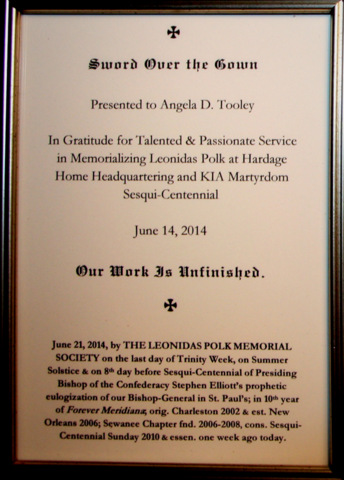
June 28, 2014:
Pine Mountain
---
Award:
"Our paladin comunity finds its own way to the intimate
light.
Standing at the imprint of our fallen chieftan,
we
welcome the arising within us of reasserted fundamental instinct:
Respecting the Dignity of Integrity."
-SIR ABDIEL,
"Solstice," The Resurgametica
-
___________
As
a non-profit educational fair use web site, images and citations
reproduced herein from other sources are intended solely
for scholarship, research, and community interest. (See
TITLE 17, CHAPTER 1, §107: Limitations on exclusive
rights: Fair use.)
Advertisements and click-through purchases support a small
portion of our increasing technology and maintenance expenses.
Thank you for helping us onward toward even more improvements
and greater offerings.
©2003-2014 The Leonidas Polk
Memorial Society (as successor); All Rights Reserved.
Contact:
info@leonidaspolk.org
-
|